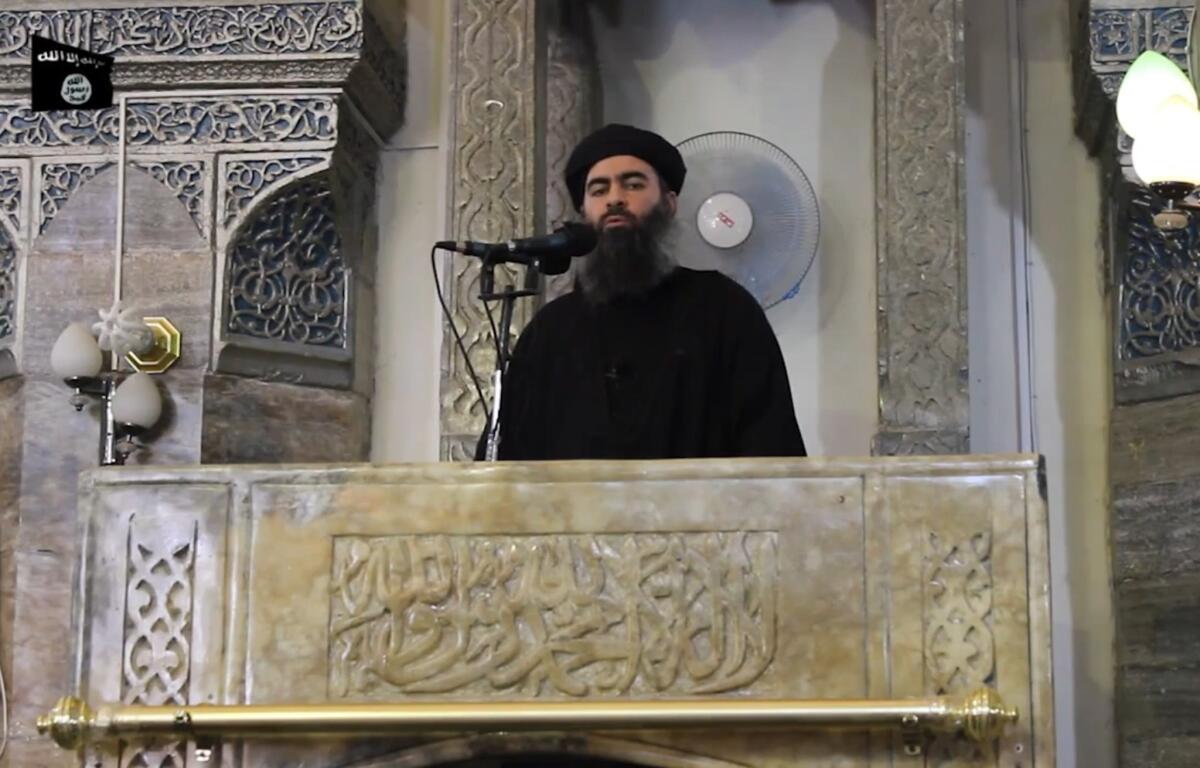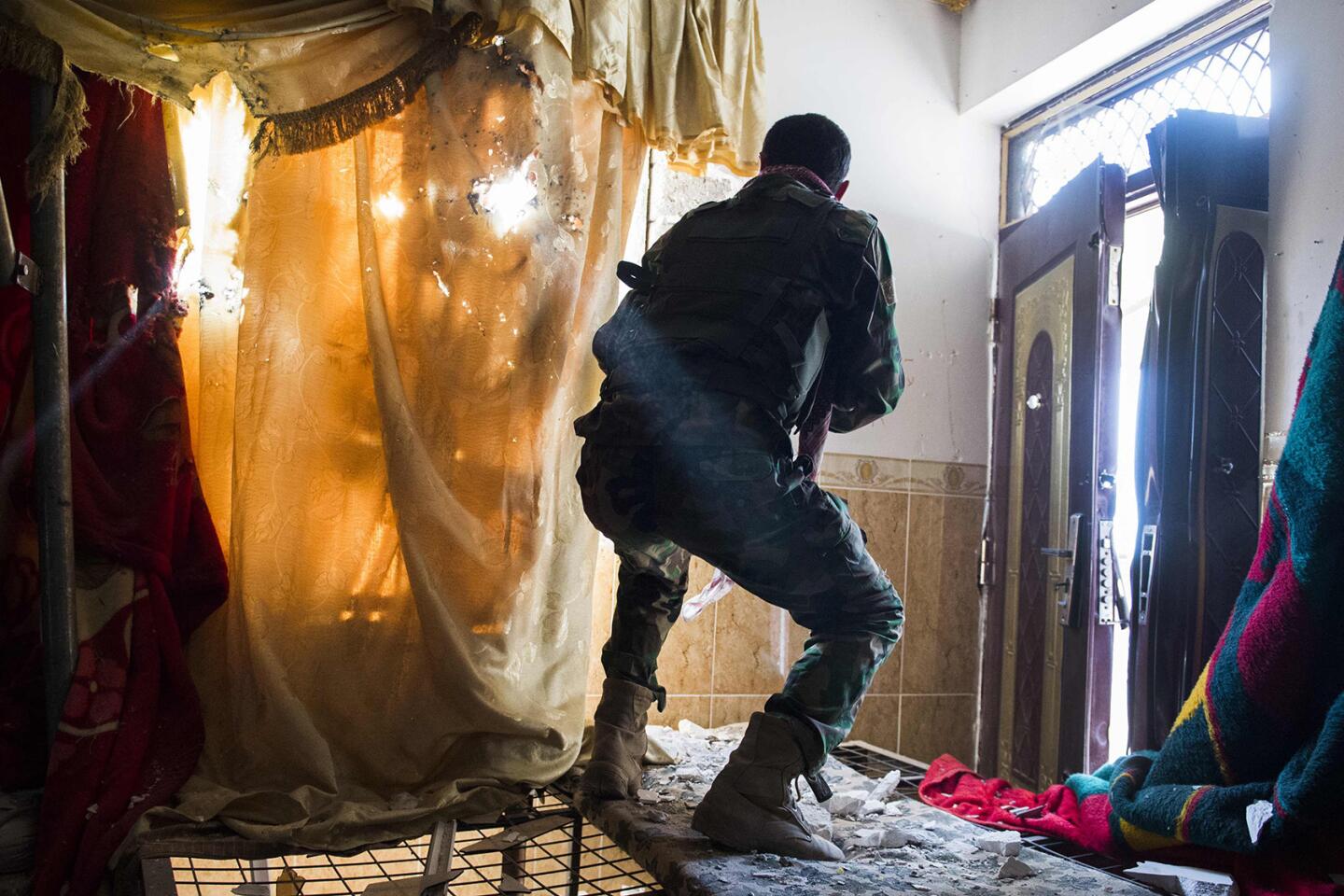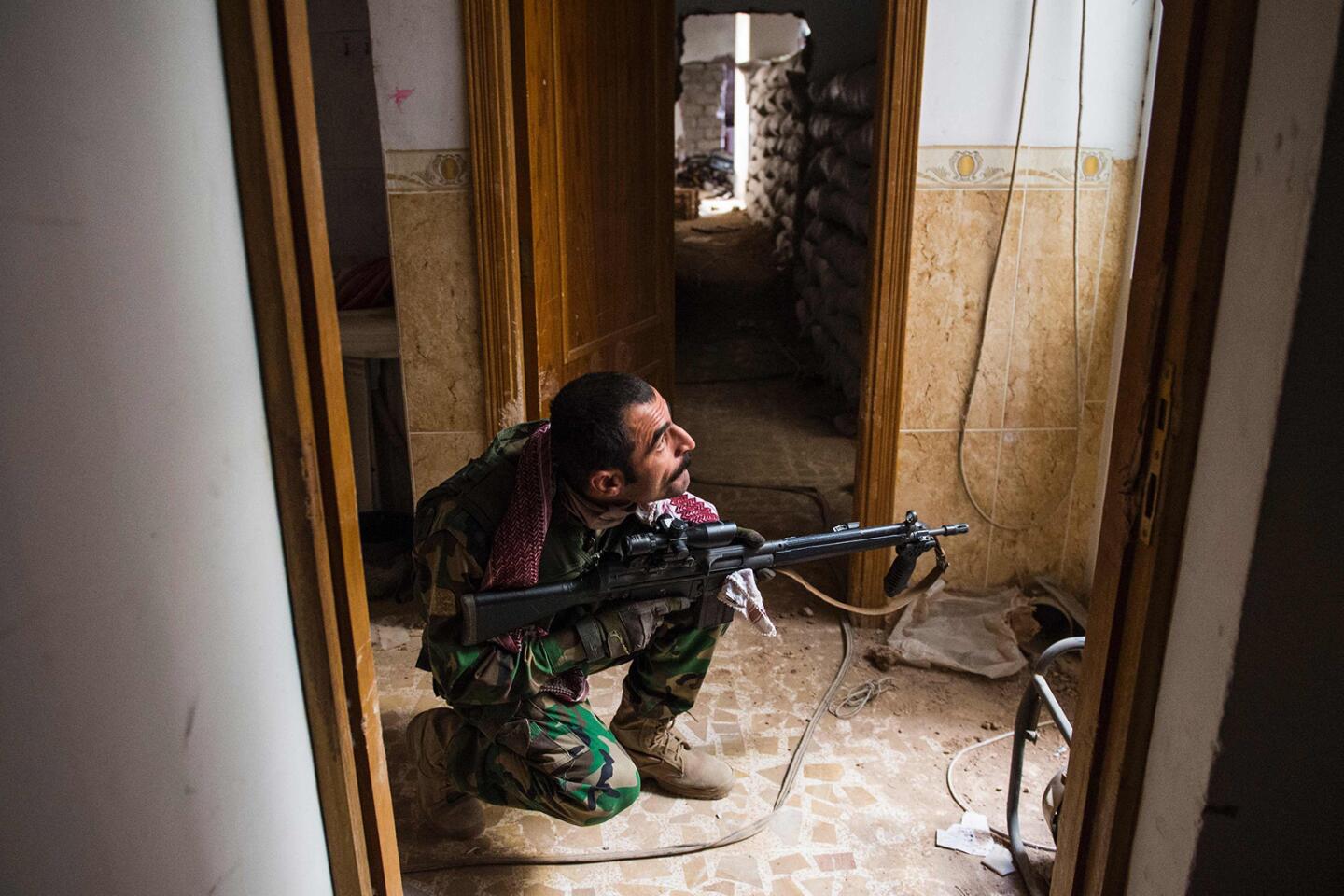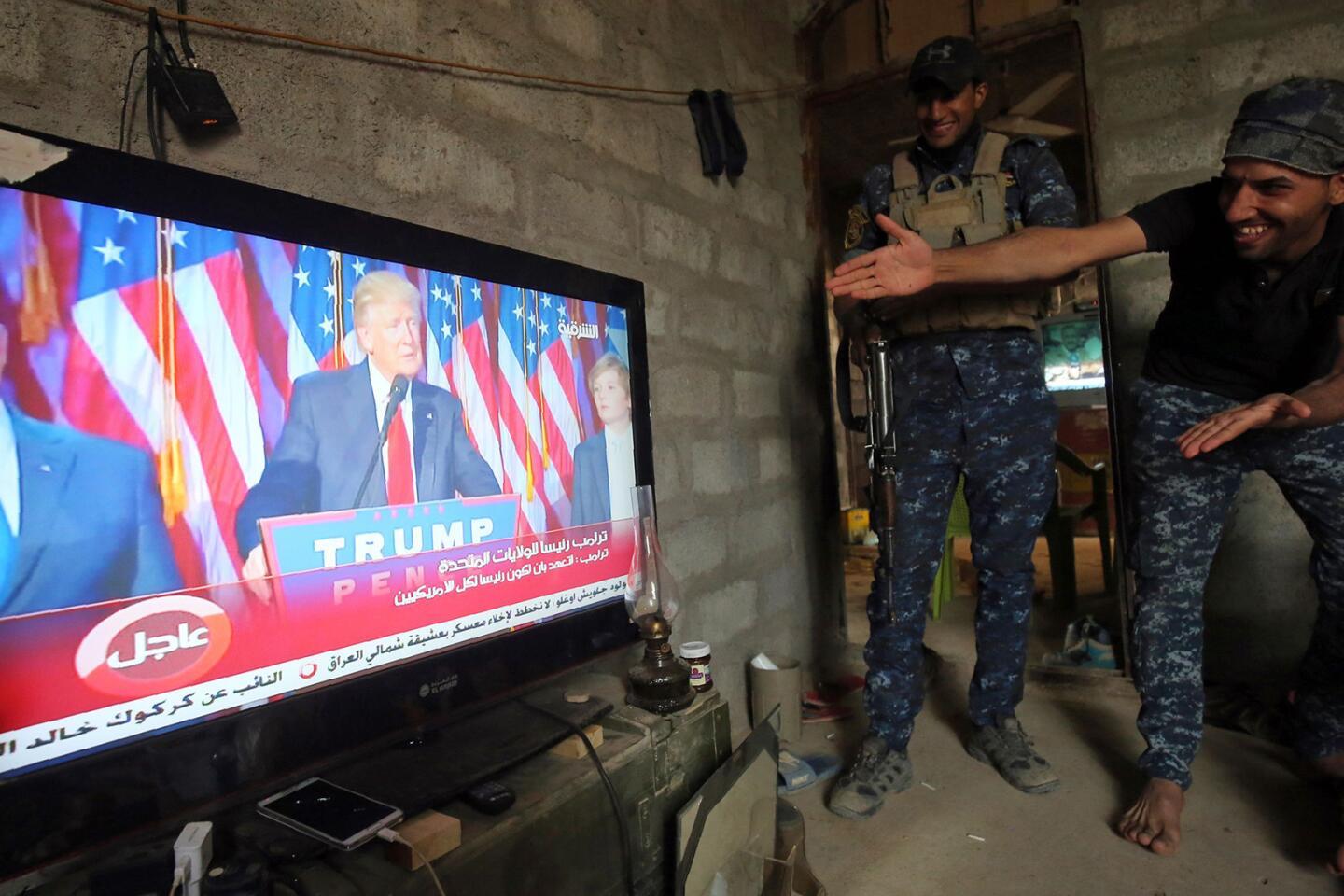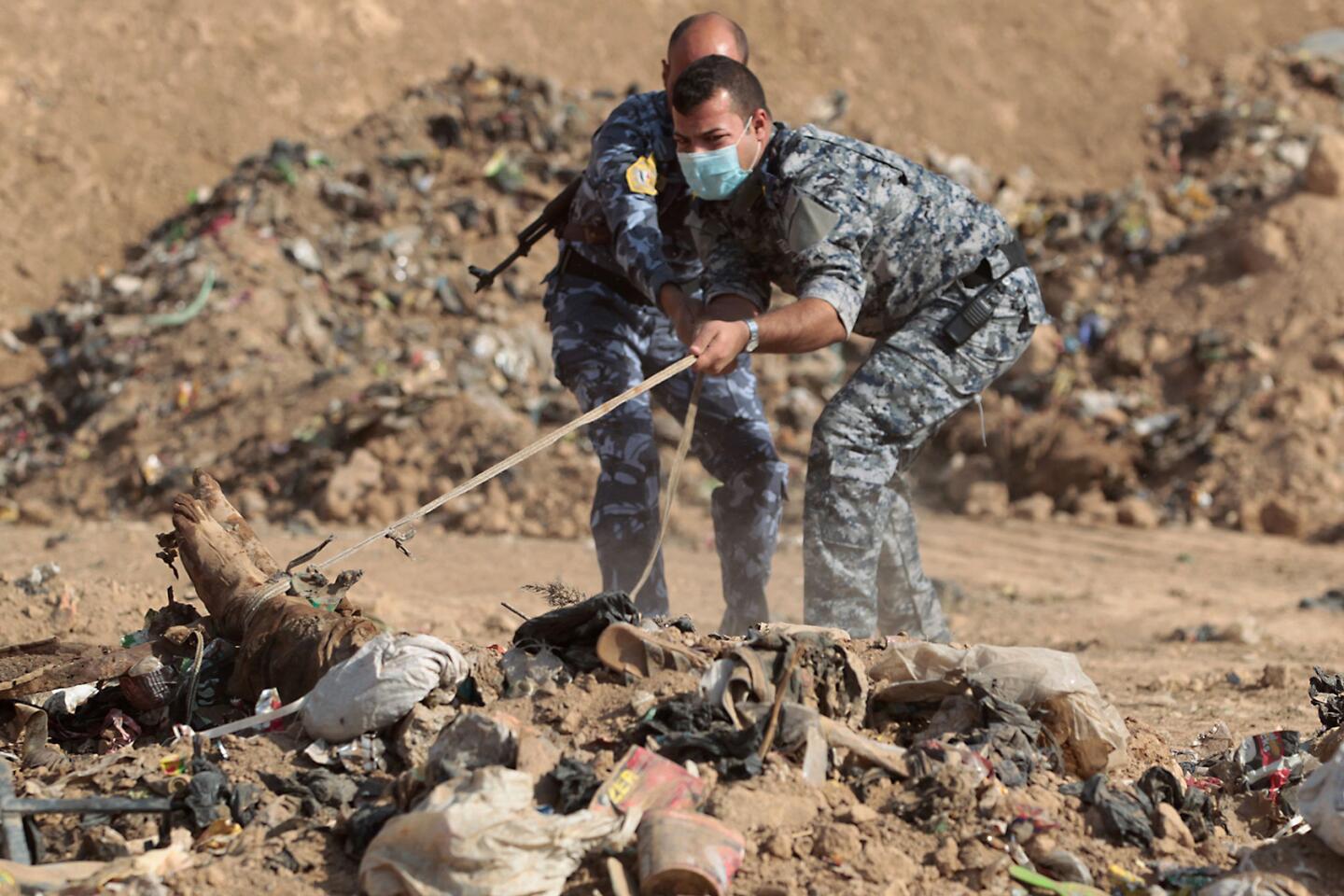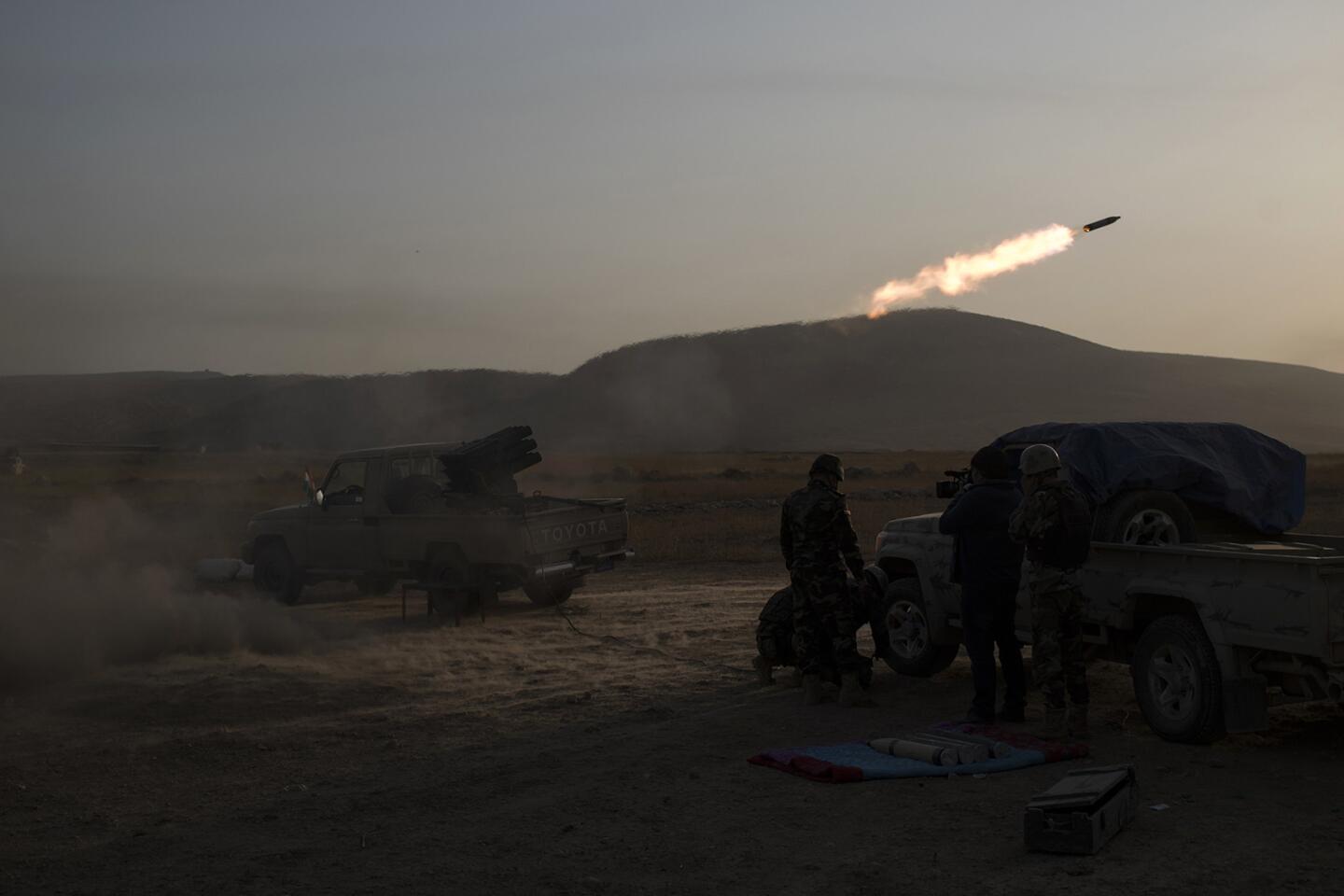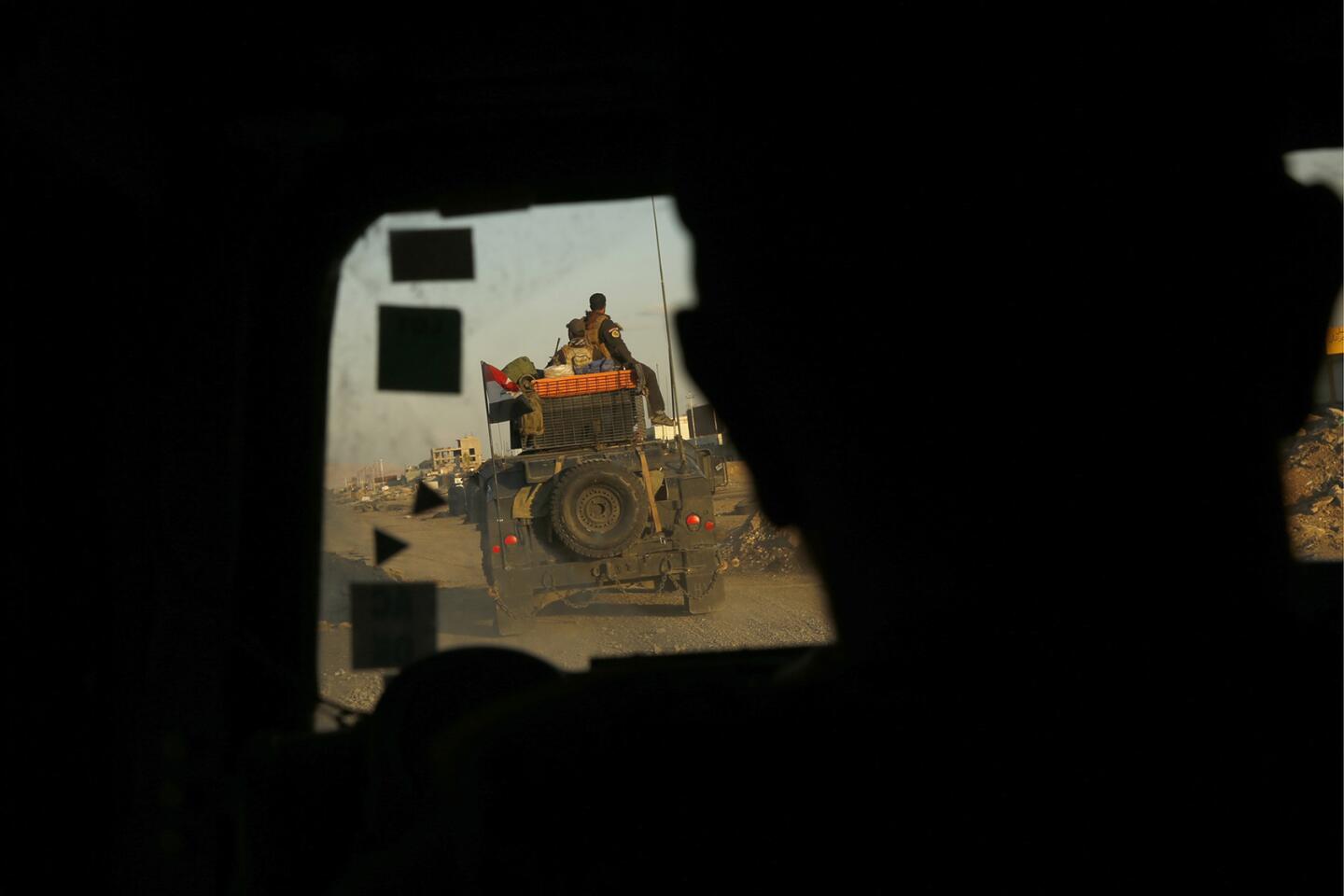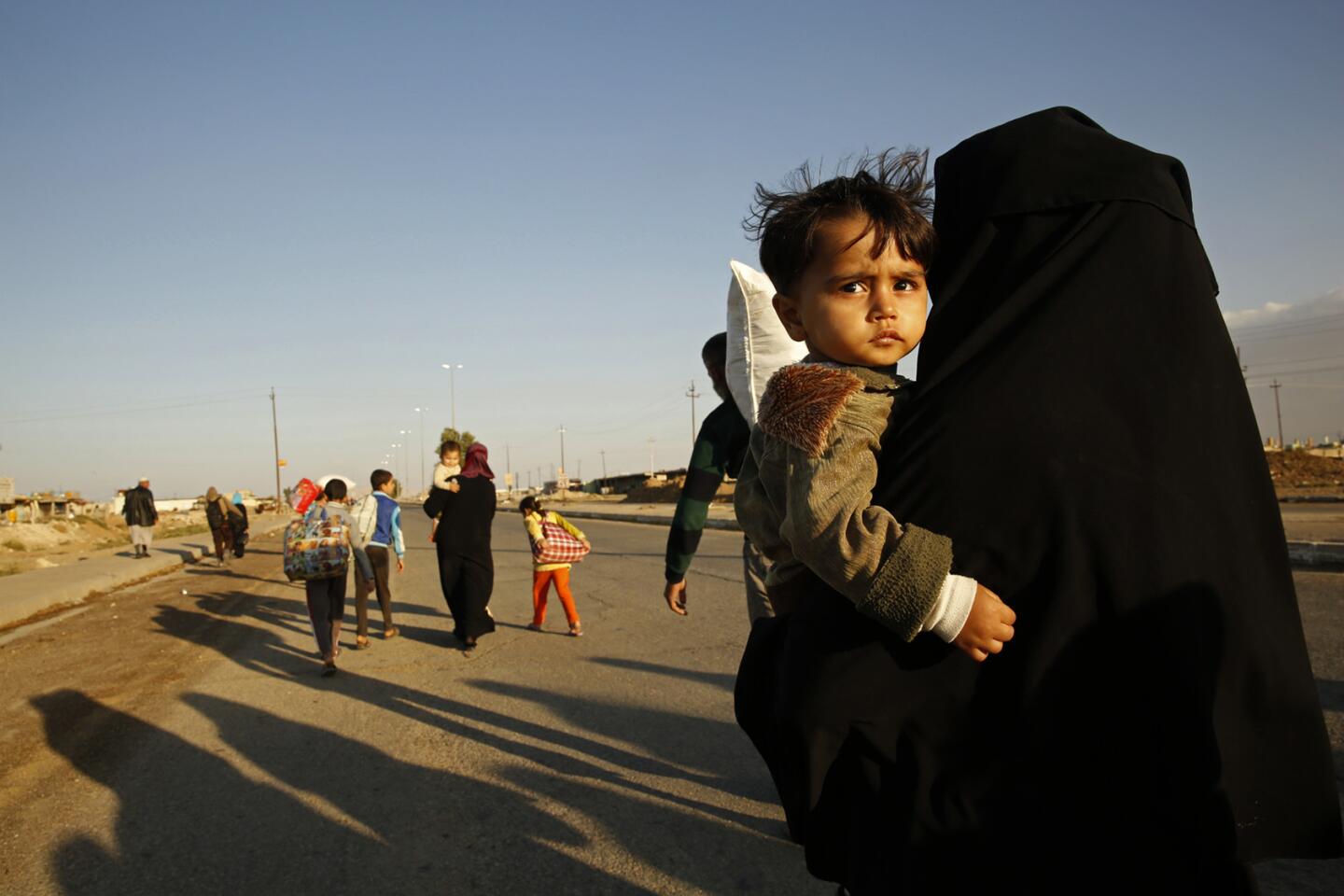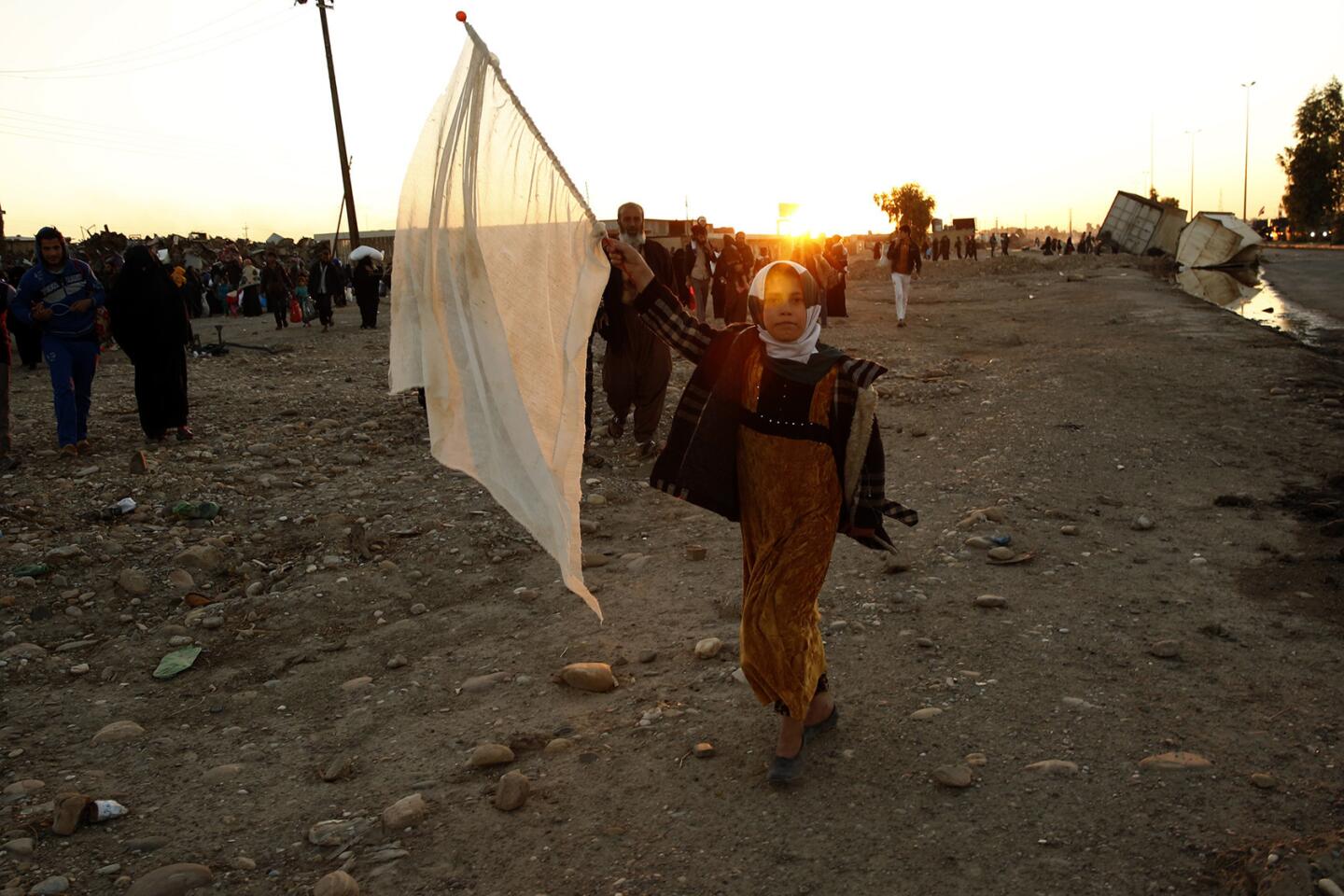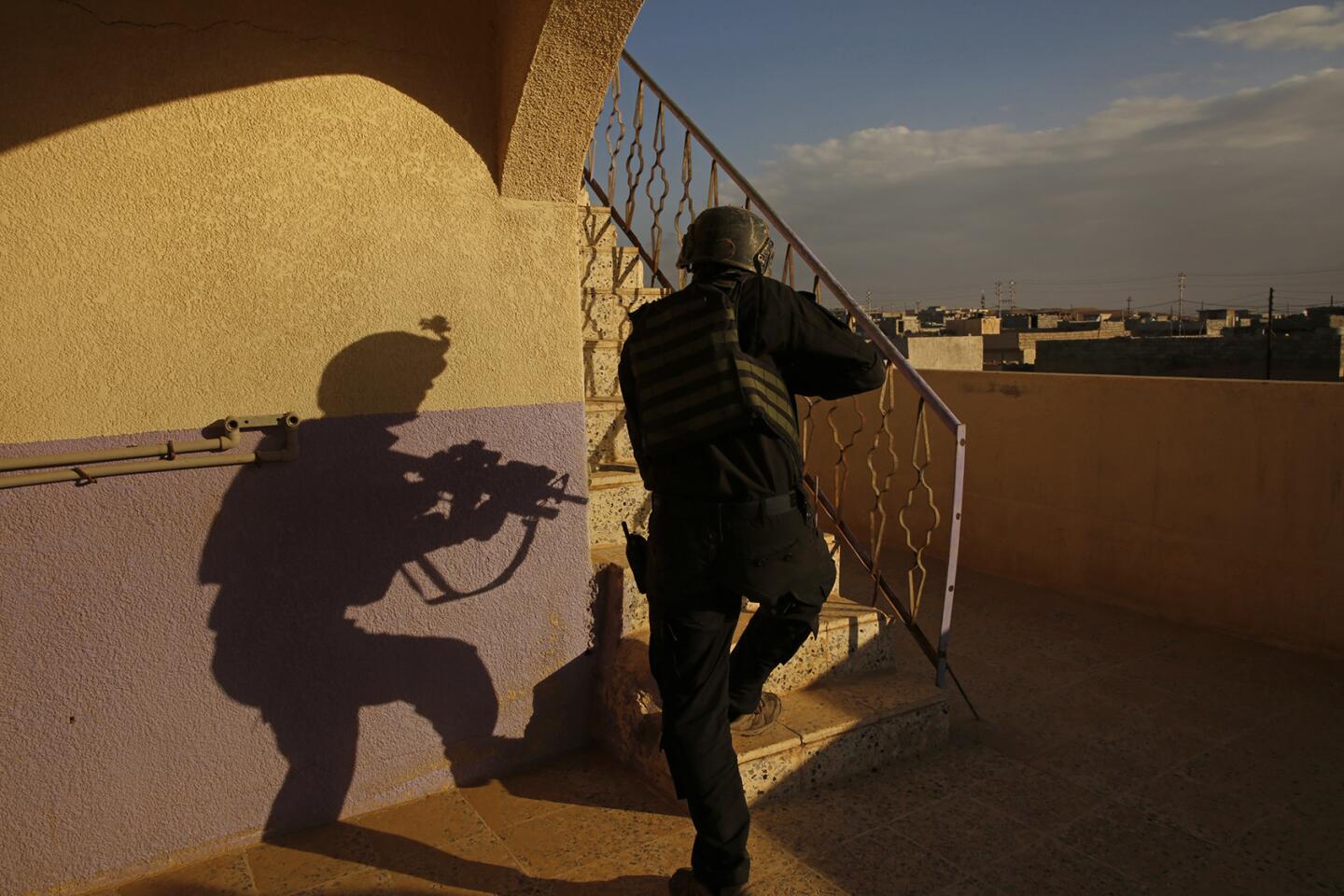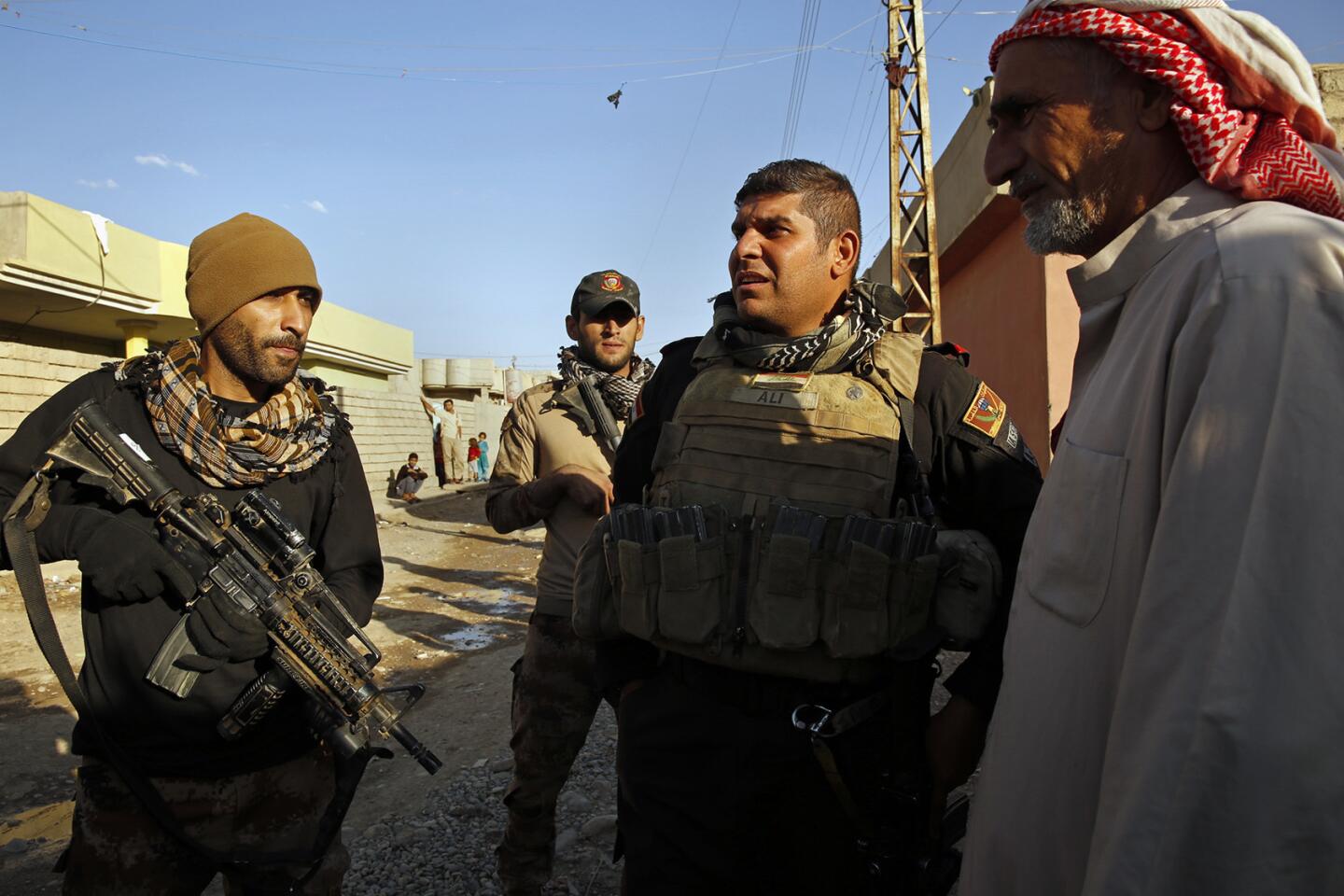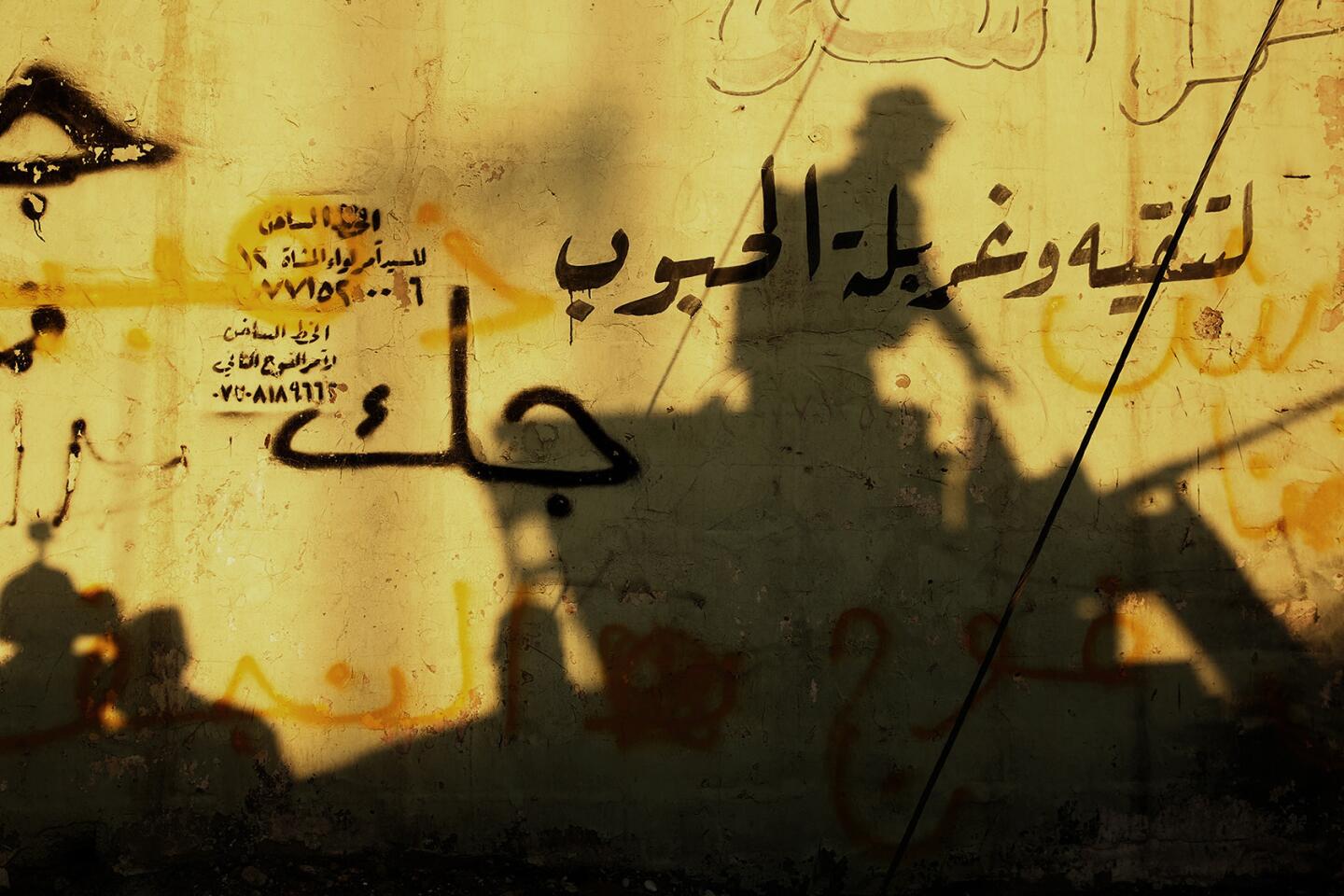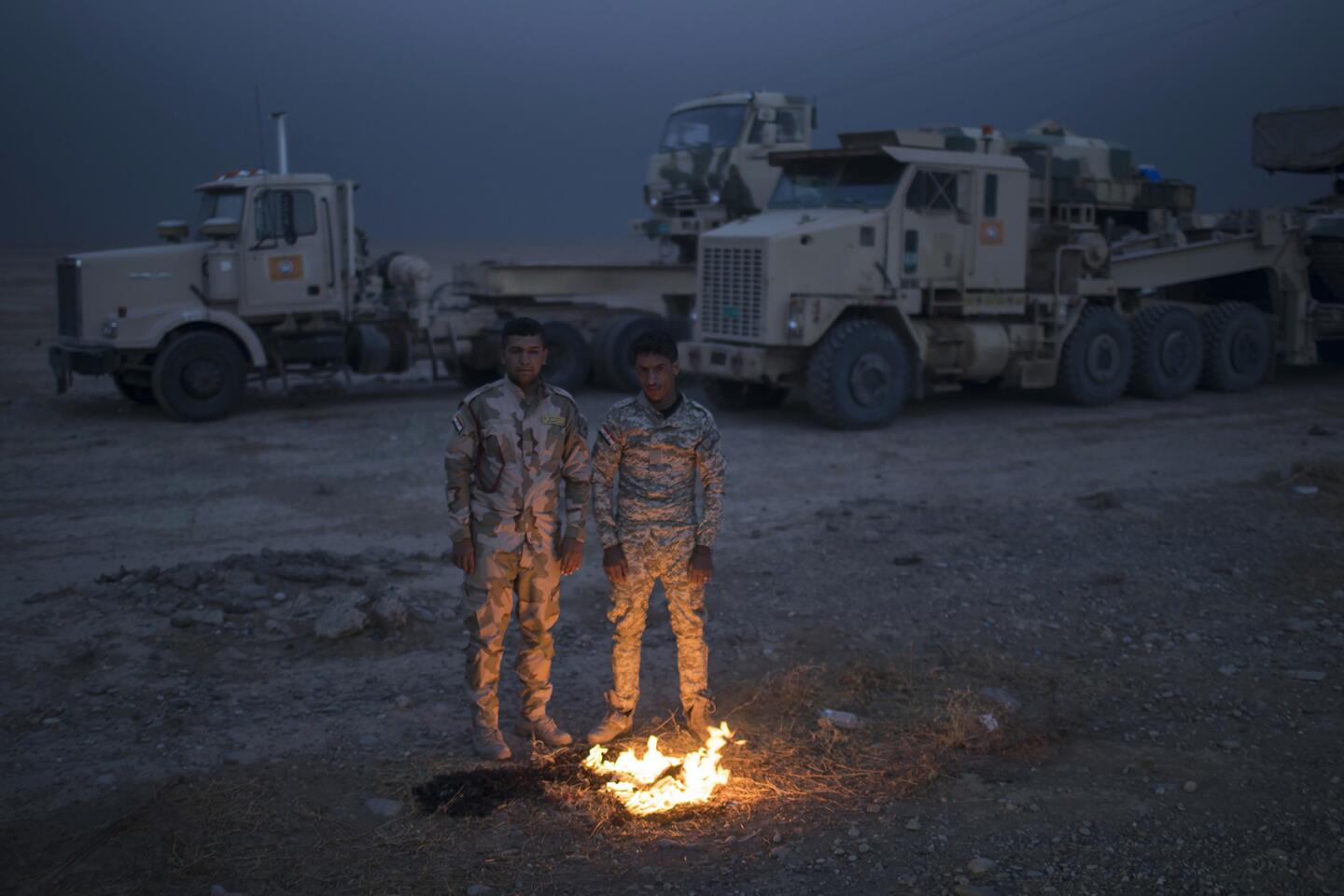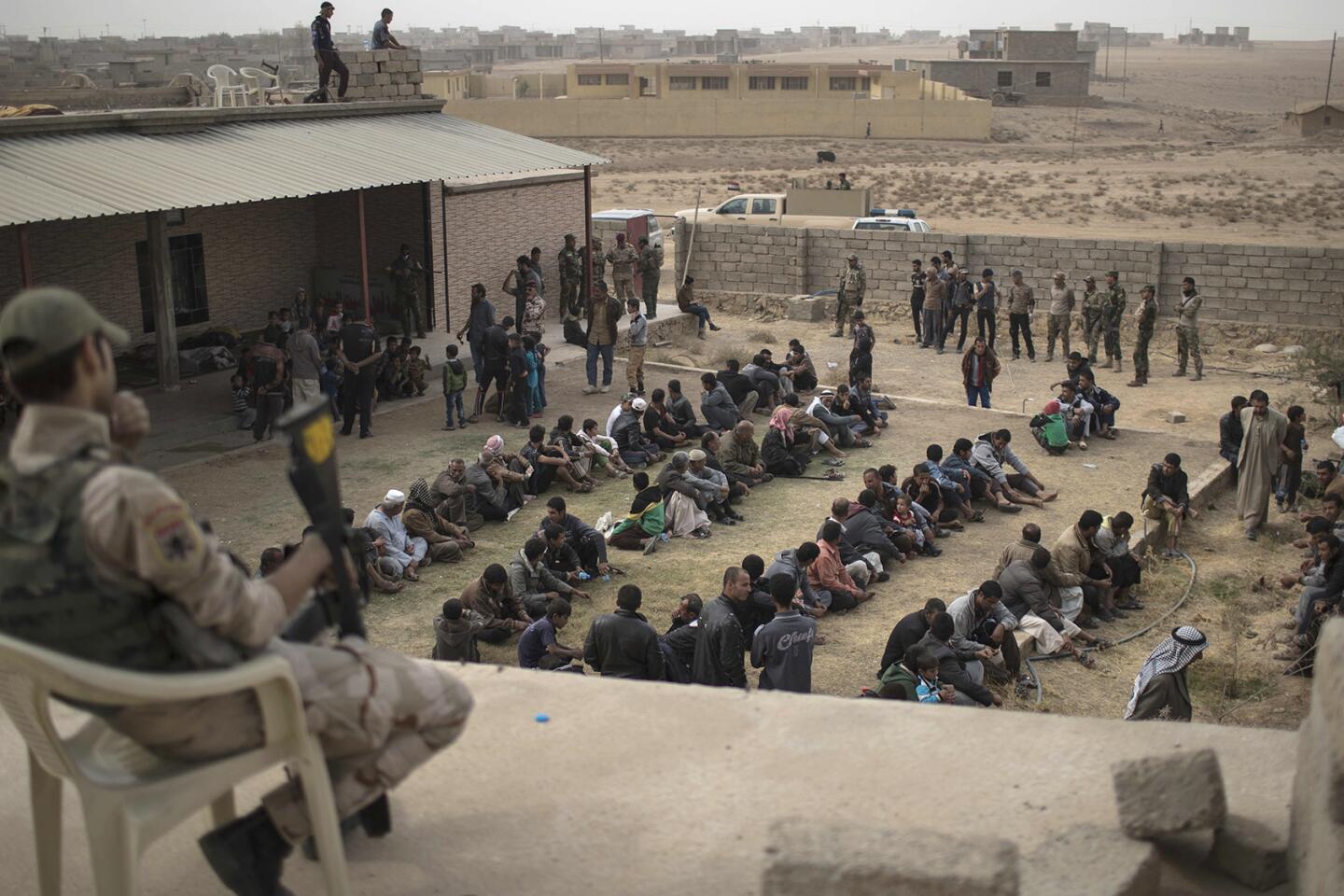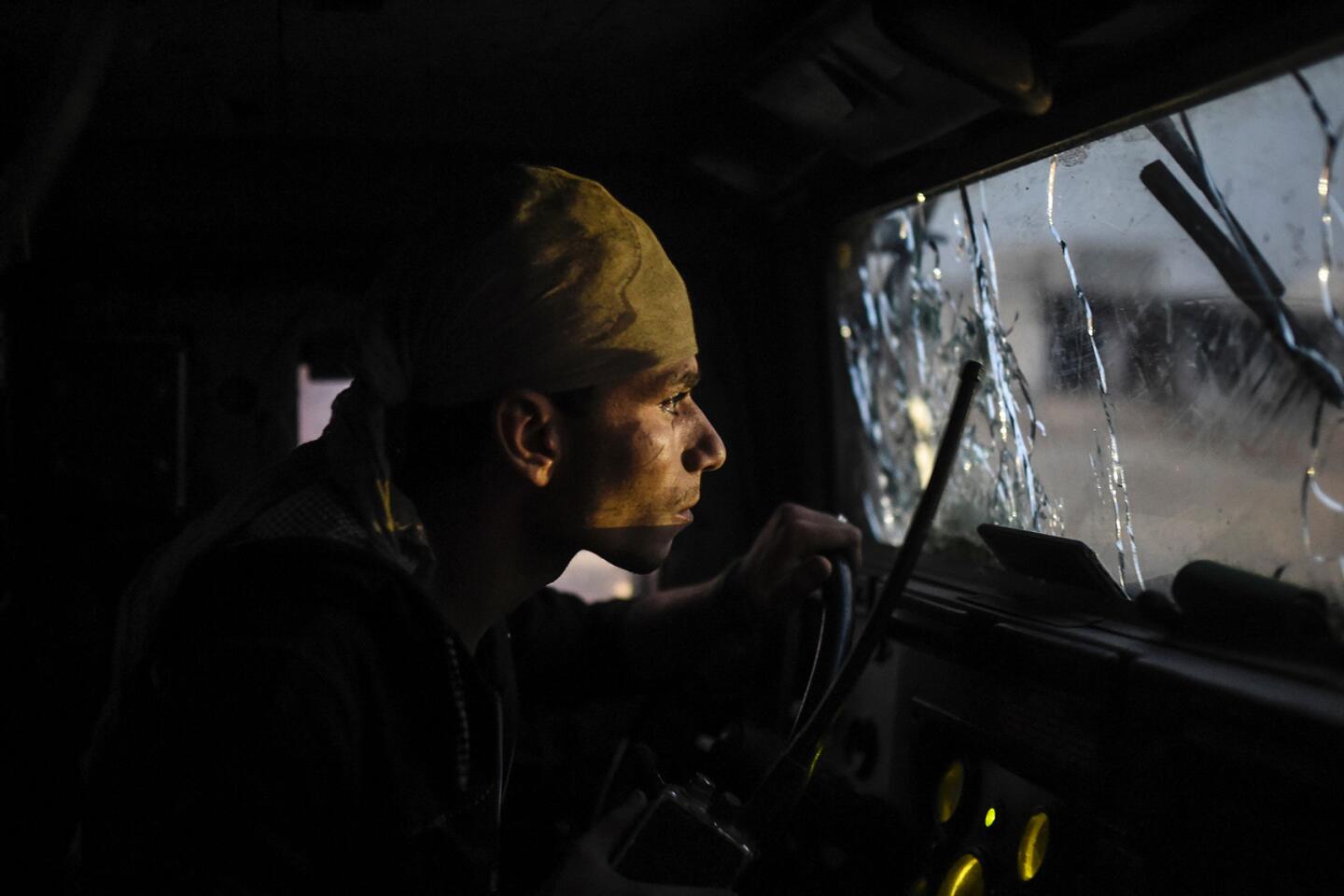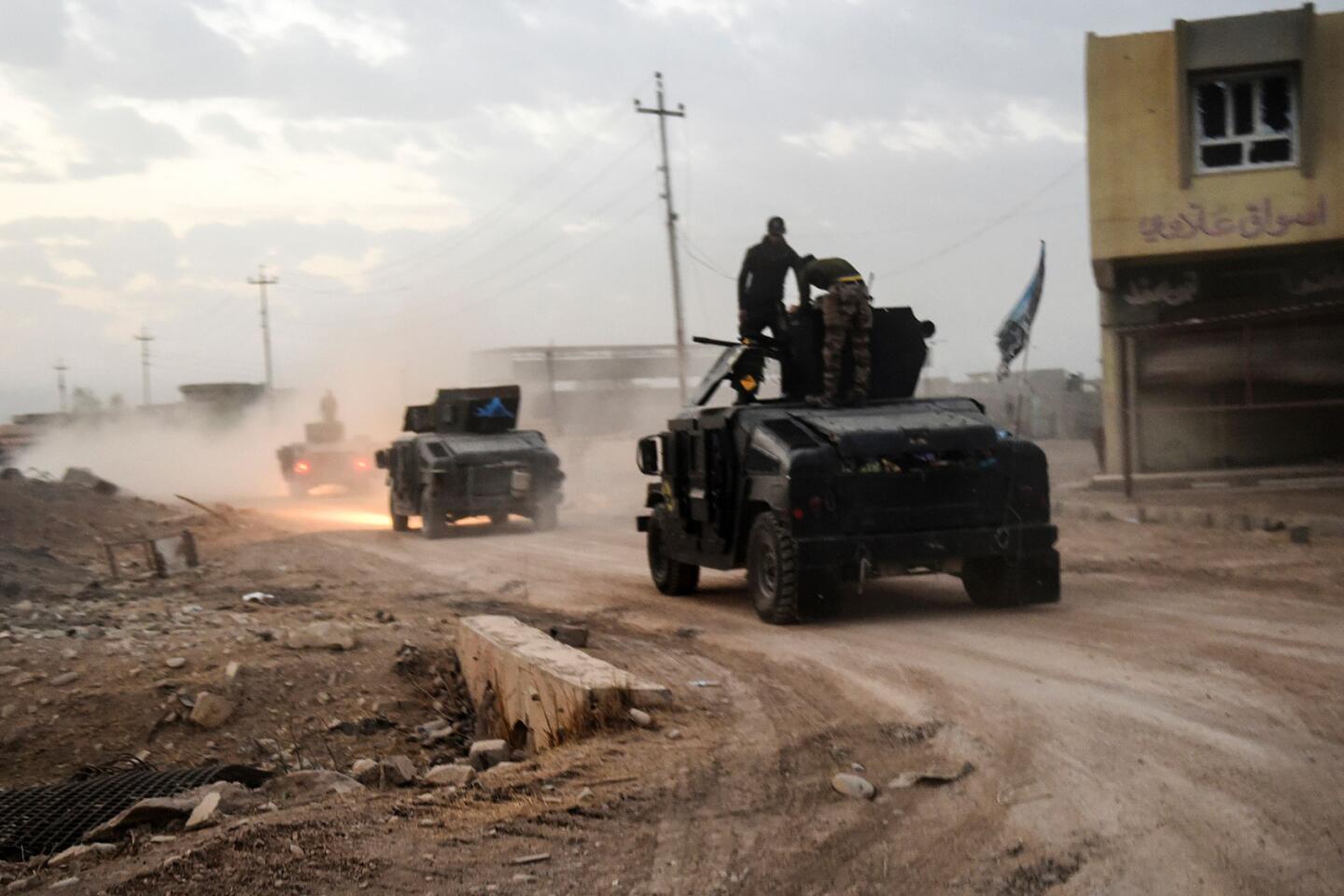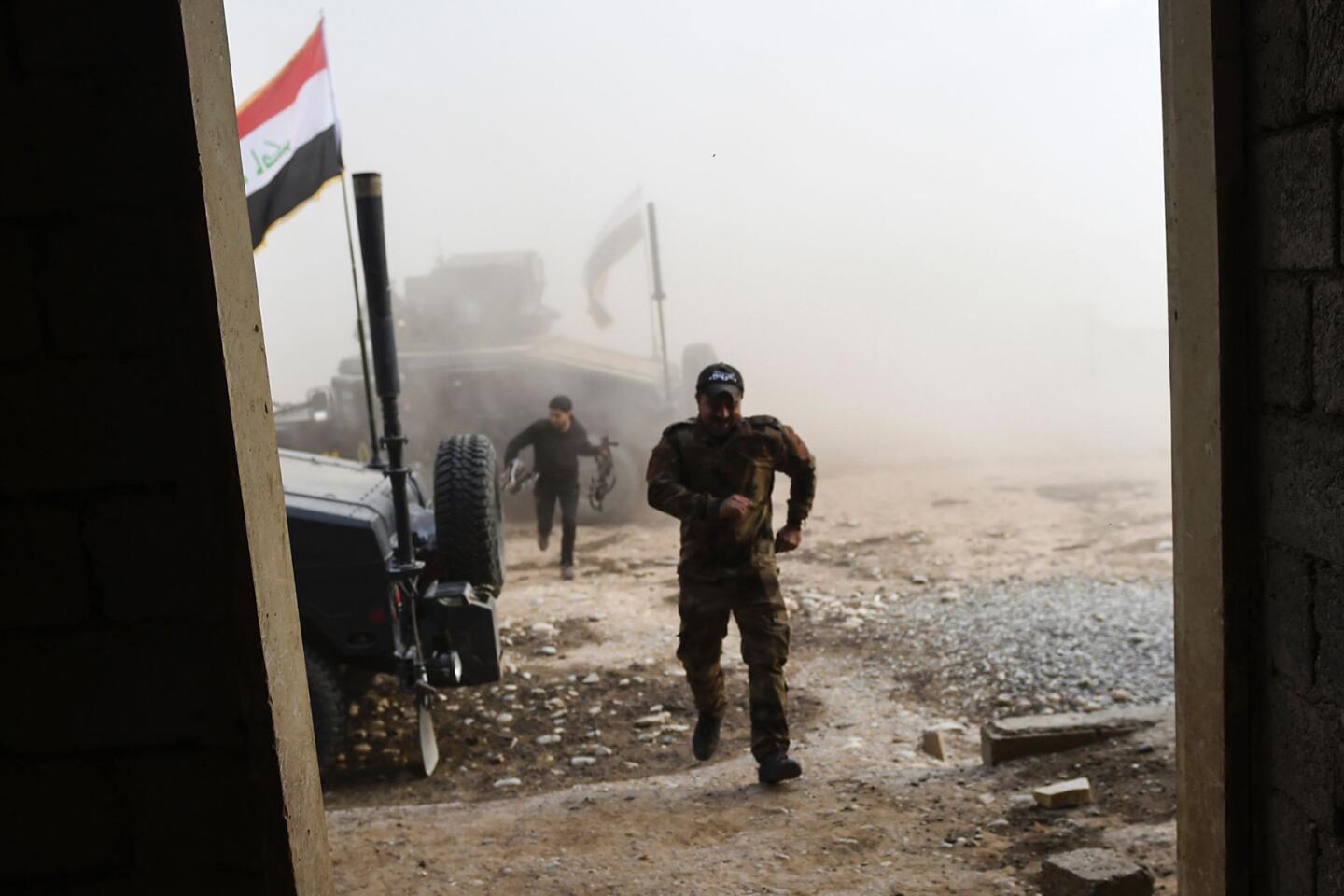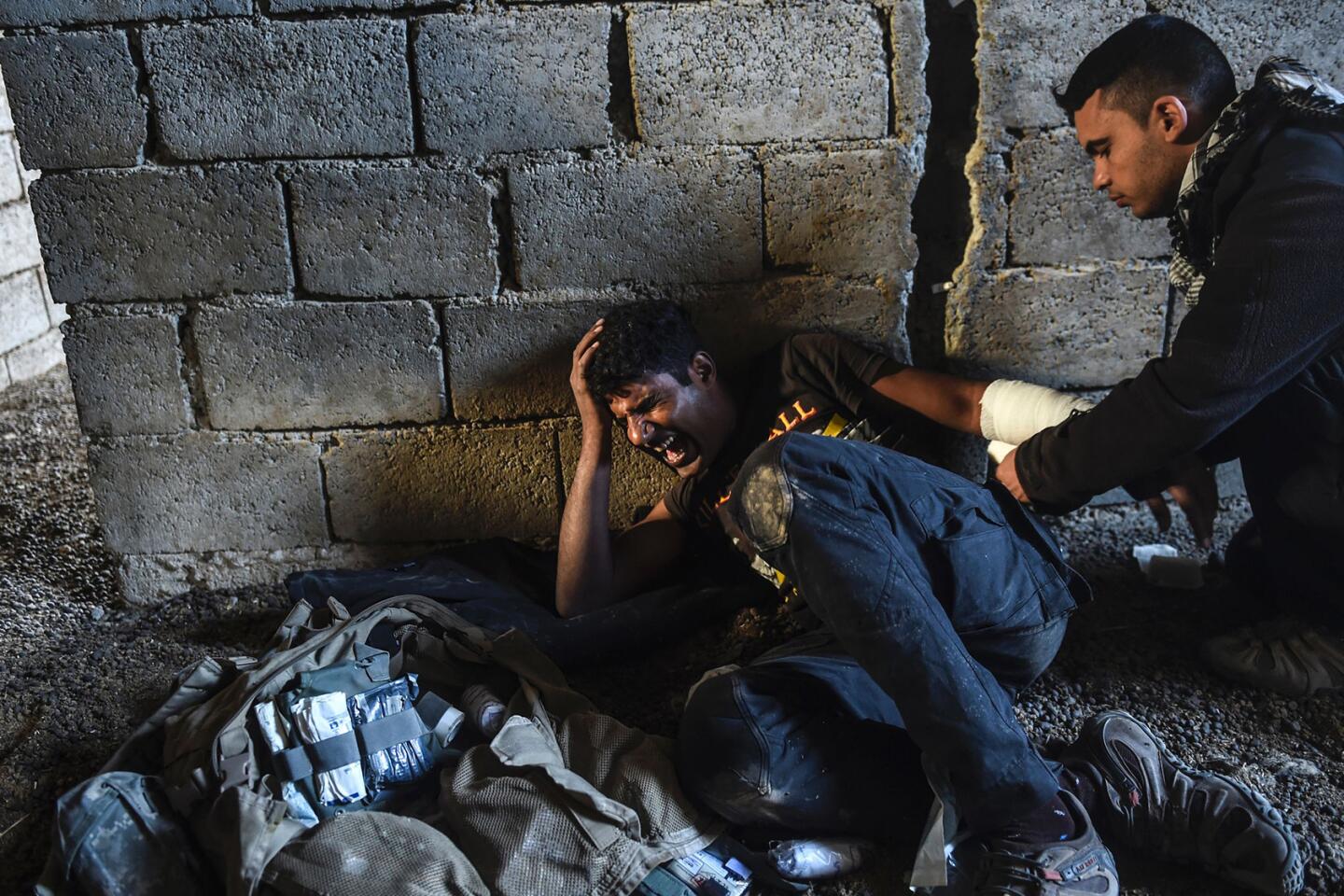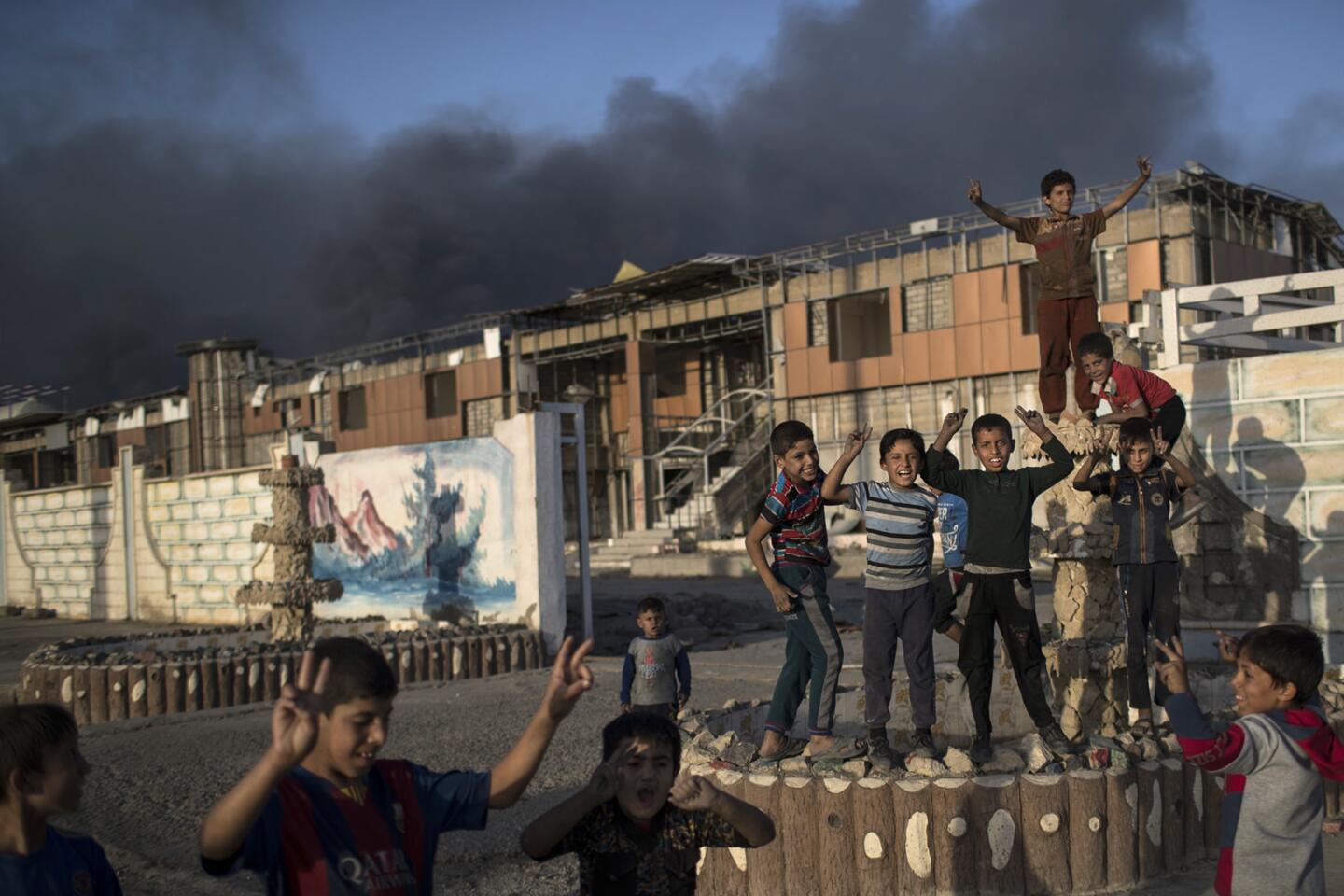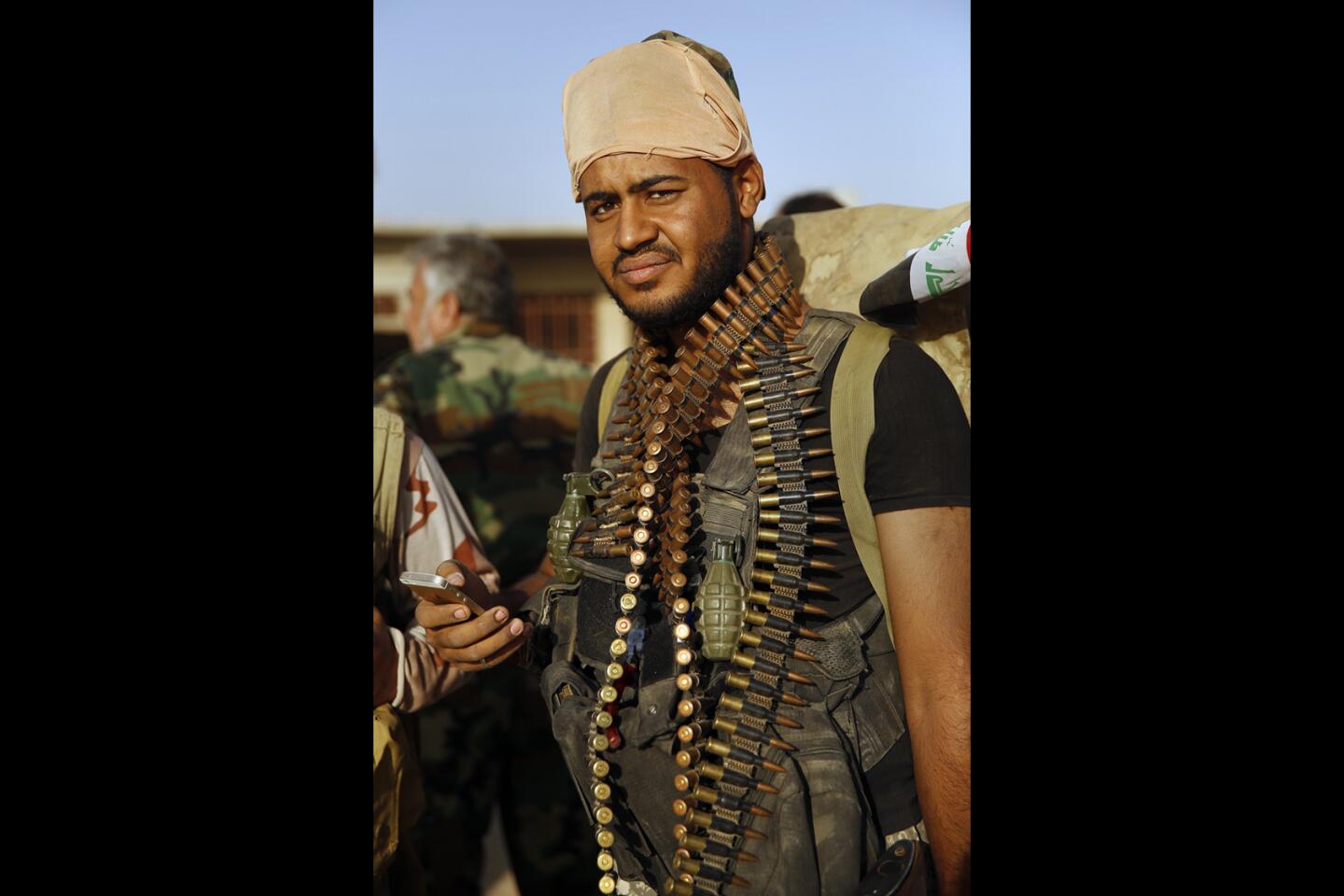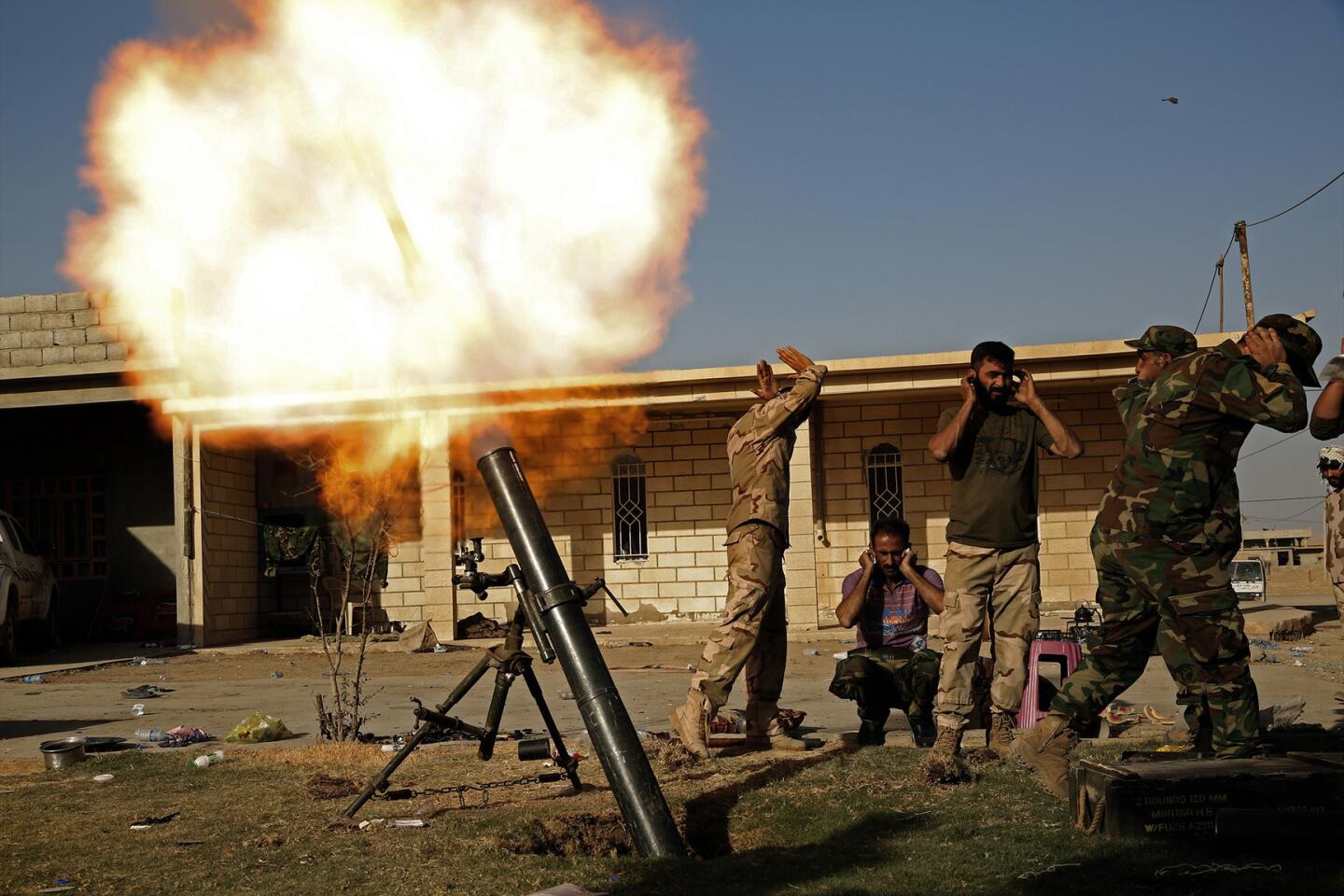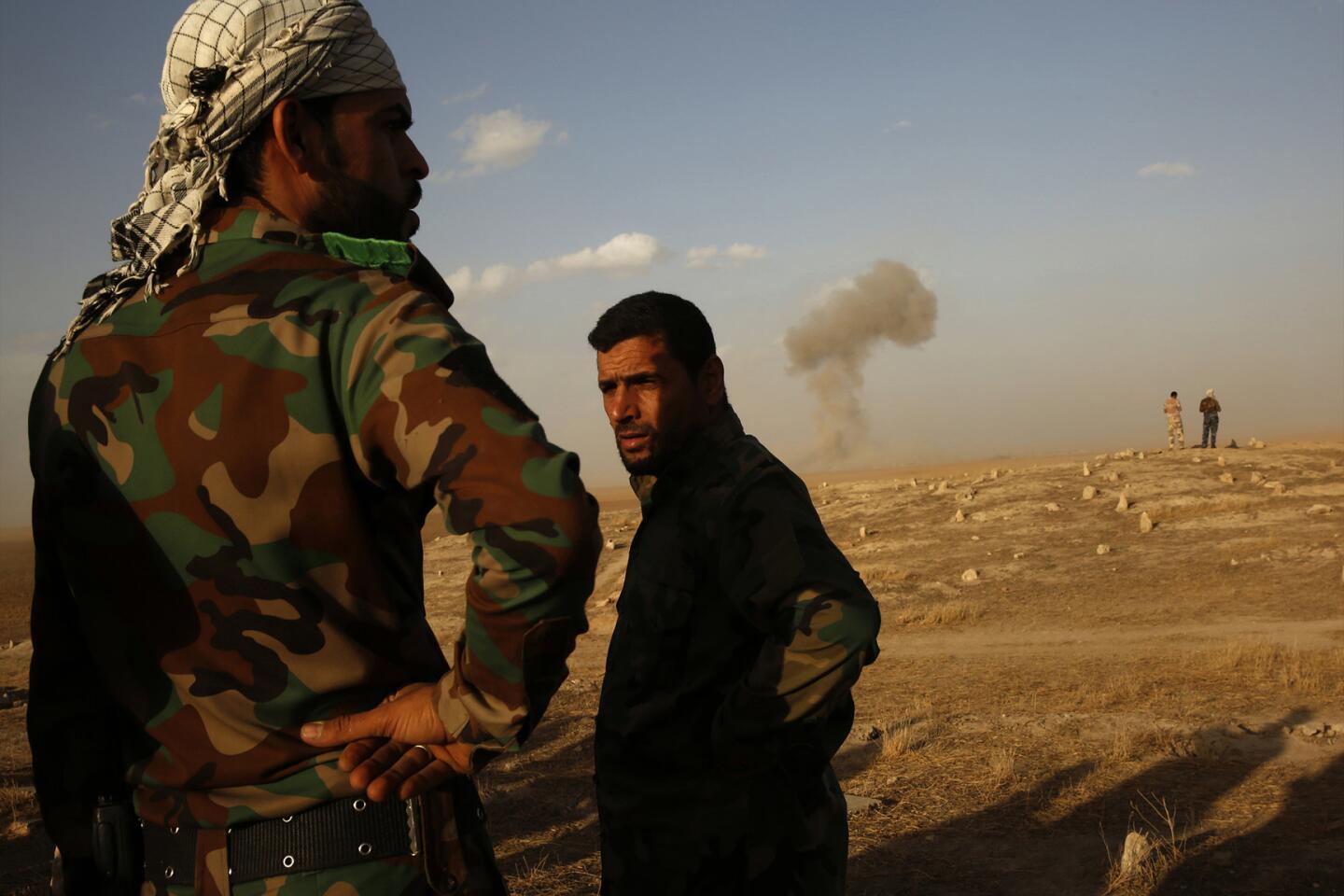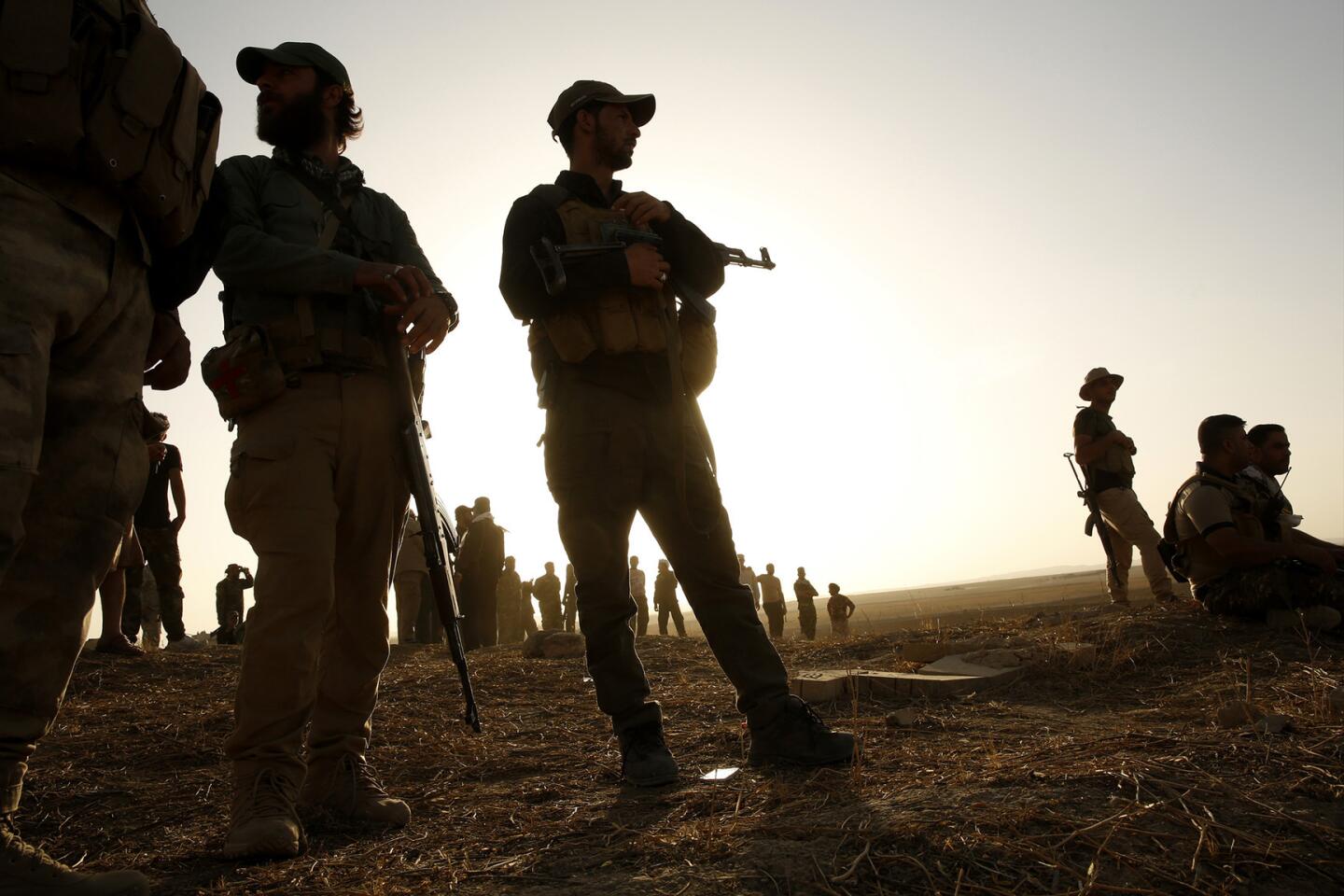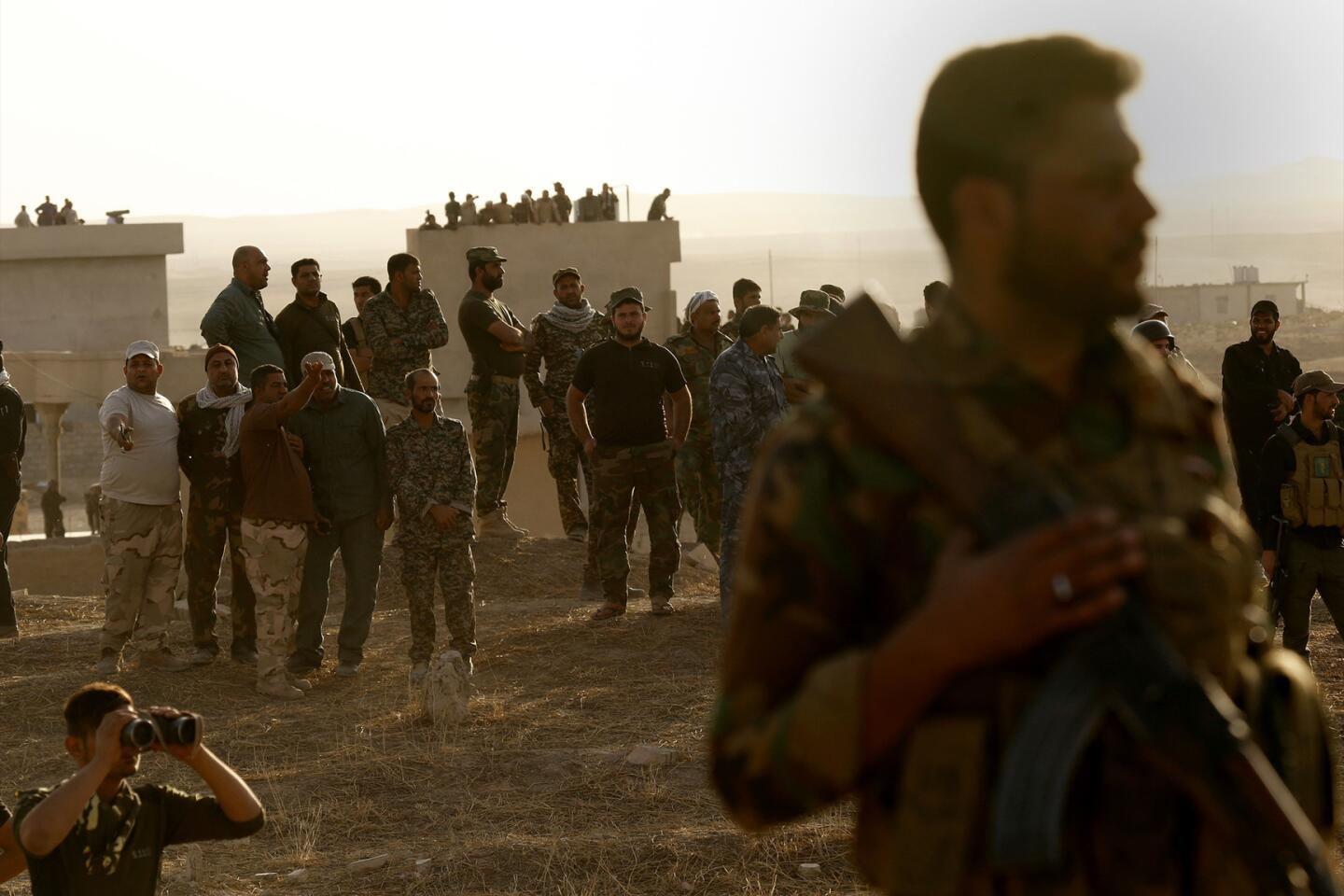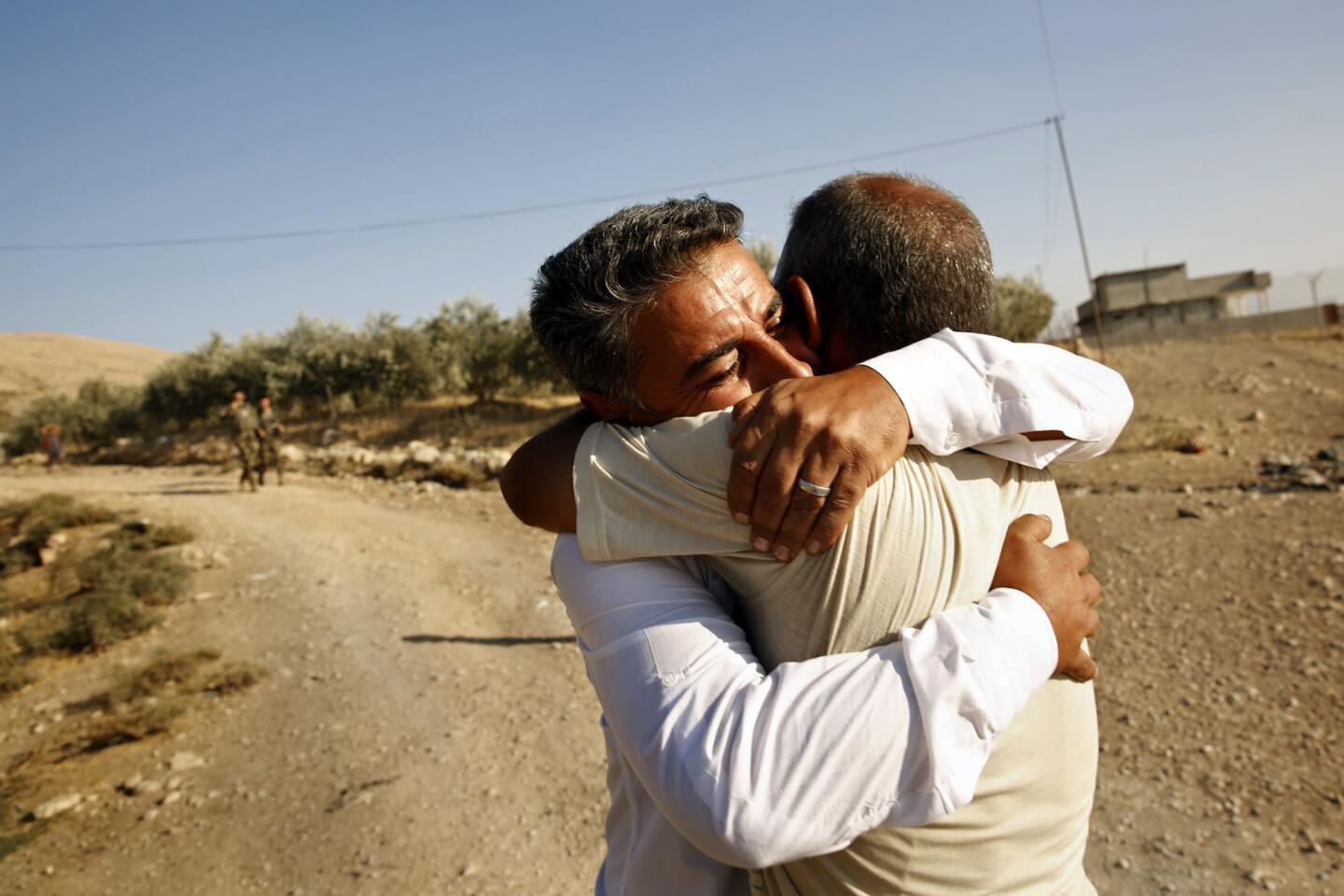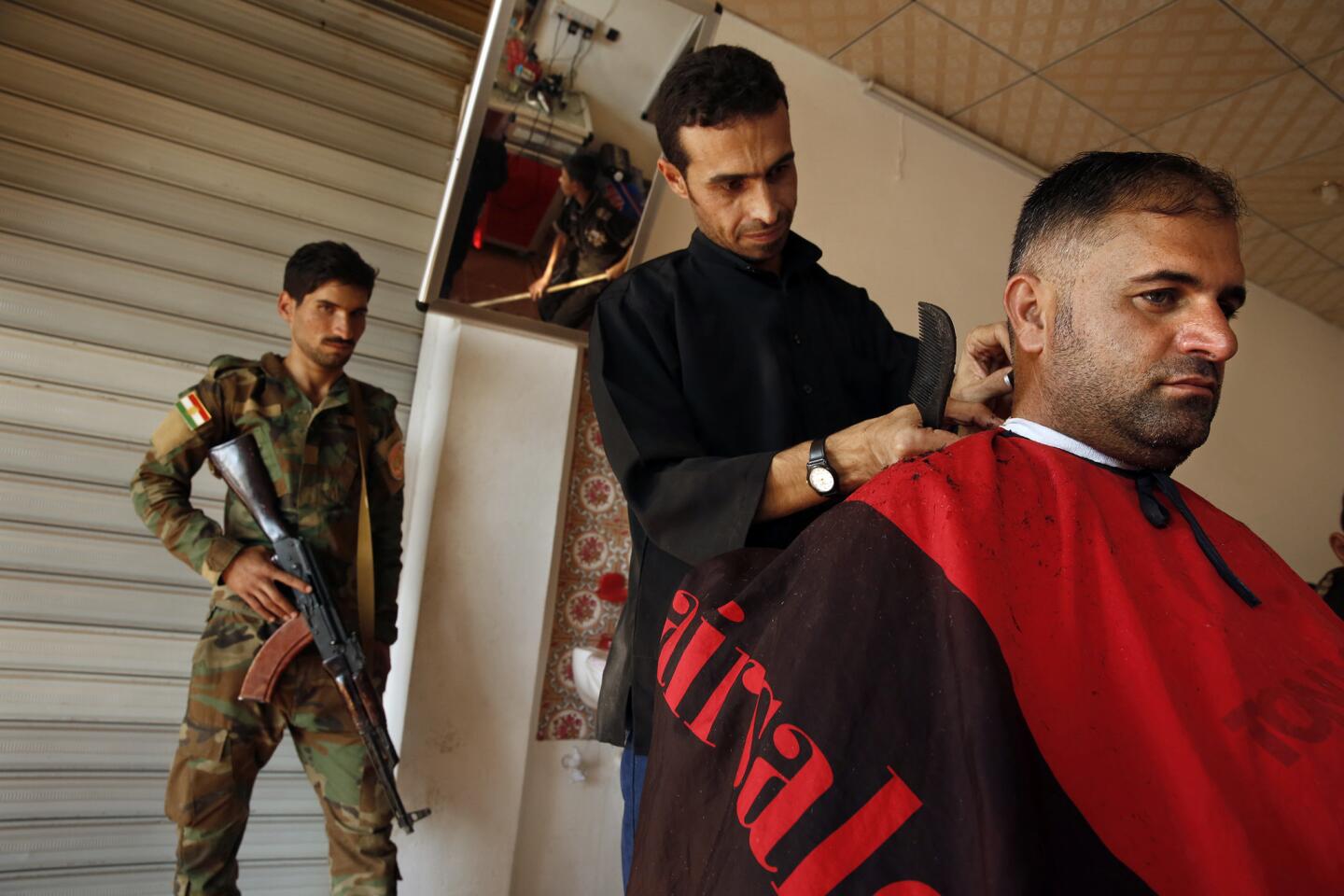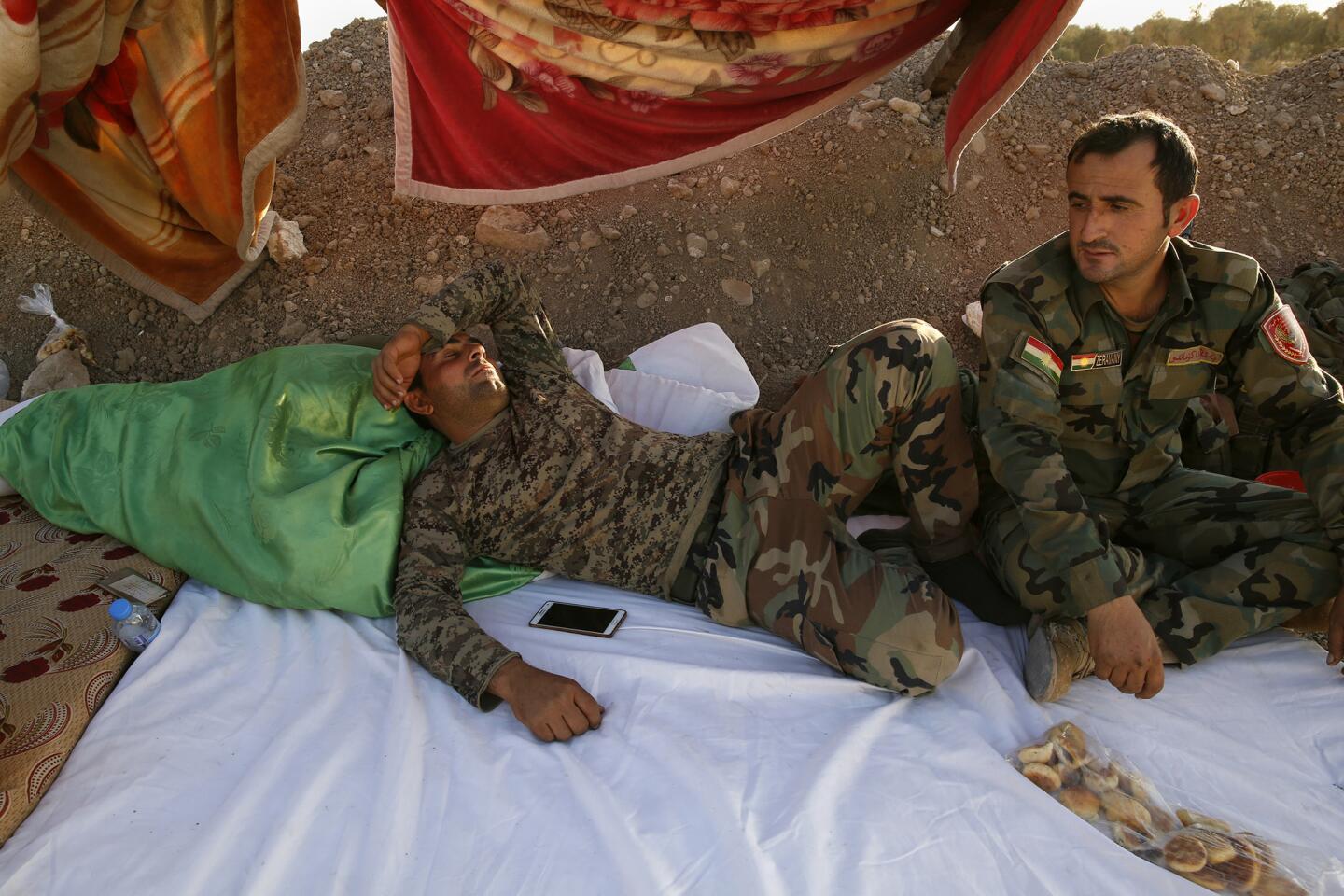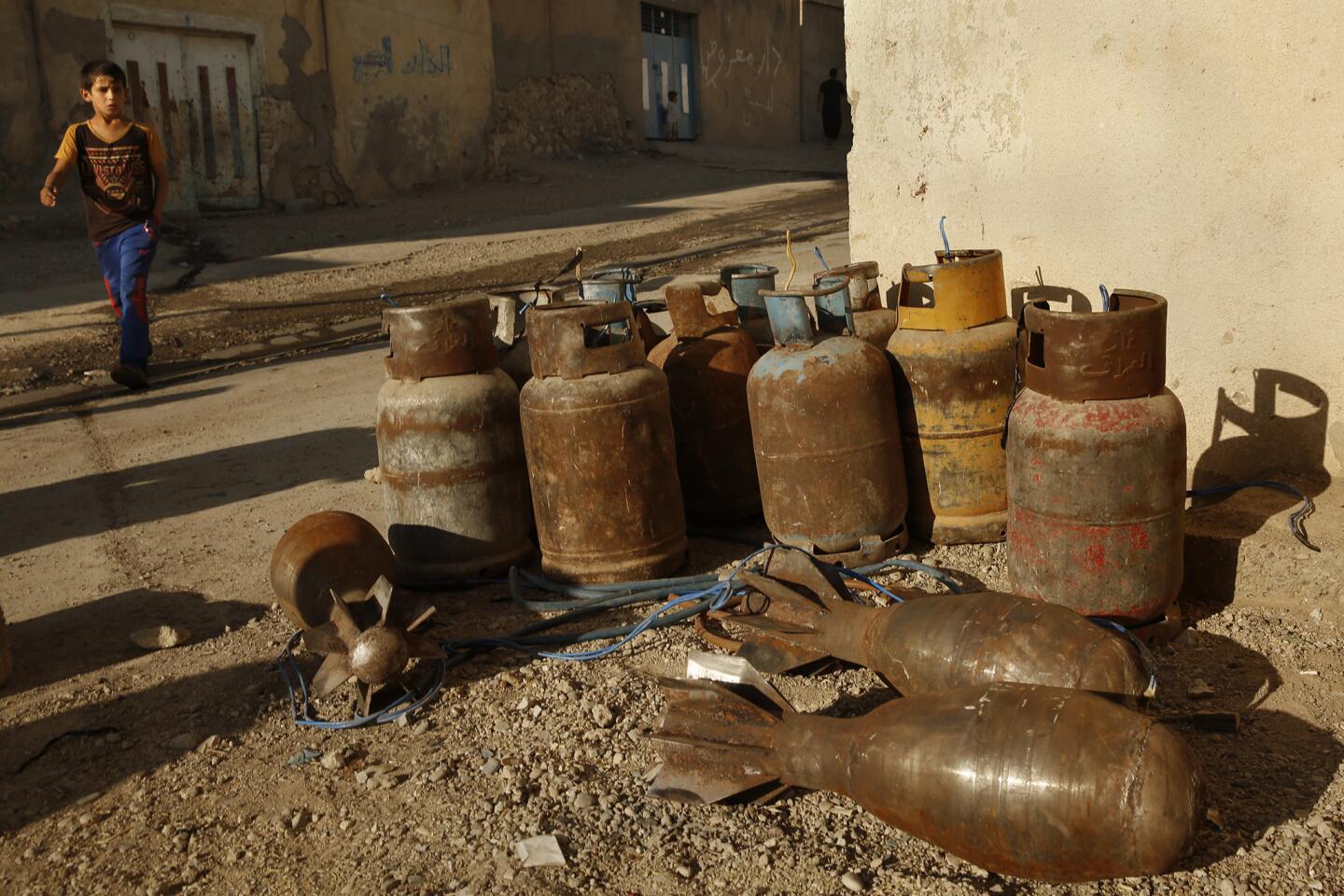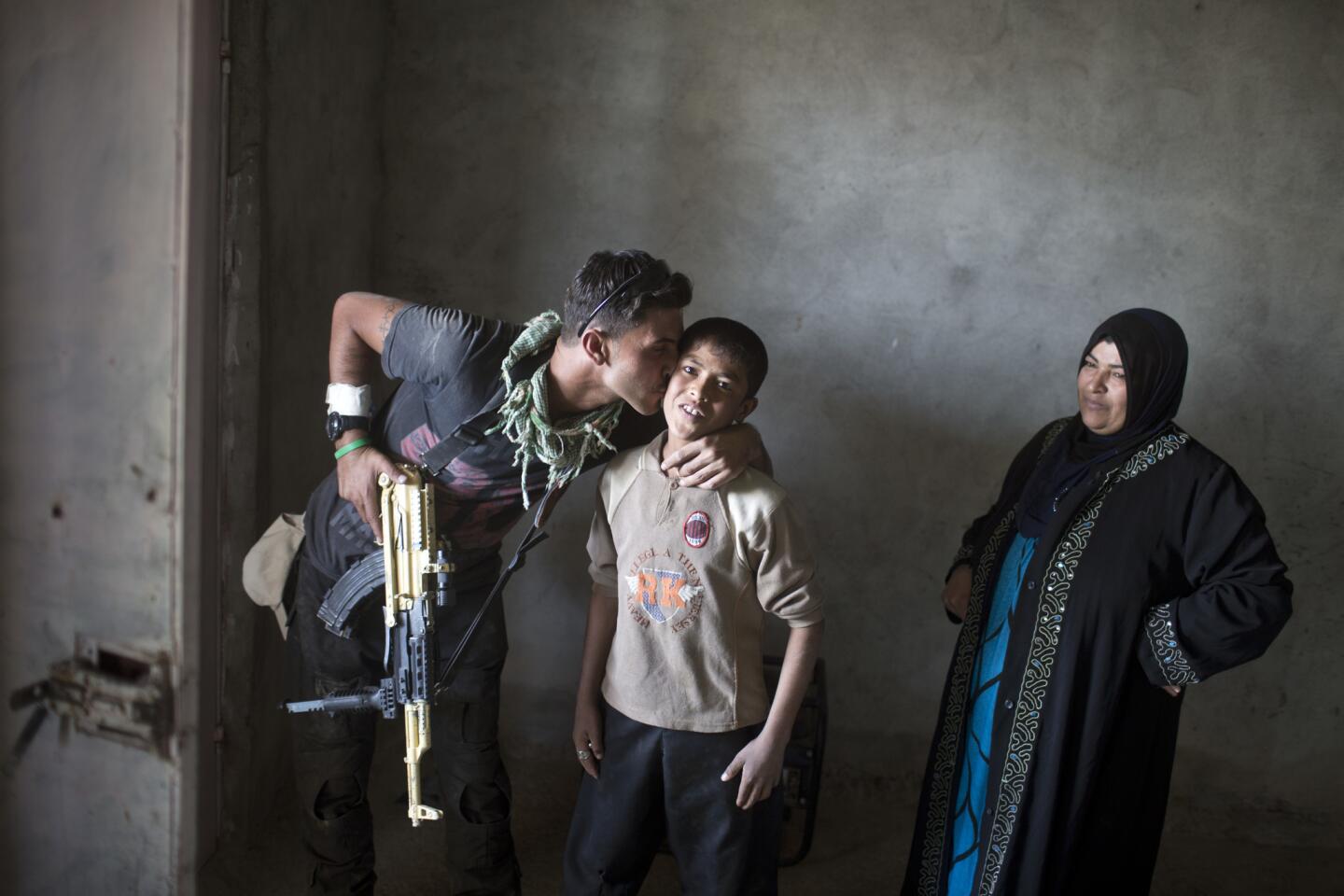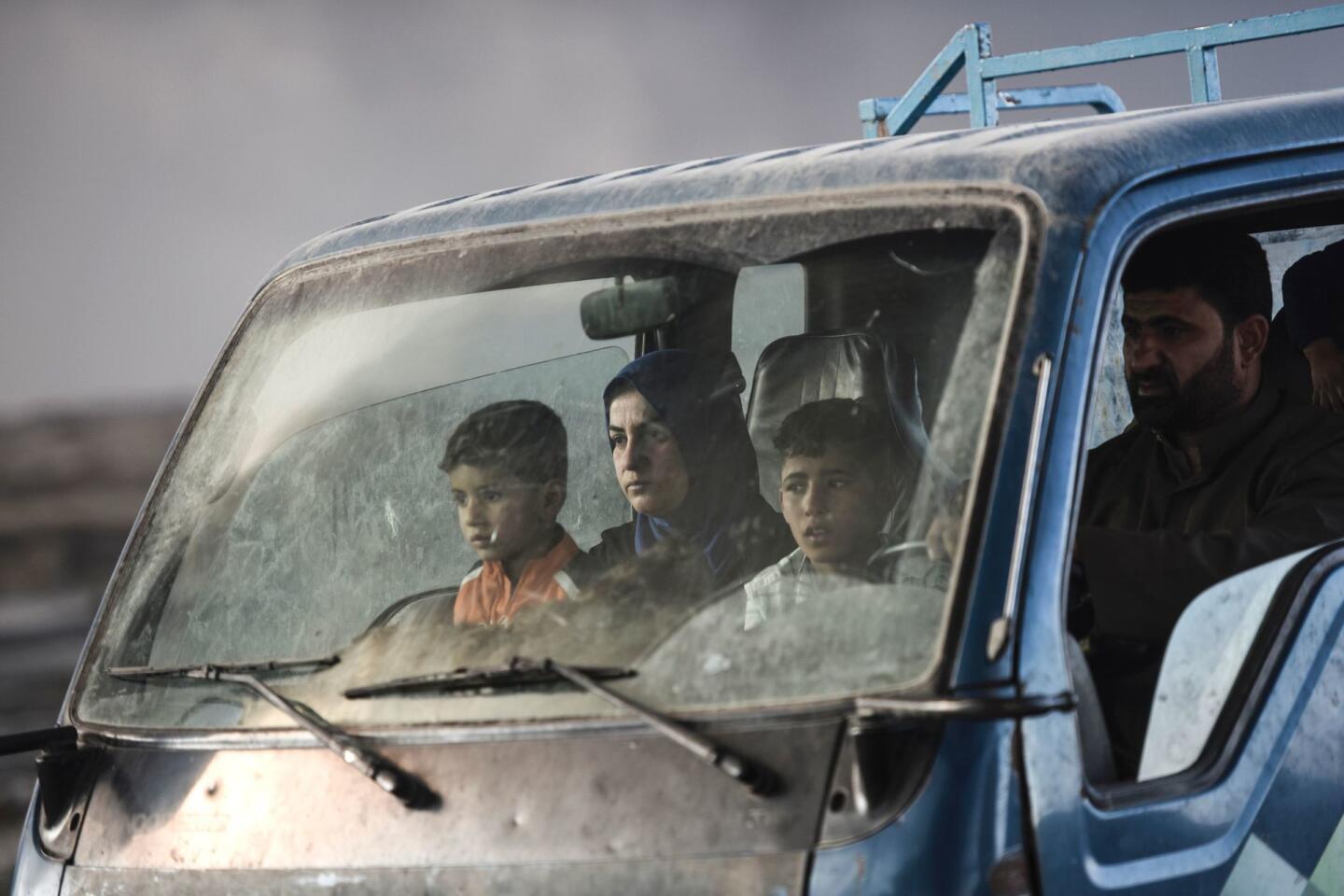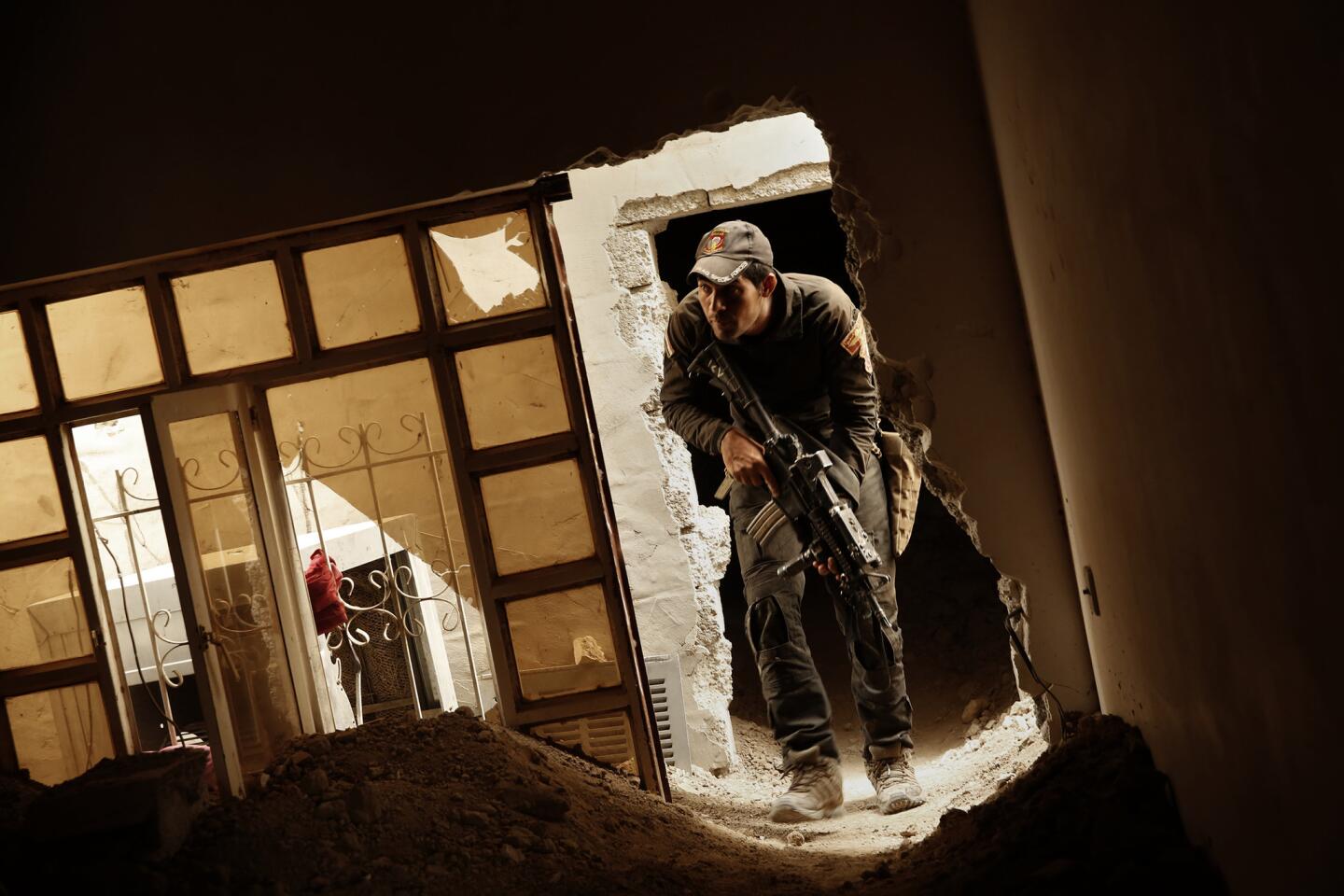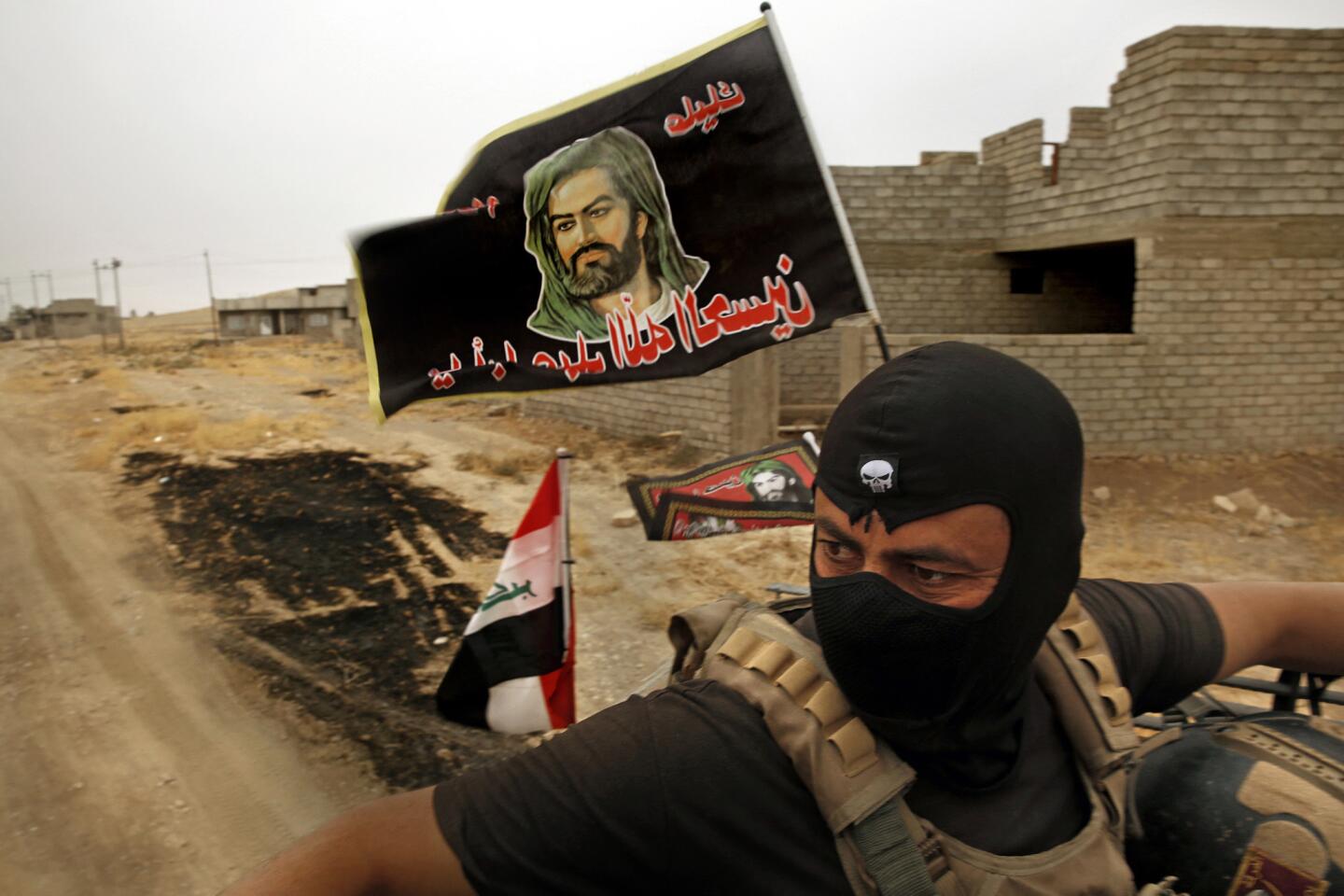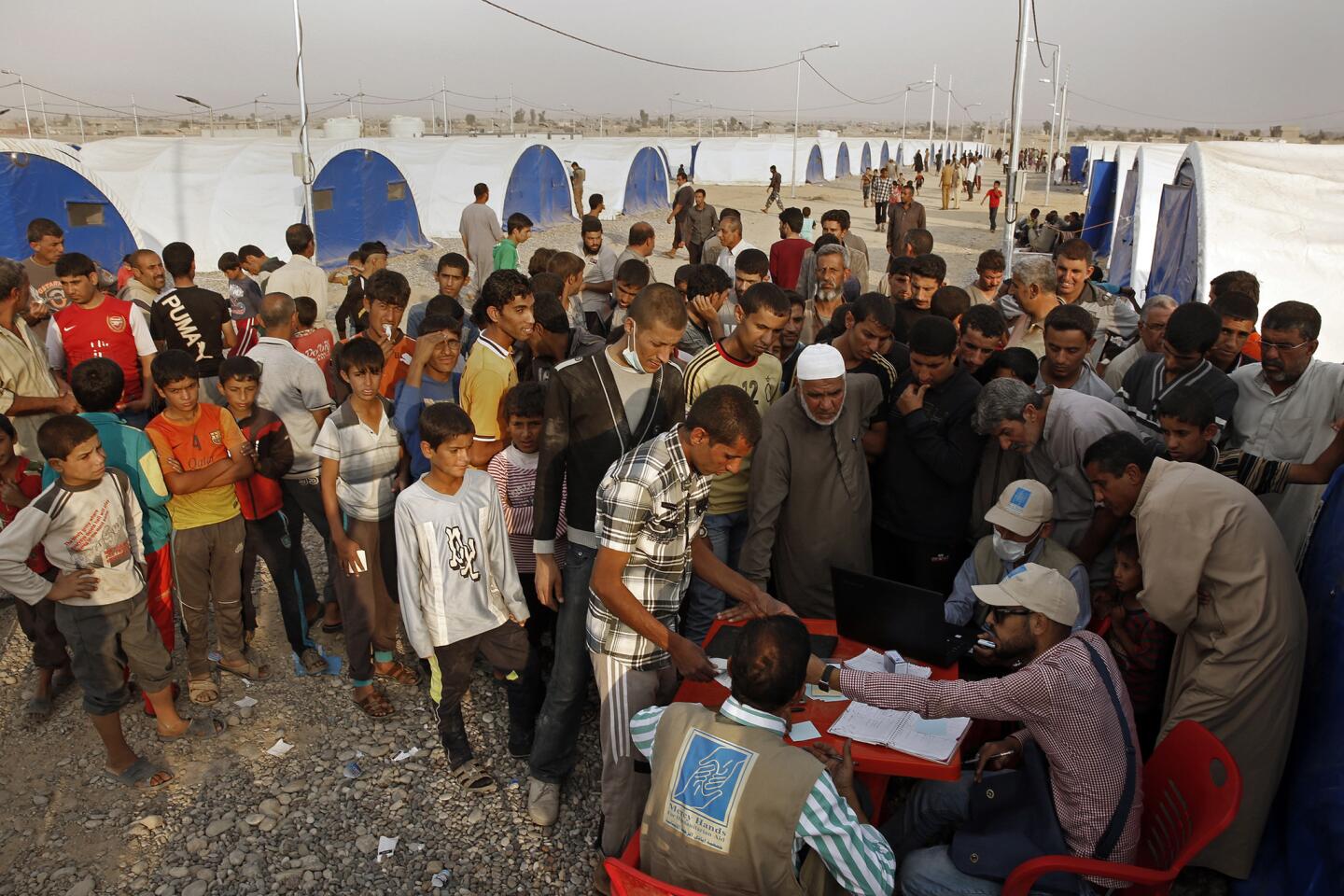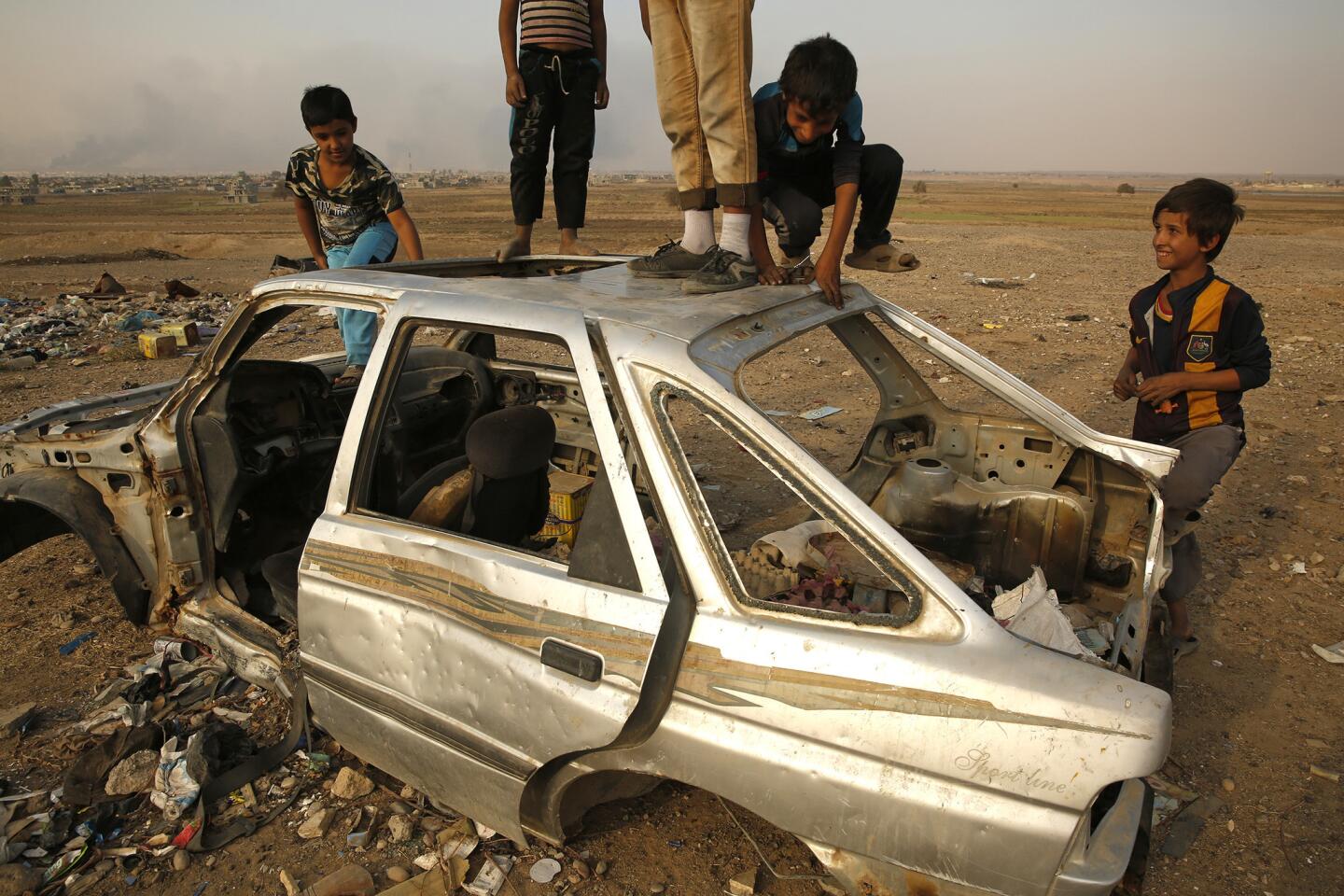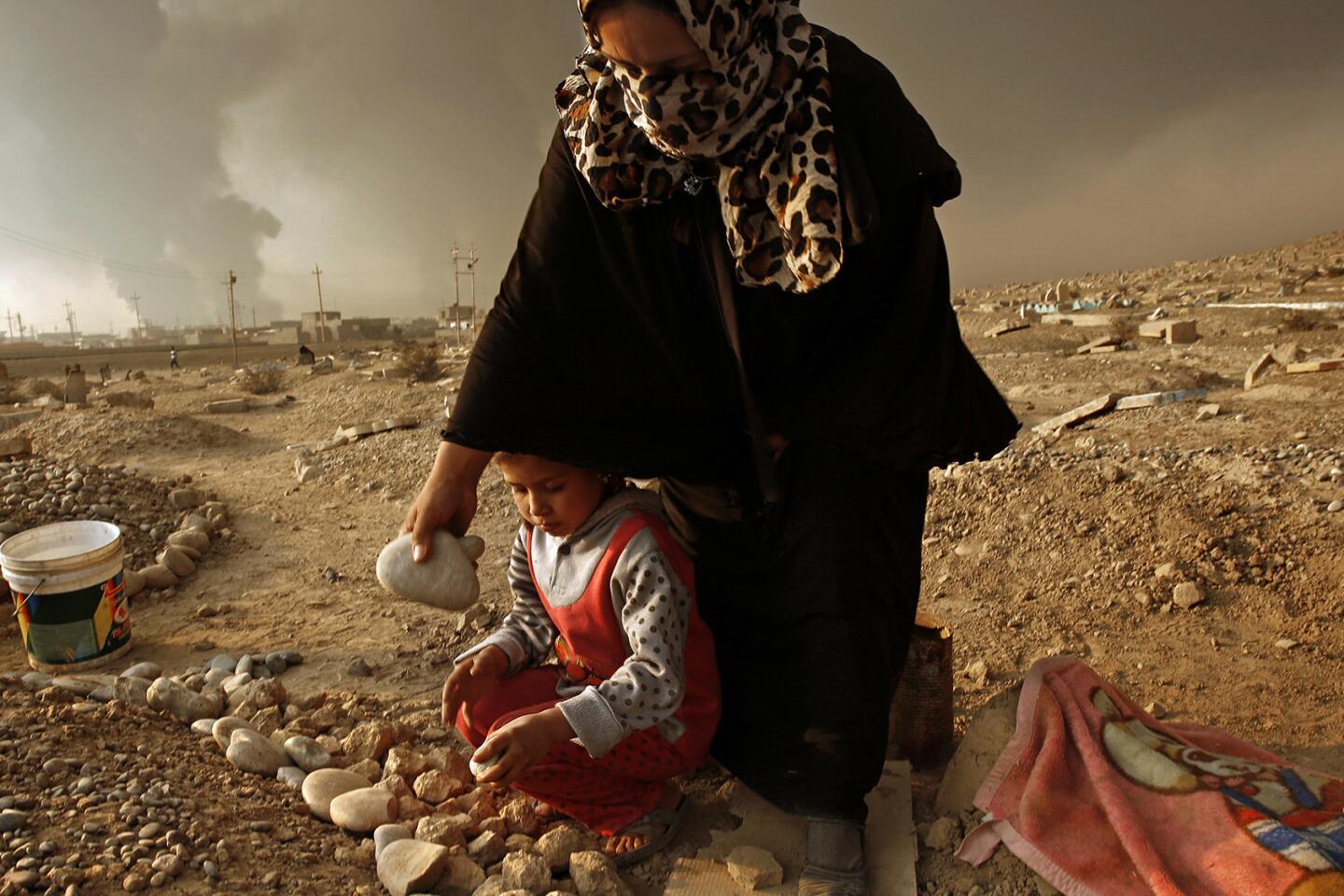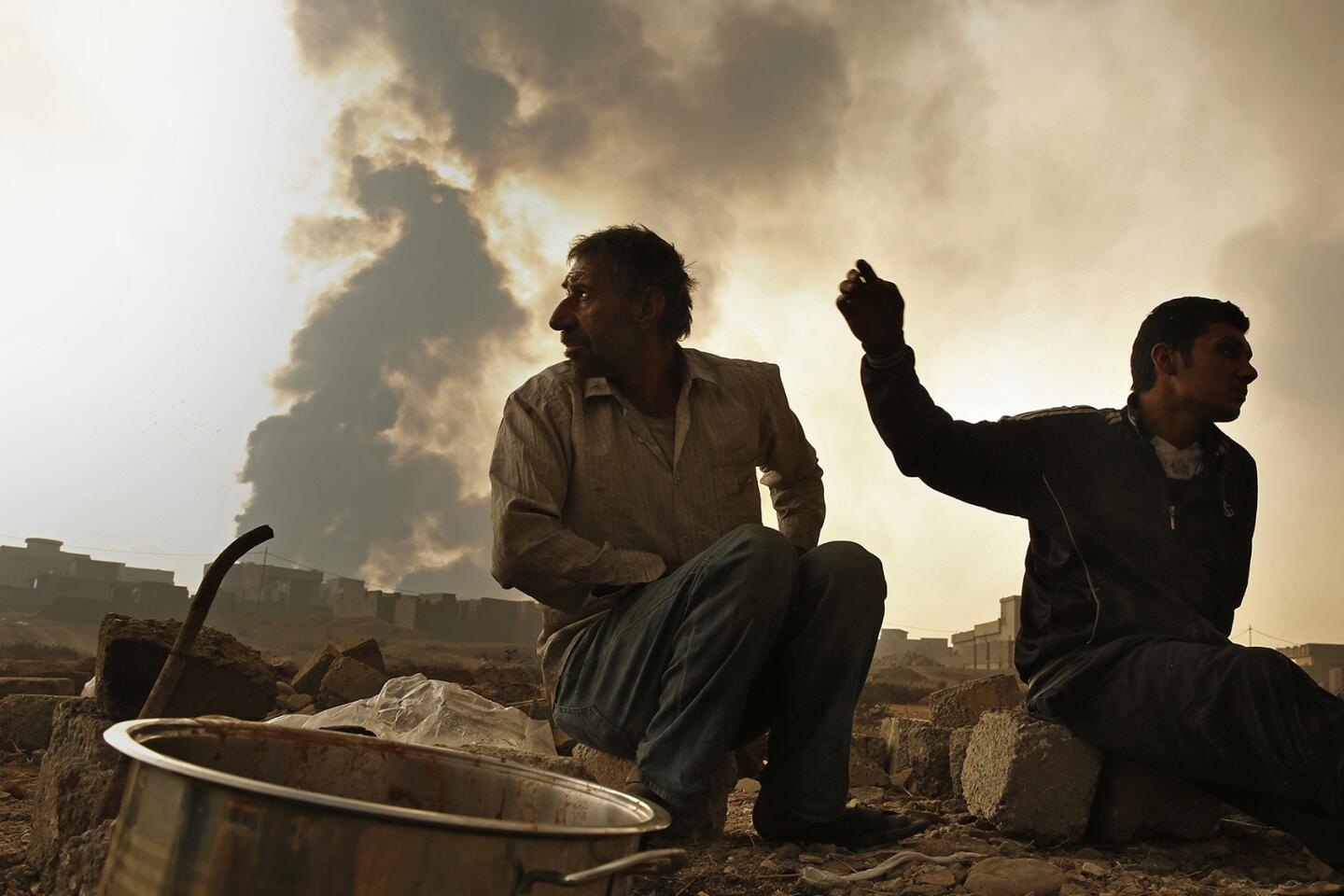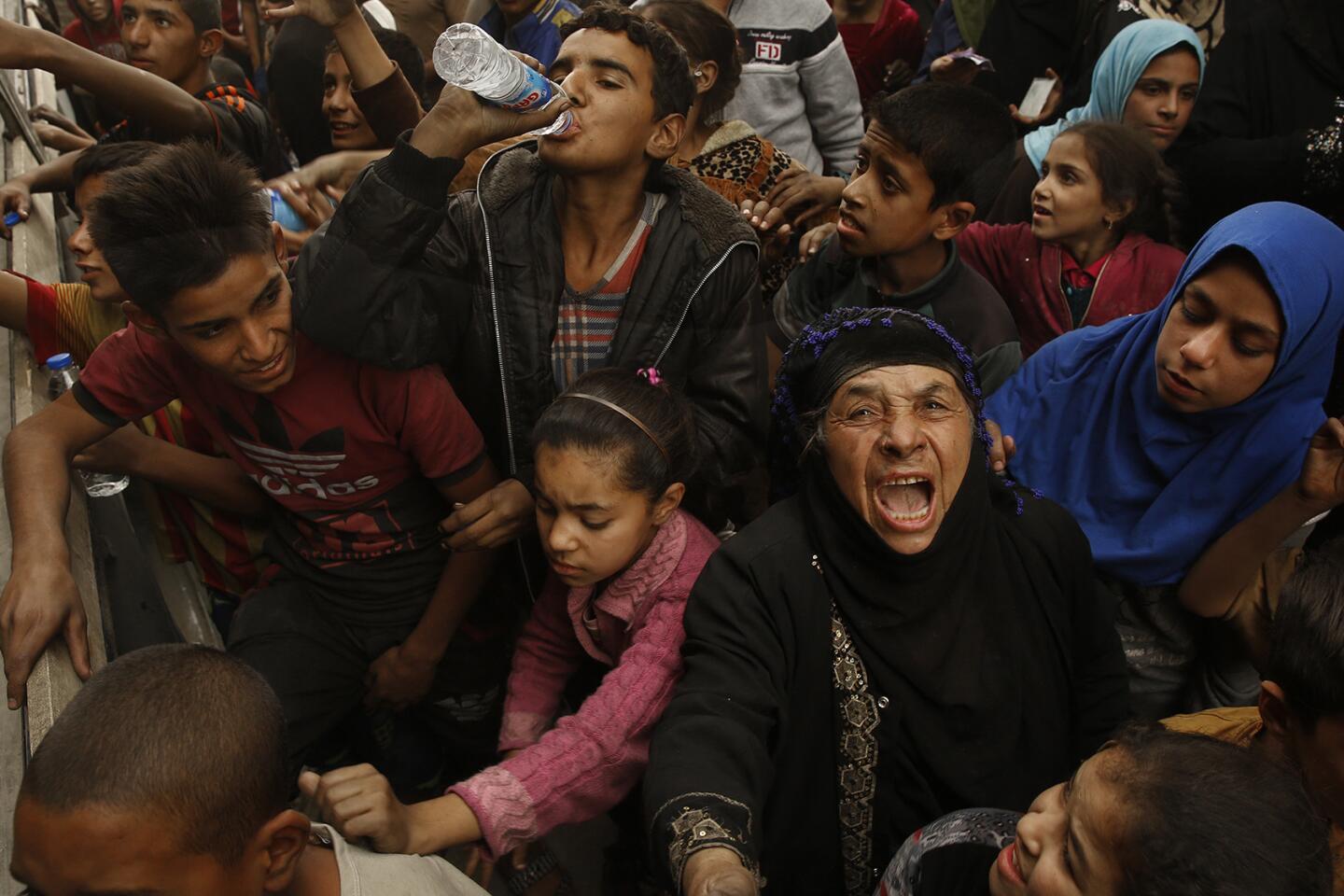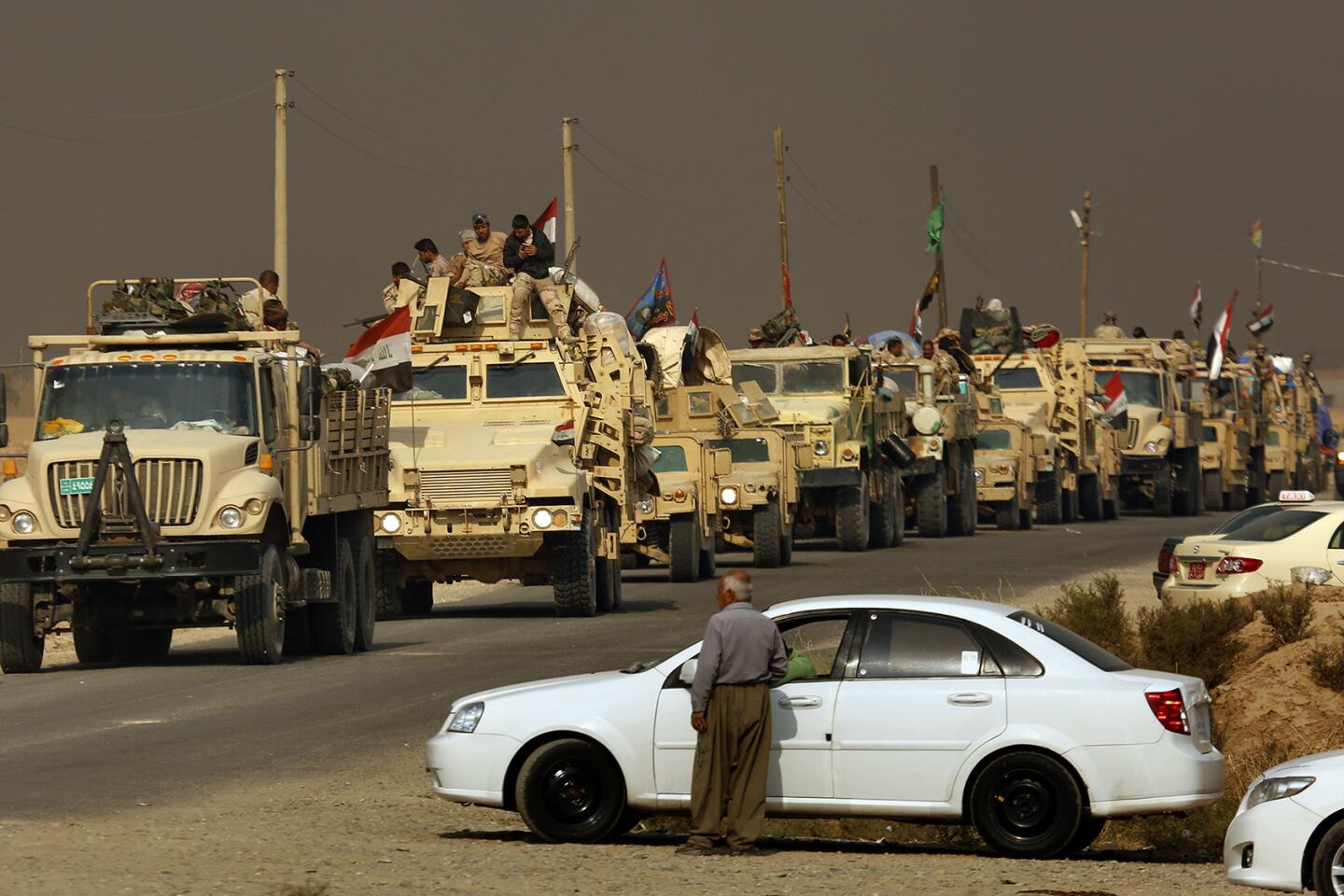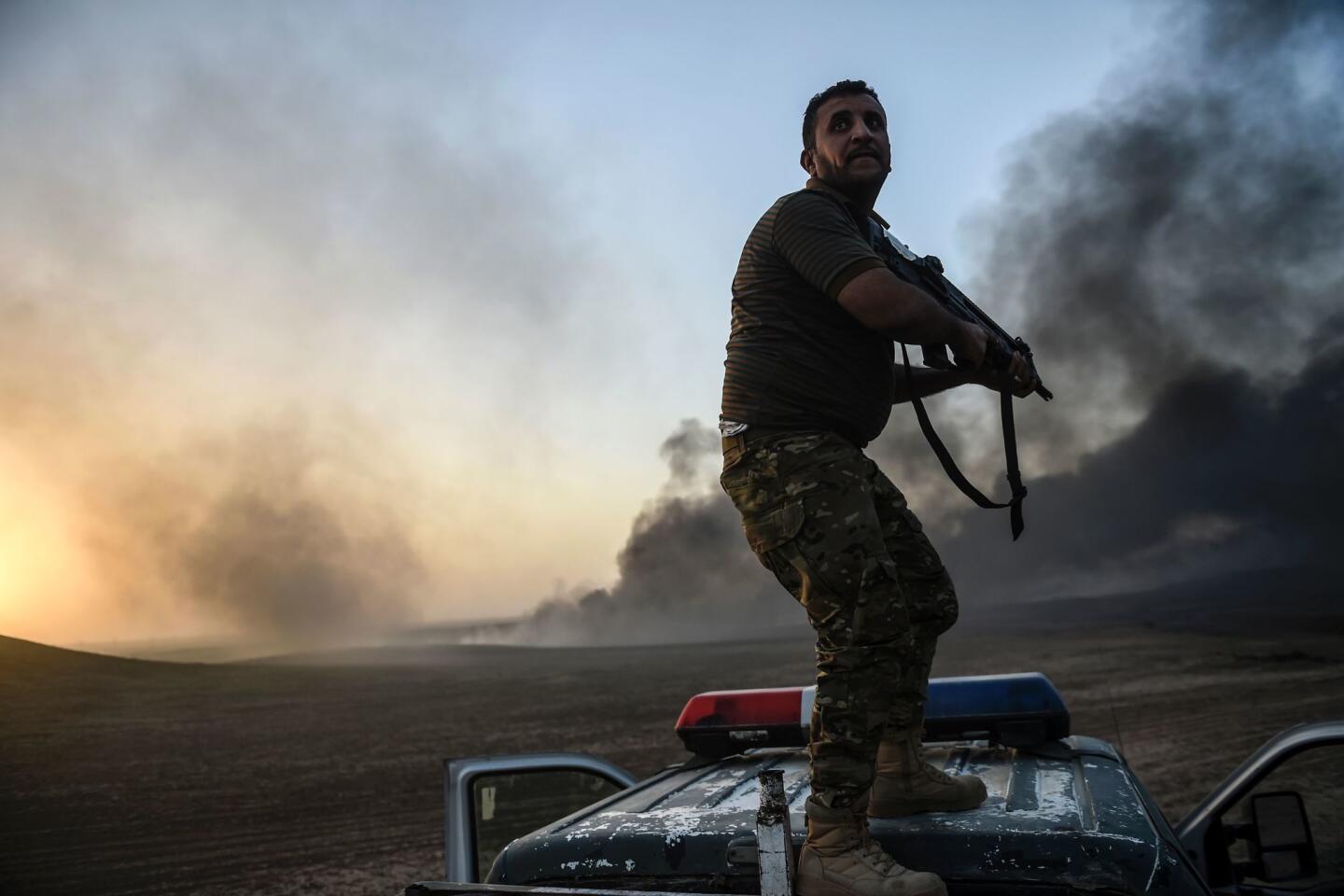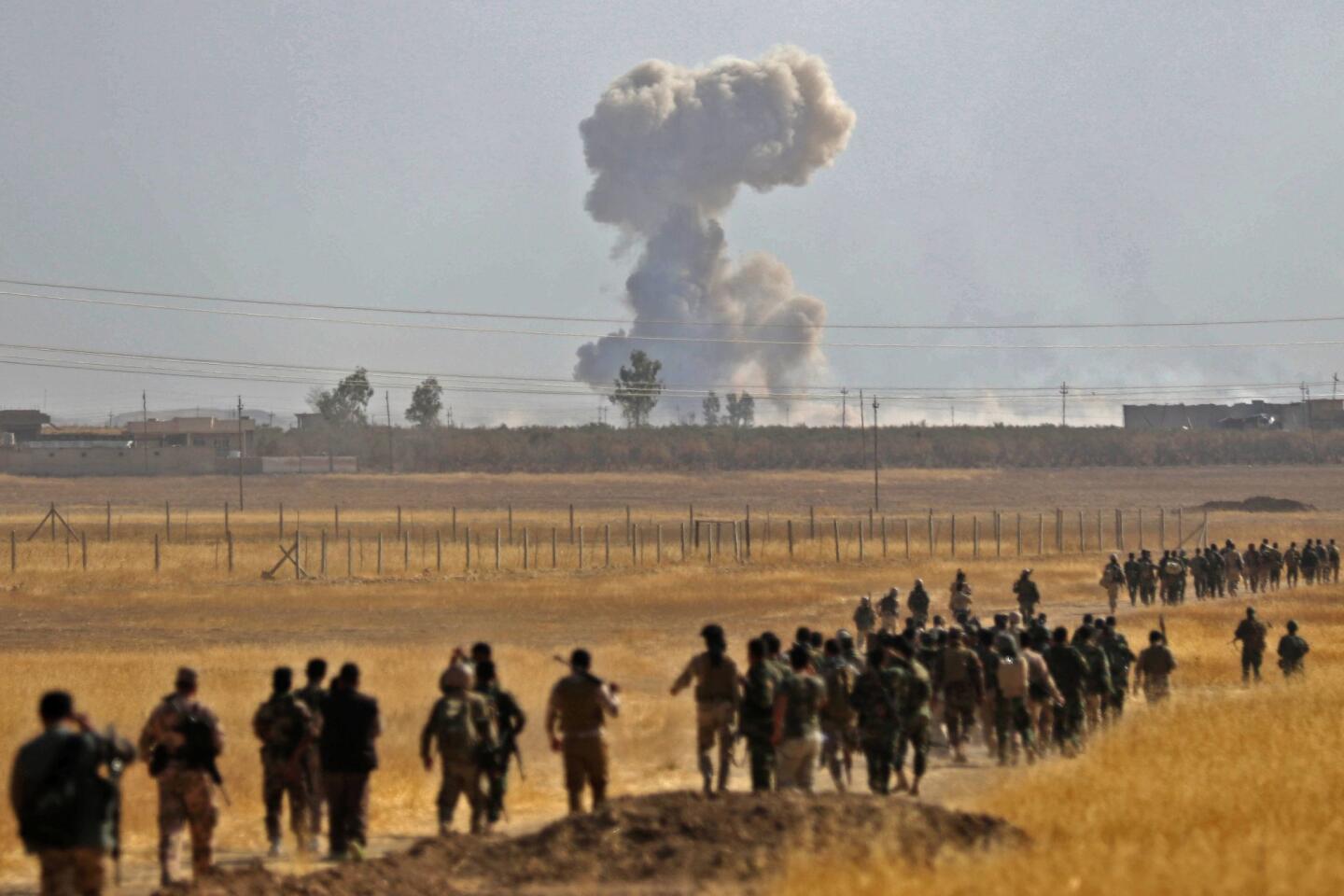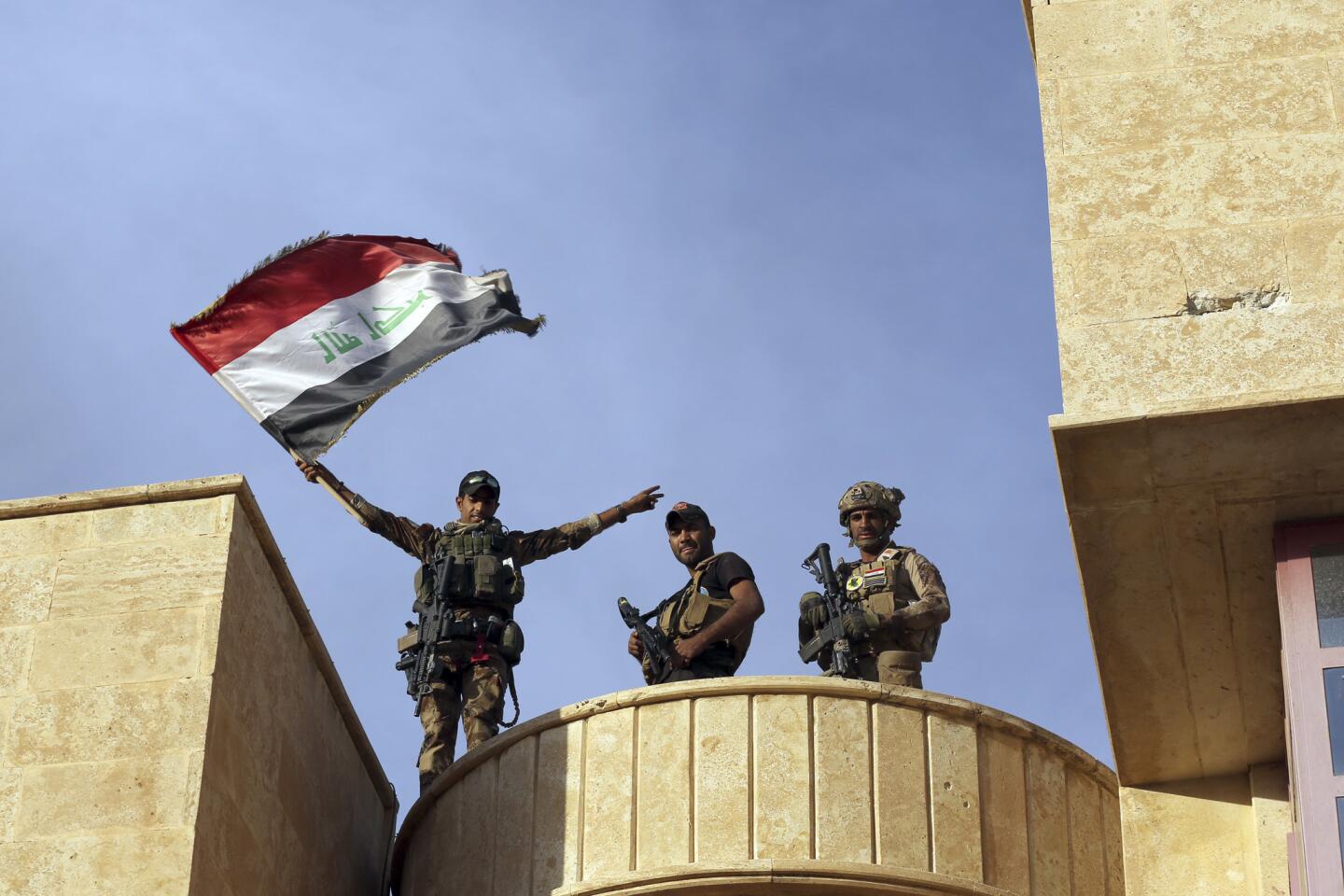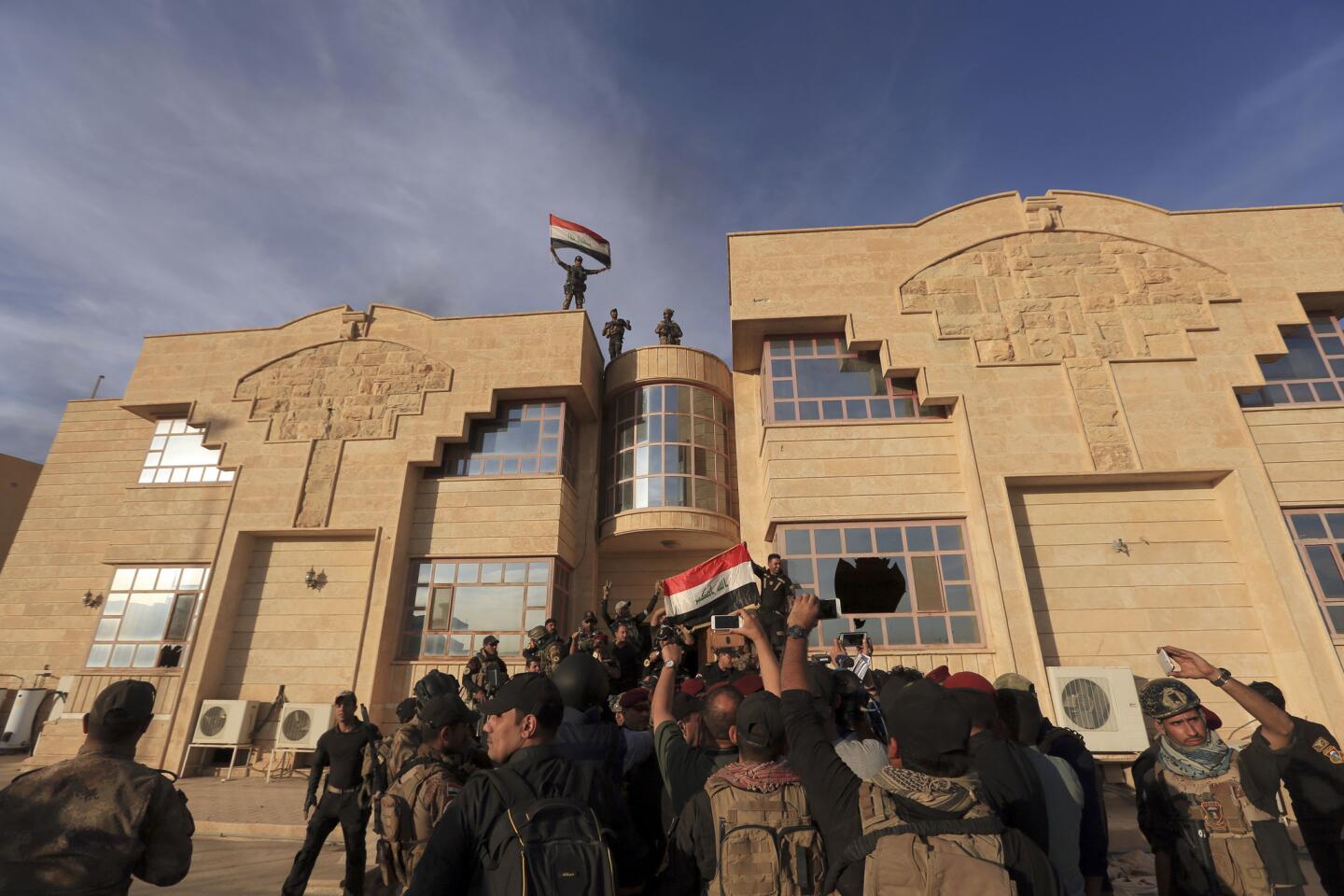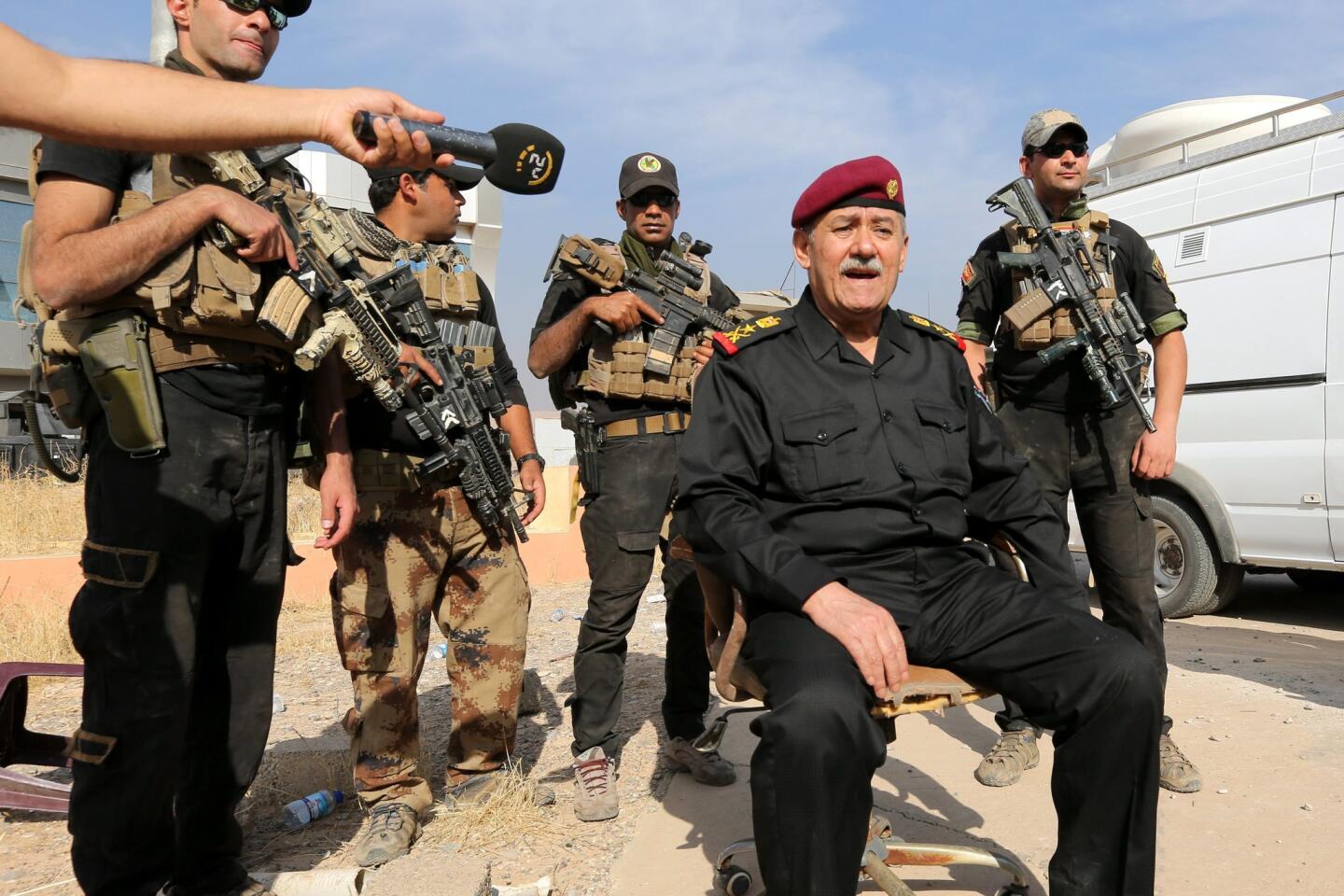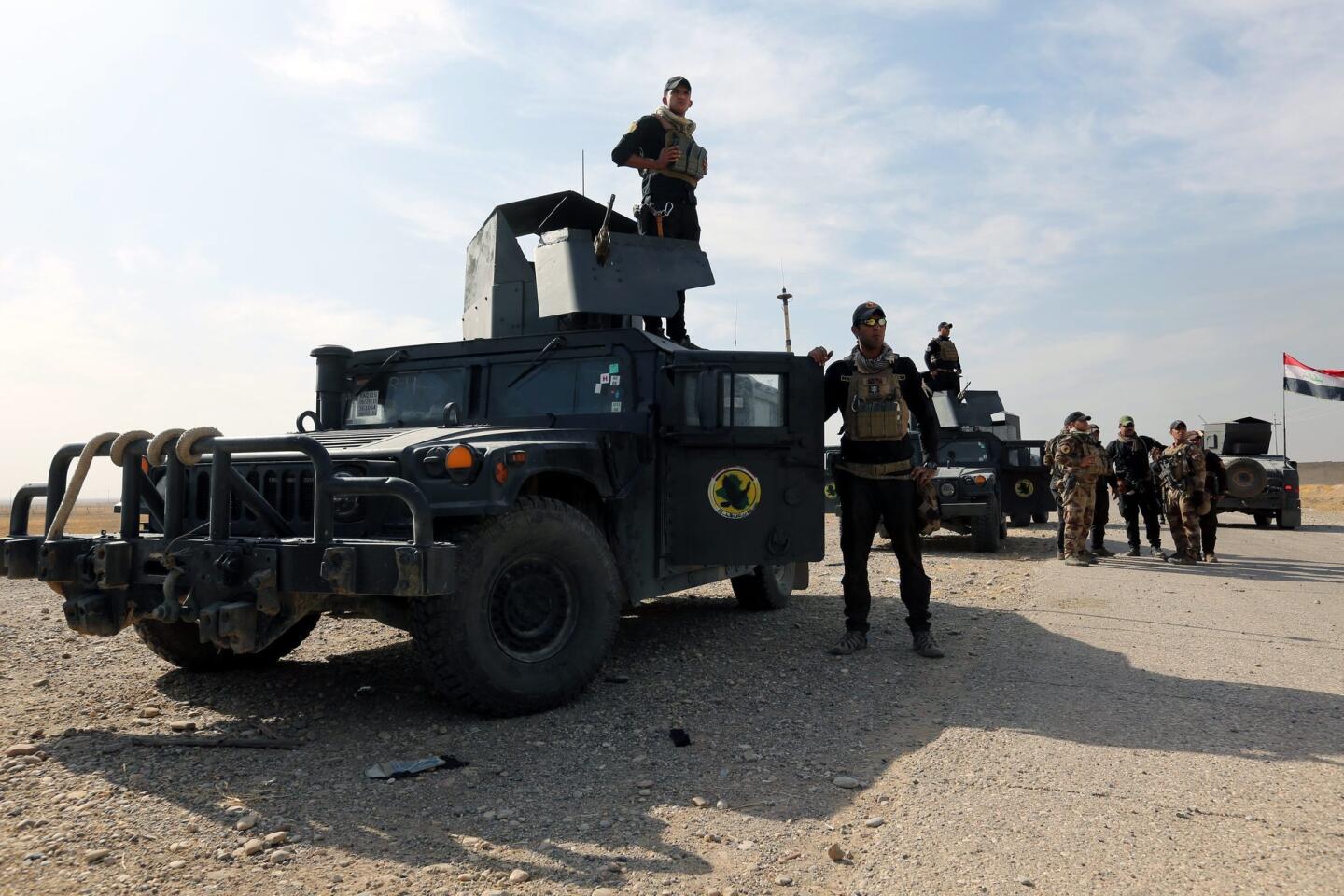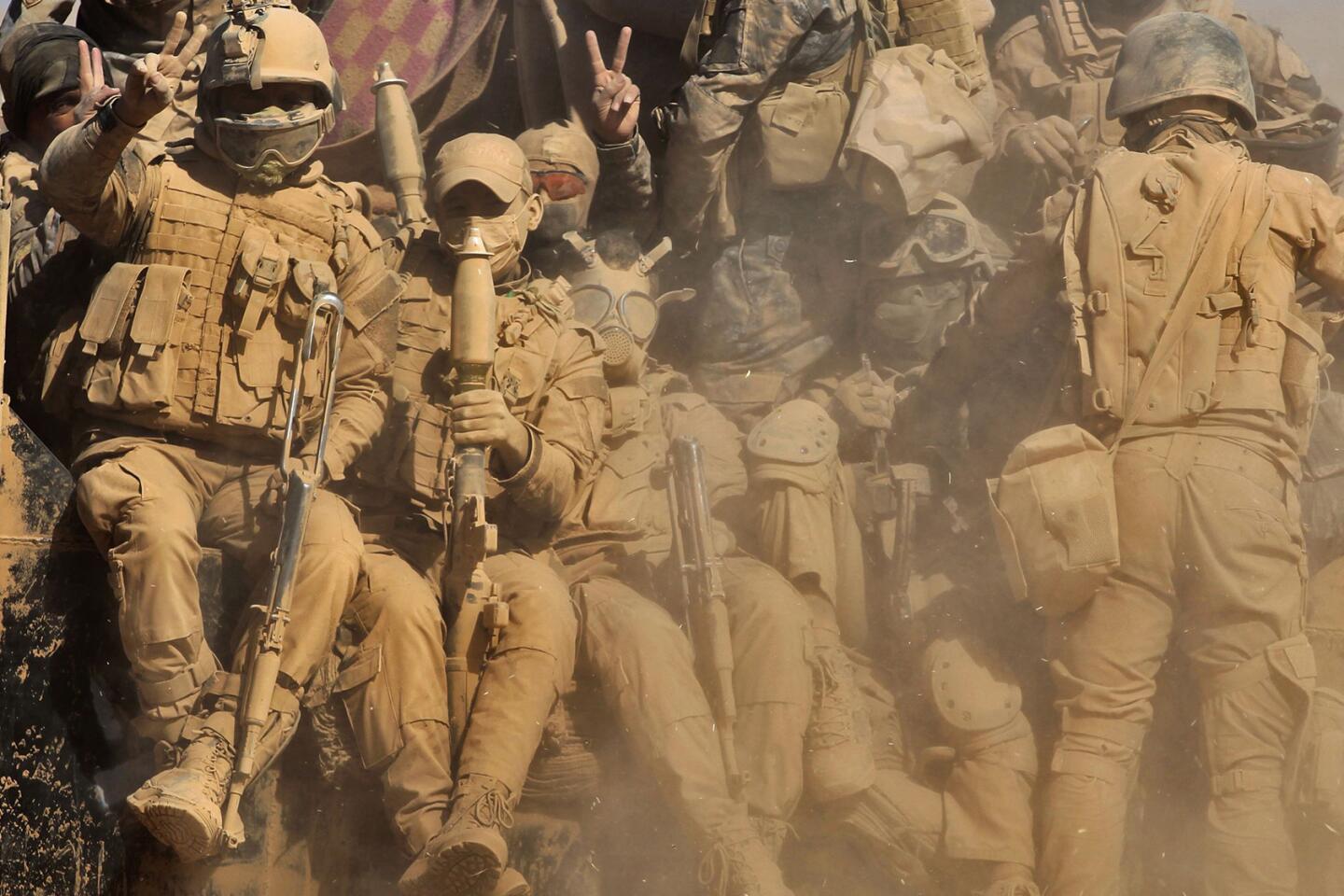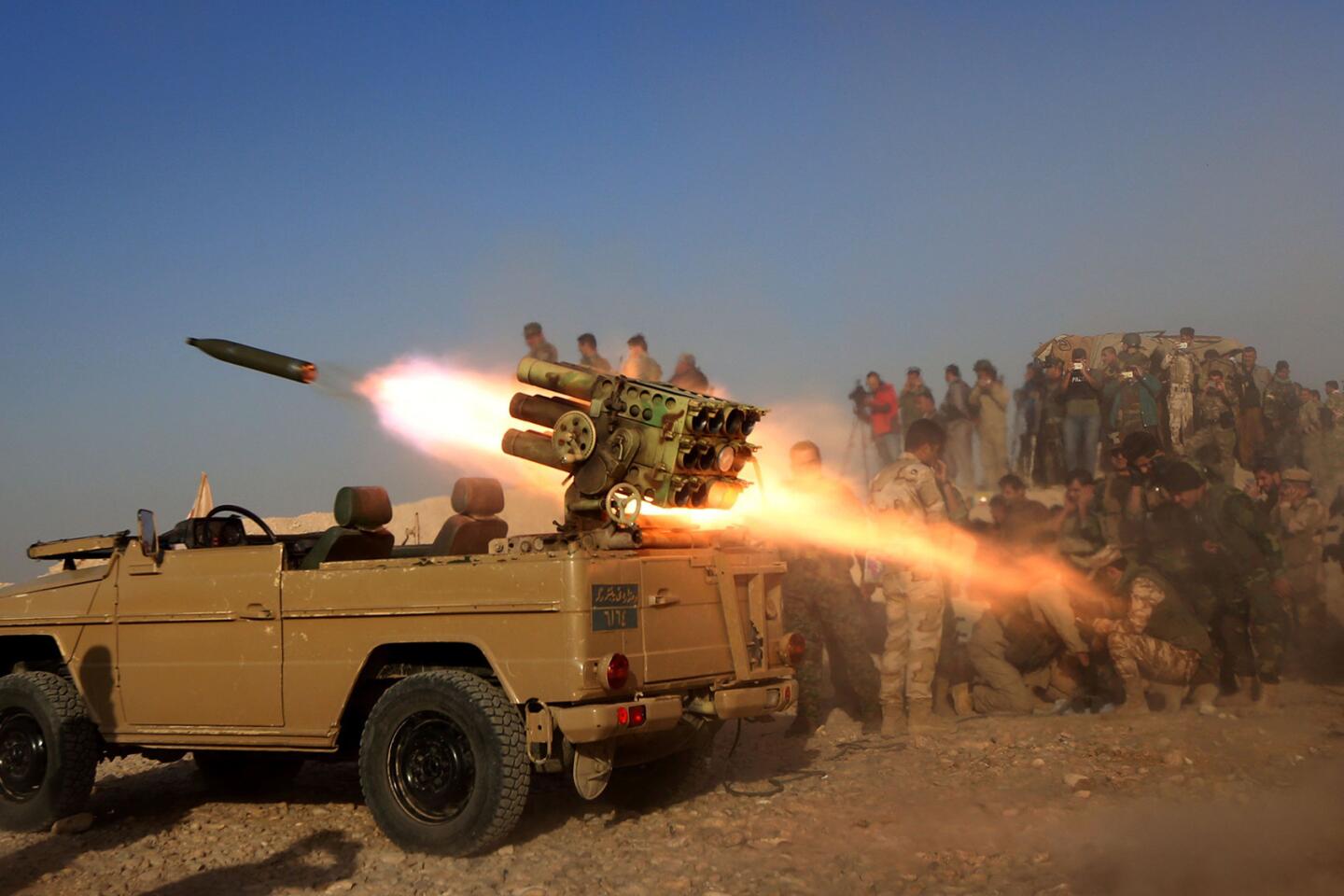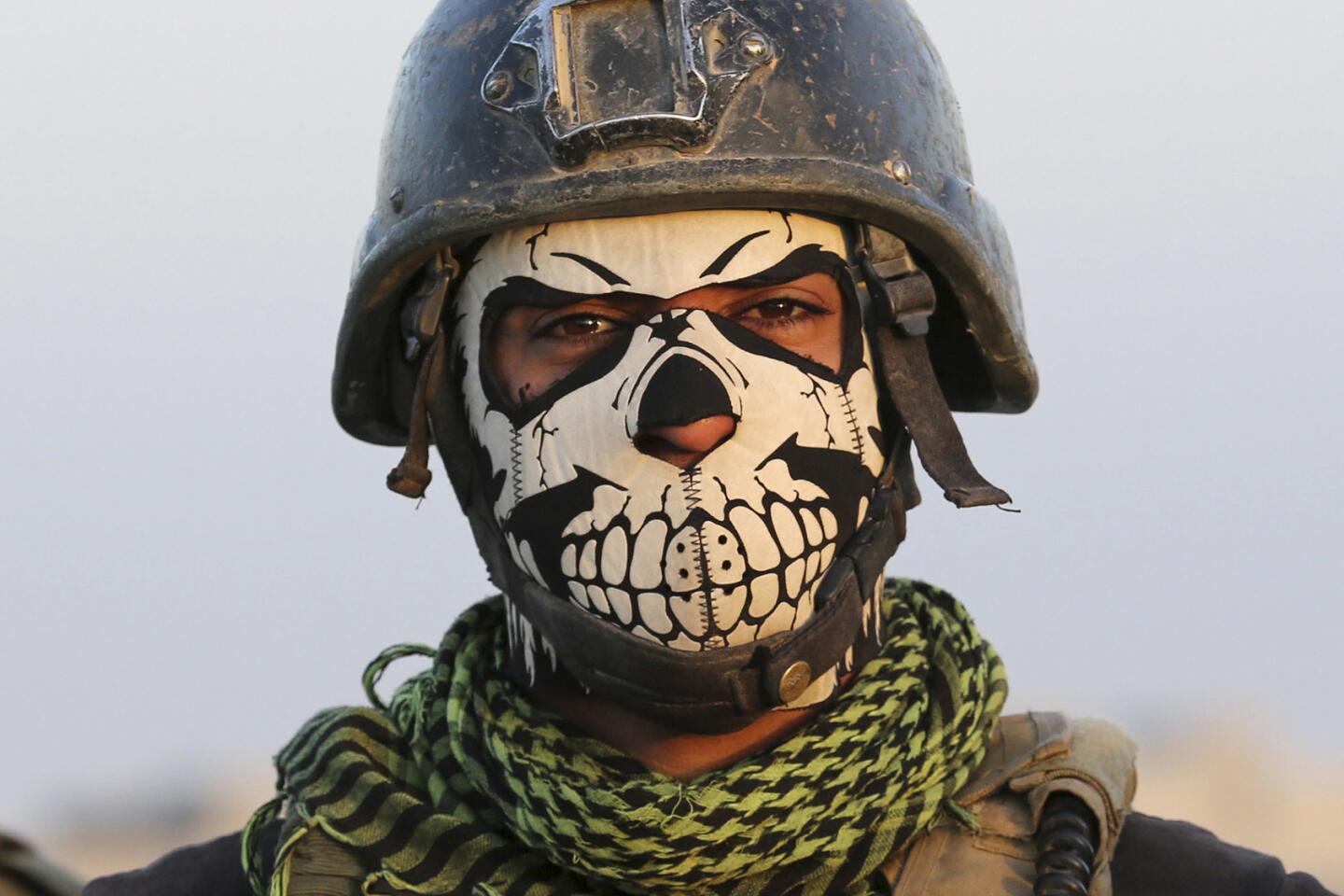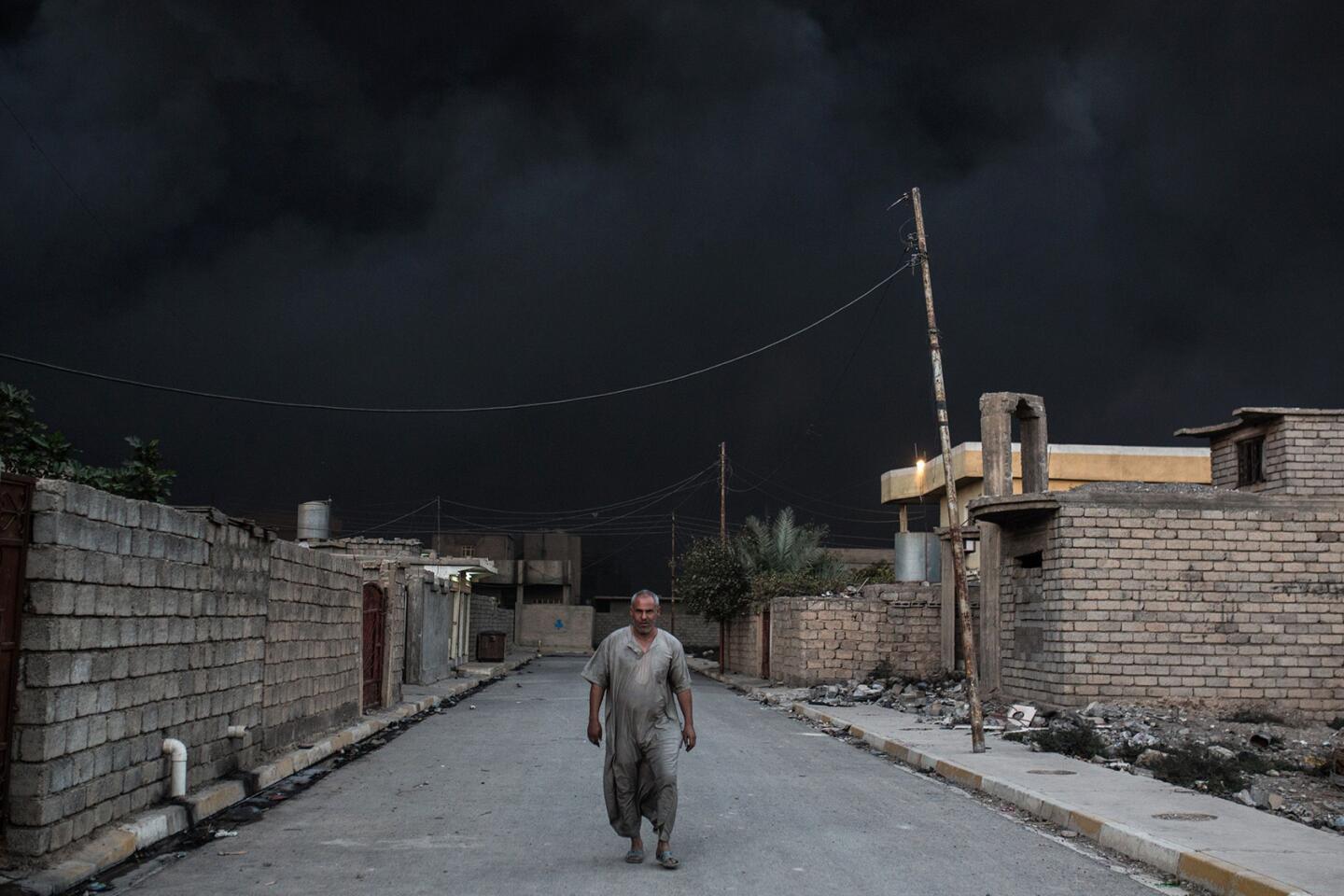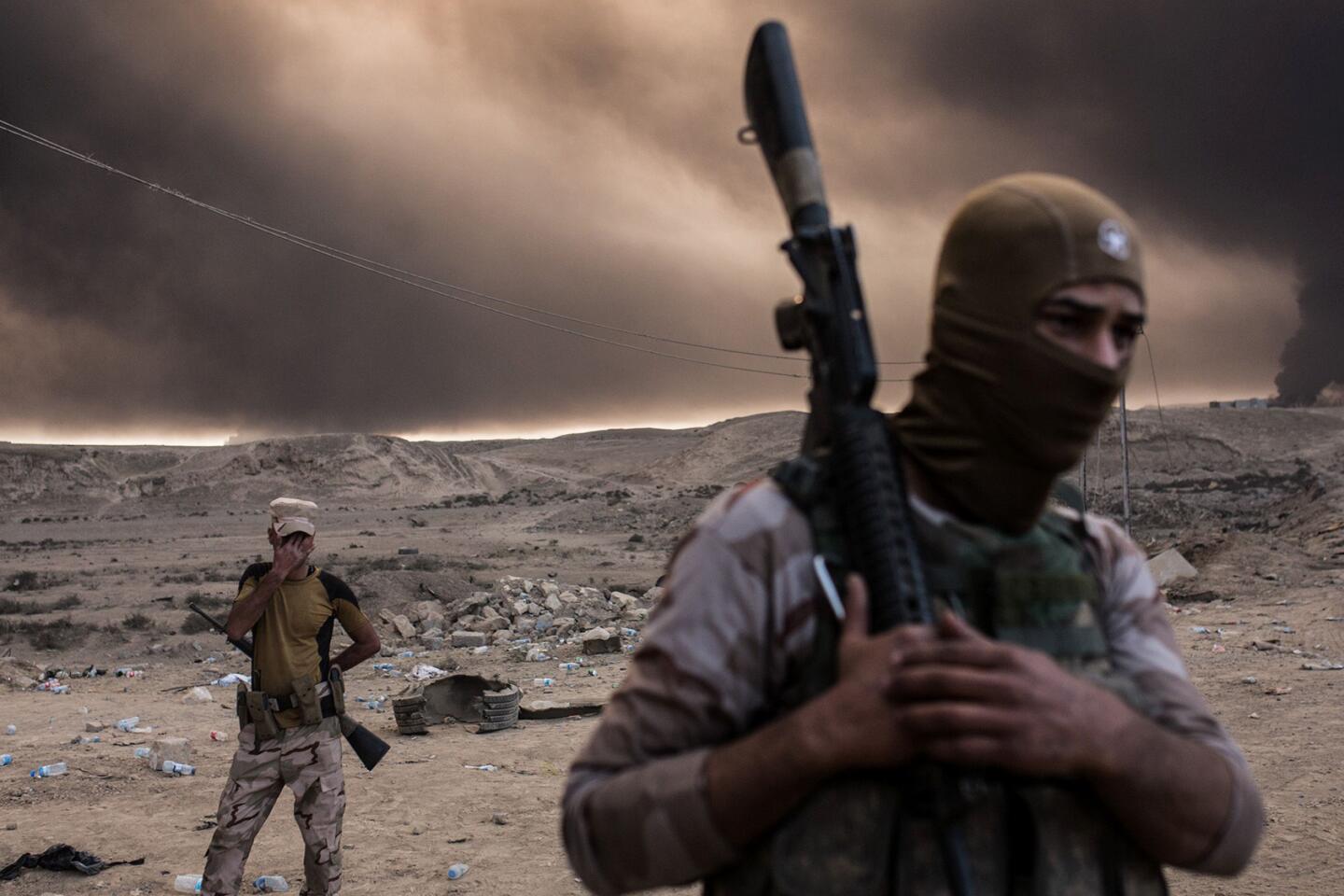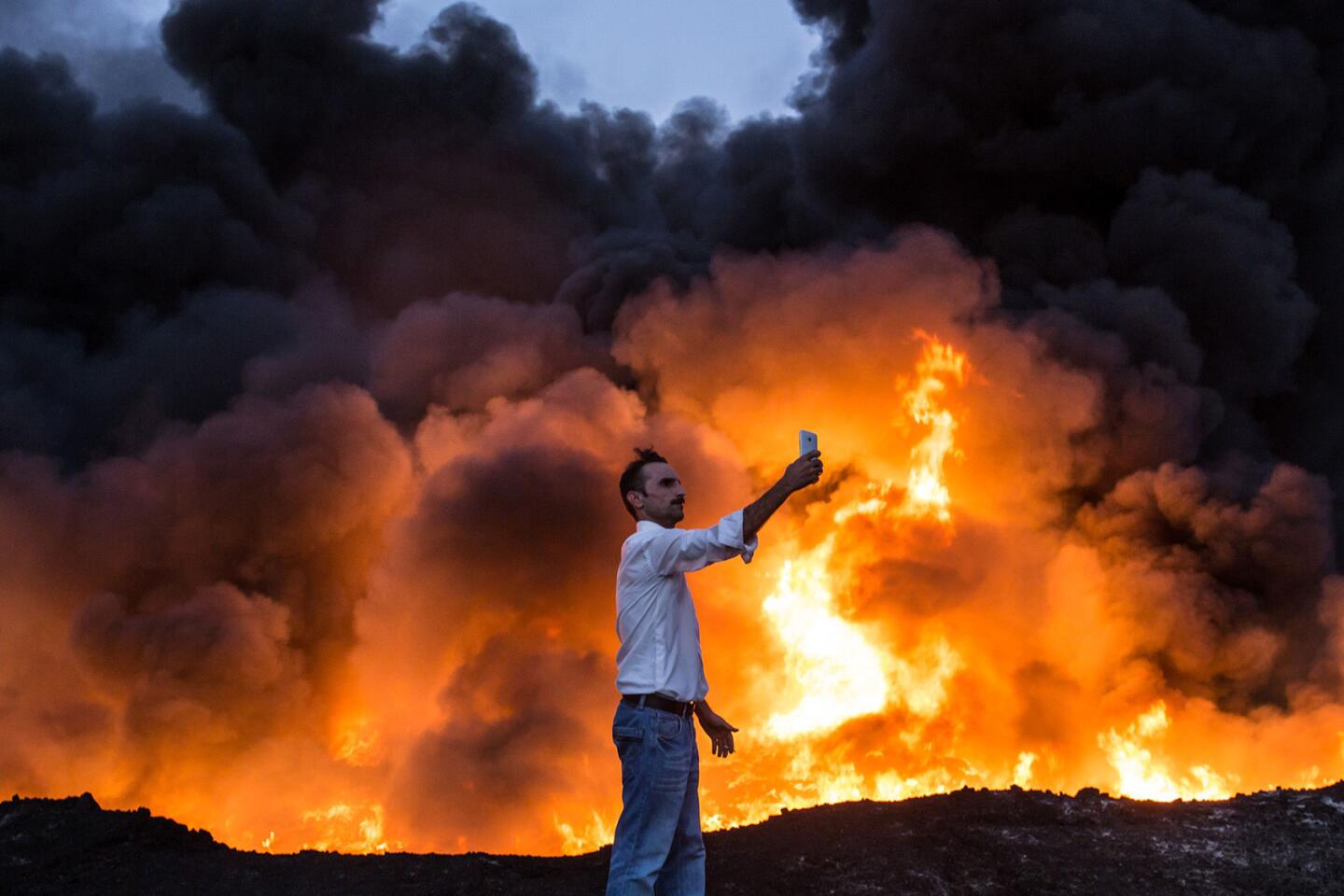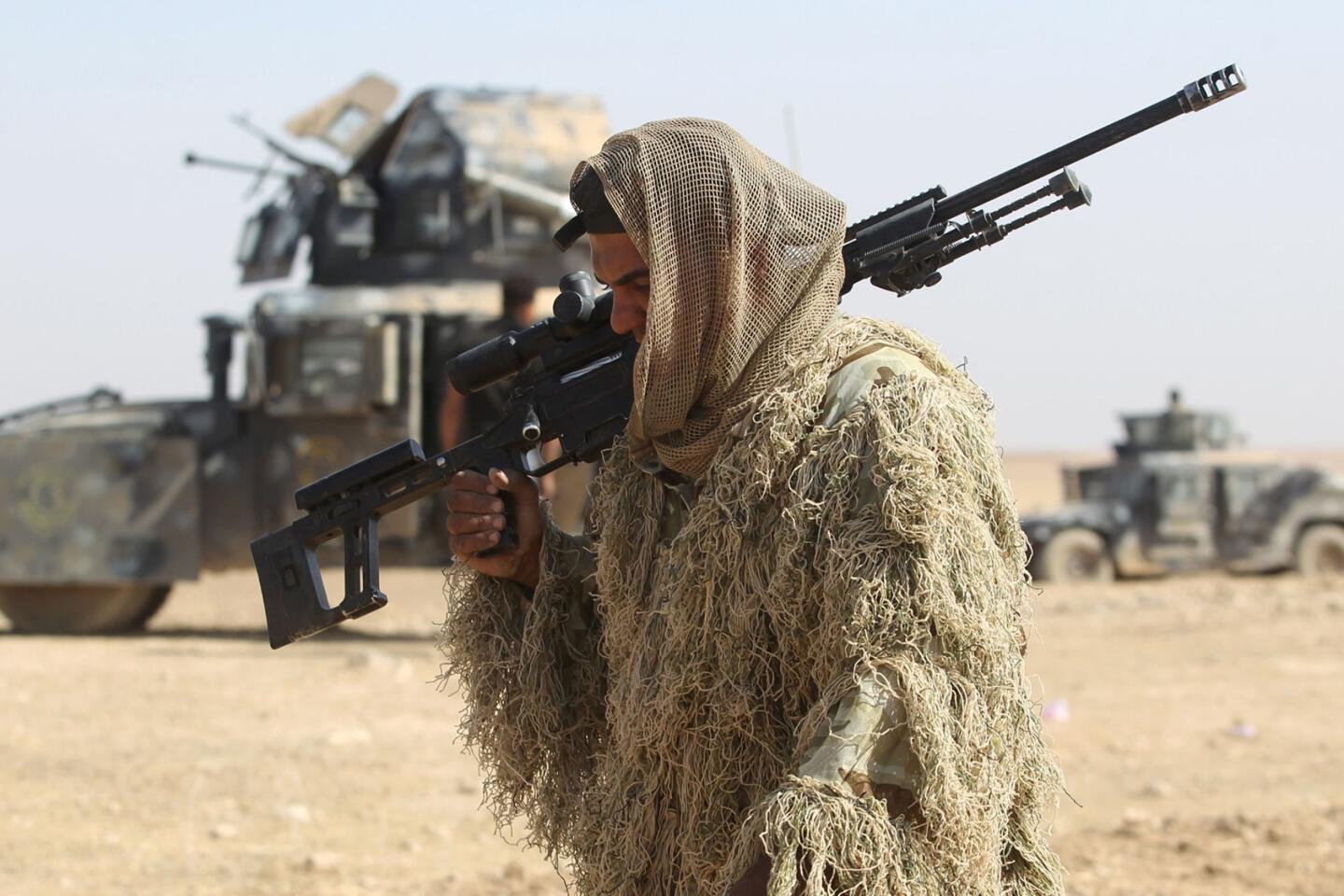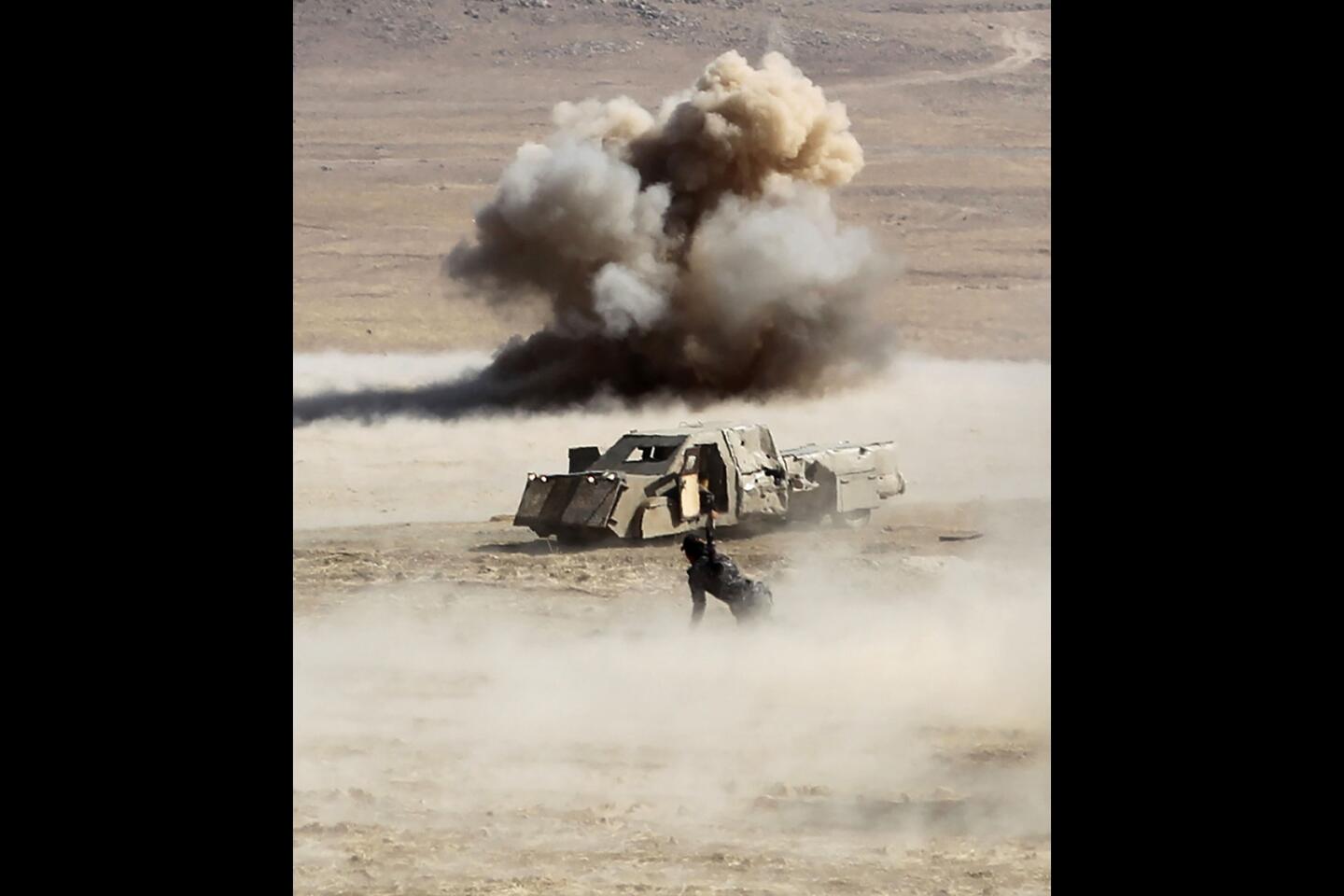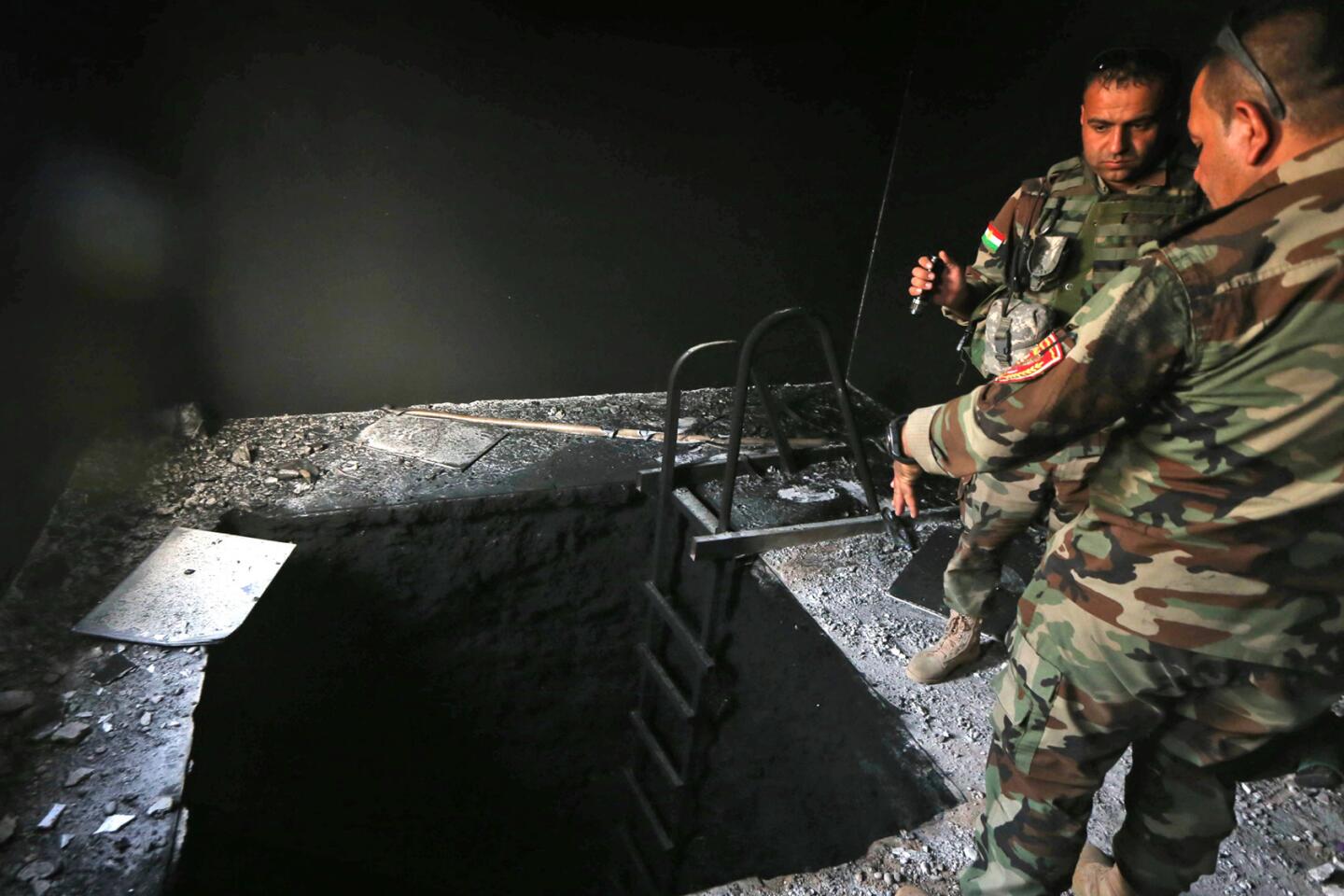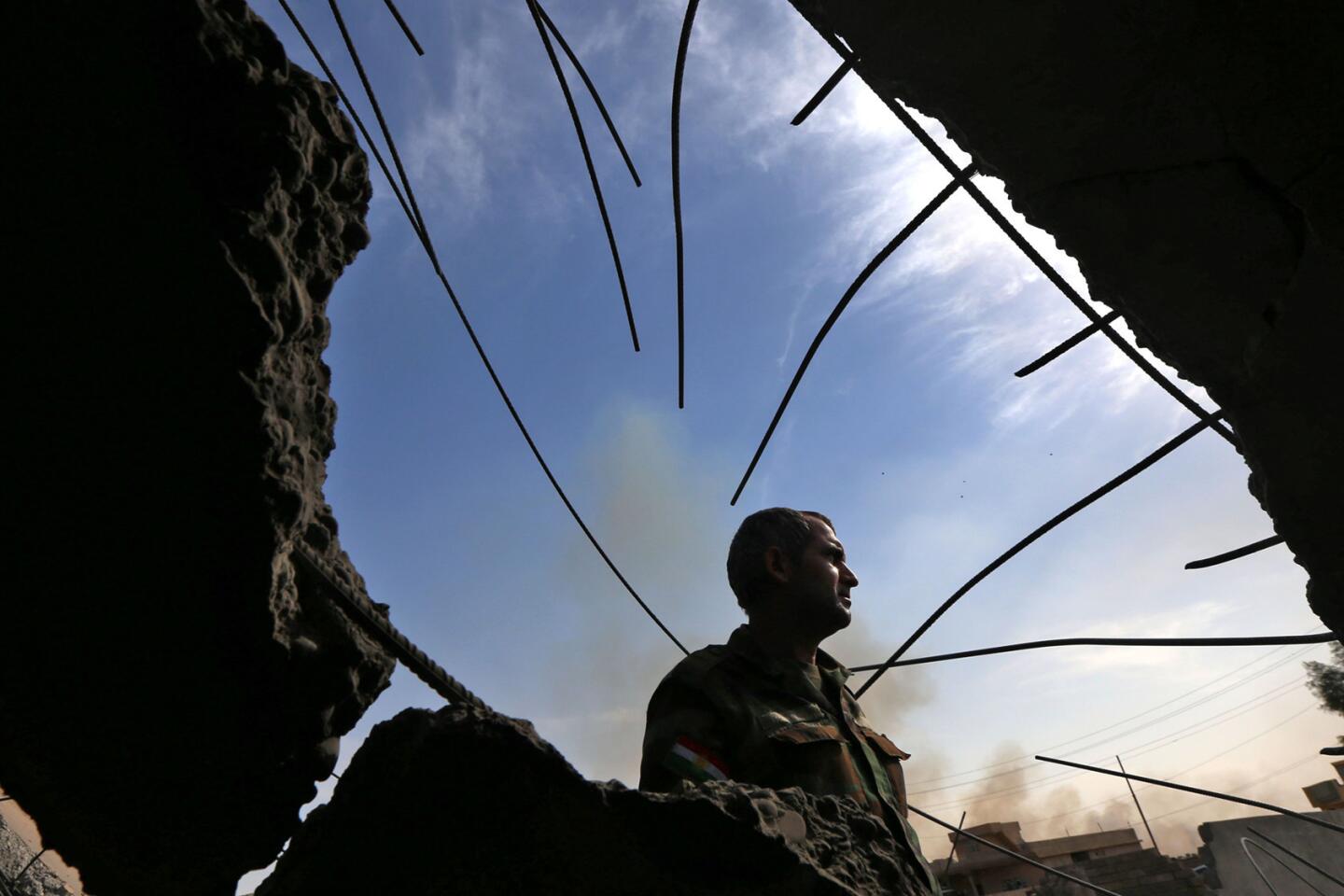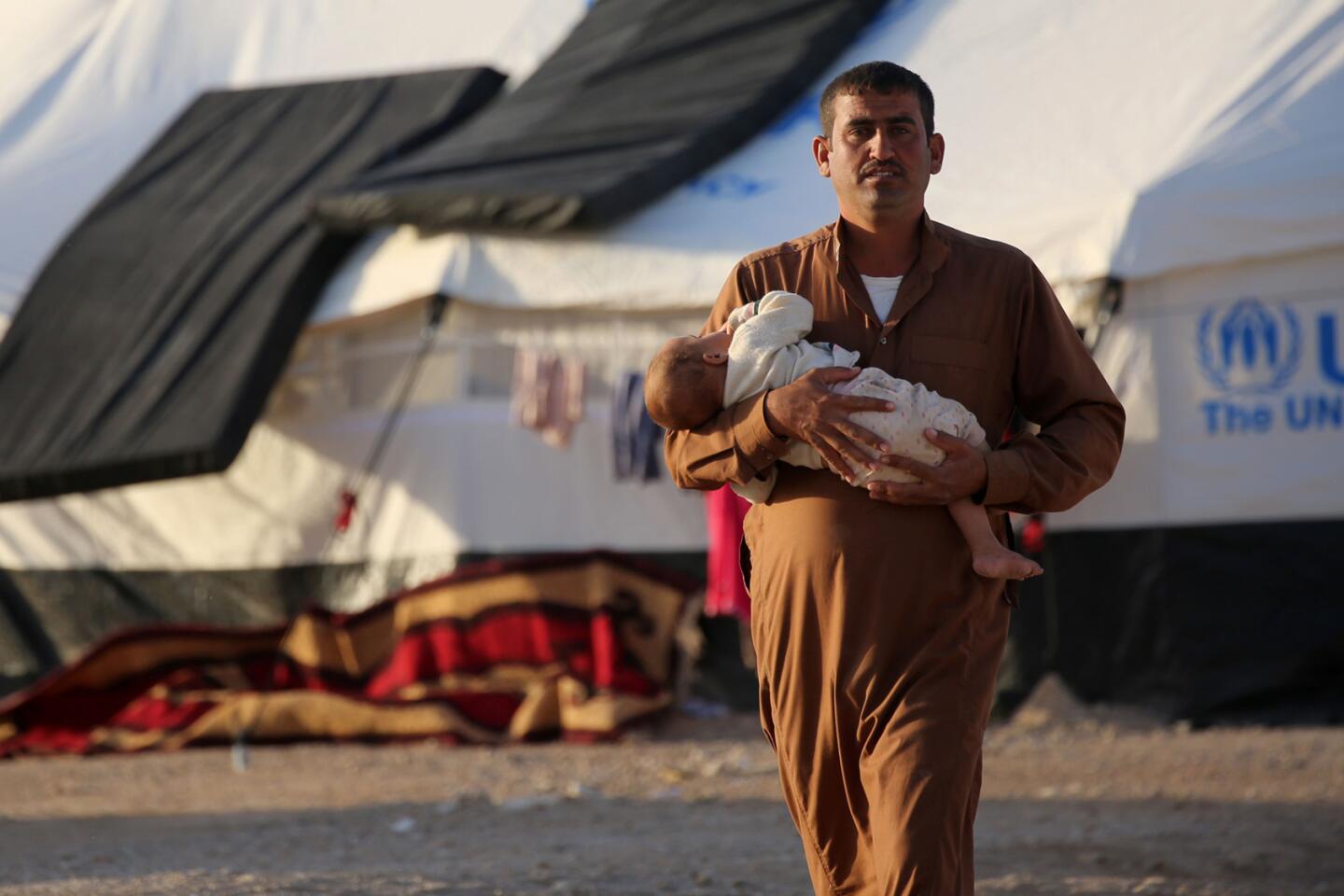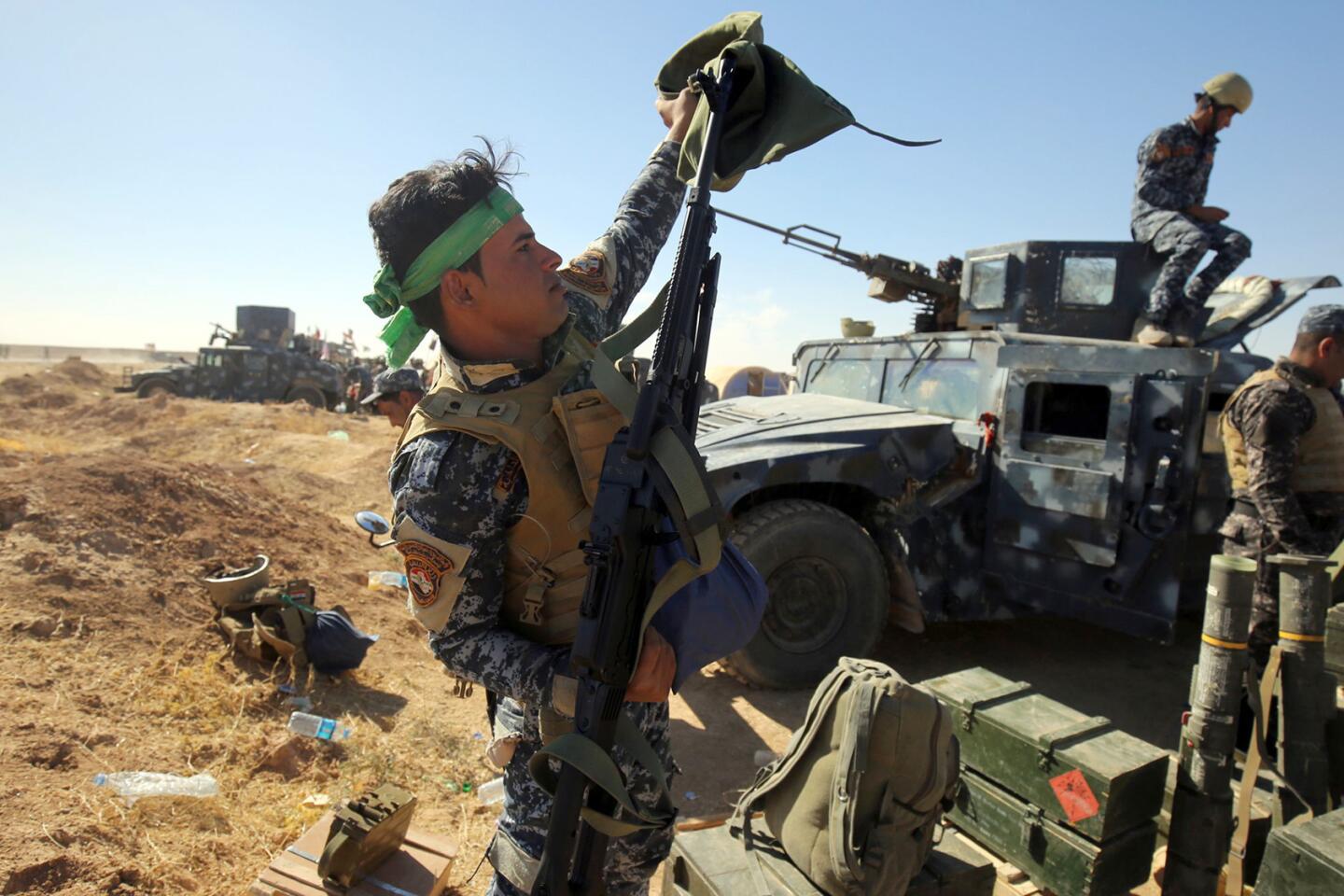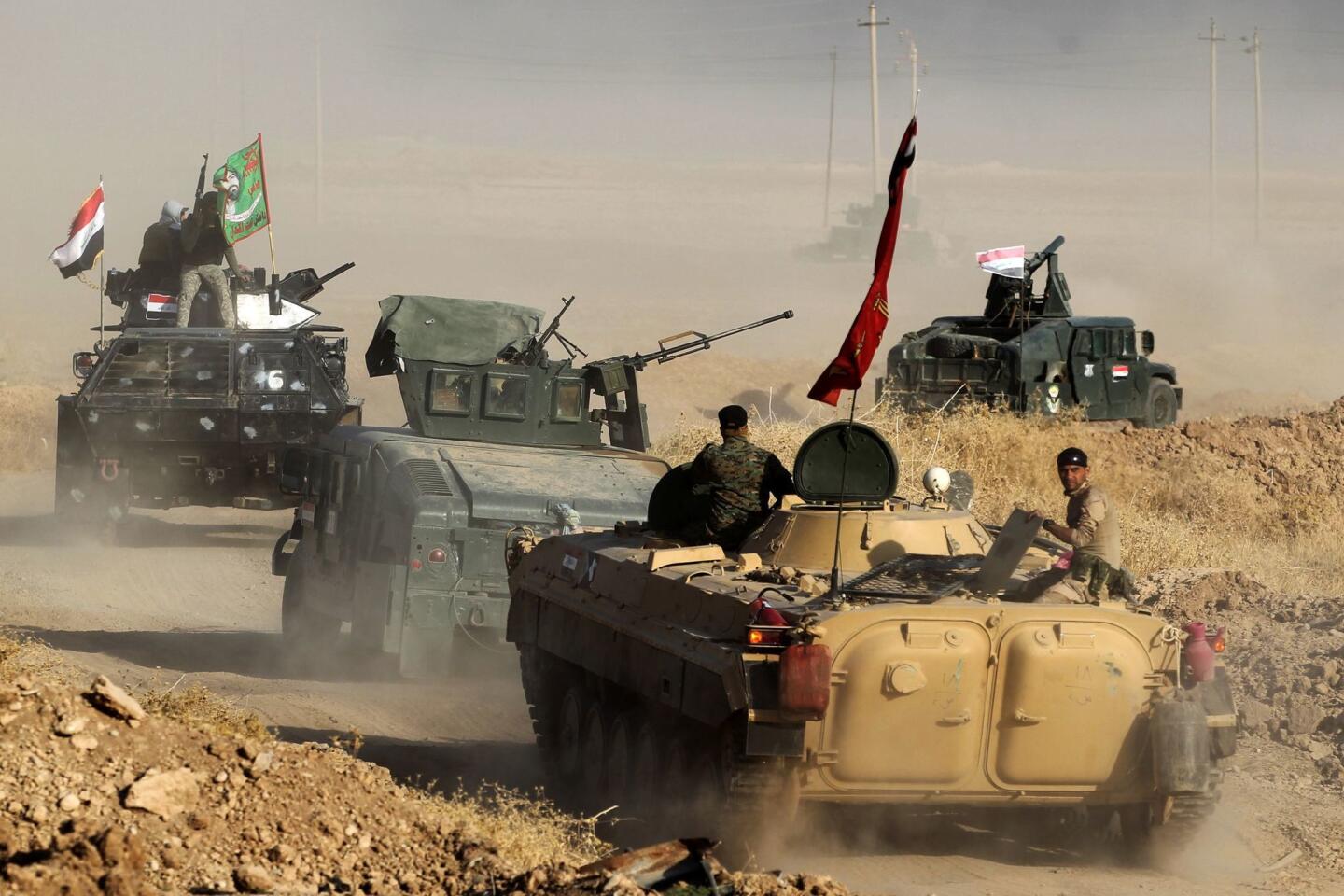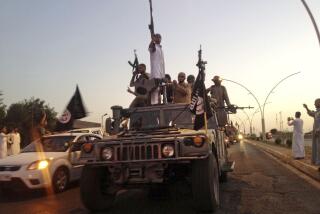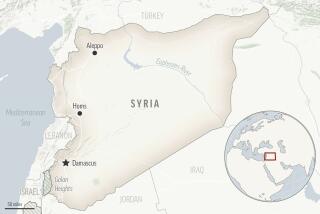The smoke and din of the battle of Mosul have now come within a few miles of the landmark 12th century mosque from which Abu Bakr Baghdadi declared the founding of a modern-day caliphate, ushering in a reign of terror in the ancient city on the plains of Nineveh.
Now, in the fourth week of a U.S.-backed alliance‚Äôs pincer-like move to retake the northern Iraqi city, the whereabouts of the Islamic State chieftain are unknown ‚Äď though a rare audio recording posted online last week by the militant group and attributed to him urged followers to fight to the death.
Baghdadi and his senior lieutenants have been the targets of an intensive manhunt by Iraqi and U.S. forces working from land and air, but experts disagree on how and where Islamic State‚Äôs top leadership might seek to regroup and recoup ‚Äď if they are still present in the city, and if they manage to survive the battle of Mosul.
That‚Äôs a big ‚Äúif‚ÄĚ on both counts. Mosul‚Äôs inner precincts, which attacking forces have yet to penetrate, offered ample hideouts even before Islamic State fighters, during nearly 2¬Ĺ years of occupation, constructed an intricate warren of defenses above and below ground, including tunnels, trenches and secret passageways.
If we knew where he was, he would be killed at once.
— Col. John Dorrian, spokesman for the American-supported operation to retake Mosul
U.S. officials, who in late October disclosed the killing of 35 Islamic State commanders in Mosul over the last three months, say Baghdadi tops the target list.
‚ÄúIf we knew where he was, he would be killed at once,‚ÄĚ Col. John Dorrian, the spokesman for the American-supported operation to retake the city, told reporters last week.
Baghdadi, believed to be 45, is an Islamic scholar who is considered a prime architect of Islamic State’s apocalyptic ideology and its code of systematic and gruesome punishments of so-called infidels in areas under the group’s control.
He was also personally implicated by escaped captive Yazidi teenagers in the sexual torture of Kayla Mueller, the young American hostage who died last year in Islamic State-held Raqqah, the Syrian city that the caliphate calls its capital. It, too, is now under assault, with Kurdish-led Syrian rebels beginning to close in.
In the 31-minute audio address, Baghdadi appeared to paint any setbacks ‚Äď including the possible fall of Mosul to U.S.-backed Iraqi forces -- as part of a larger strategy that would ultimately see Islamic State emerge triumphant. The group‚Äôs ‚Äúgreat jihad,‚ÄĚ he declared, bolsters ‚Äúour conviction that all of this is a prelude to victory.‚ÄĚ
In another signifier of the group‚Äôs long-term goals, the audio ‚Äď whose authenticity has not been formally verified, but which several Western intelligence officials said they believe is likely genuine ‚Äď calls on Islamic State‚Äôs followers outside Iraq and Syria to stage terror attacks against targets in the West, as well as against Saudi Arabia and Turkey.
Turkish forces have joined the fight against Islamic State in next-door Syria and have sought a role in the fight for Mosul.
Baghdadi also directed particular threats at Shiite Muslims, who are considered apostates by the Sunni group and are now aligned in the coalition seeking to wrest the city from Islamic State. While militias drawn from the sect are barred from operations inside Mosul for fear of stoking tensions with the majority Sunni Muslim populace, a leading Shiite militia last week claimed it had gained control of a highway linking Mosul to Raqqah ‚Äď which would have been a potential escape route for leaders trying to flee.
Whether they have already done so is a crucial question.
Fawaz Gerges, a professor at the London School of Economics who has written extensively about Islamic State and monitors jihadist communiques and activity, cited unspecified ‚Äútentative evidence‚ÄĚ that the group‚Äôs top leadership remained entrenched in Mosul, once Iraq‚Äôs second-largest city and Islamic State‚Äôs greatest urban prize.
‚ÄúMosul‚Äôs urban core is very large, with a center 10 miles wide, and Iraq has always been the nerve center, the core‚ÄĚ for the group, he said. ‚ÄúBy contrast, Raqqah is a small city, and very exposed, and under tremendous American scrutiny.‚ÄĚ
But with the Mosul offensive having been telegraphed for many months in advance, other close observers of the group believe senior cadres have likely slipped away and are directing operations from elsewhere. The secretive Baghdadi, who was once a prisoner of U.S. forces, is extremely mindful of operational security and communications that could allow coalition forces to track him.
Few photos of him exist; last week’s audio recording marked the first time in 10 months the Islamic State leader had been heard from. His greatest public exposure was the infamous June 2014 video, during the Muslim holy month of Ramadan, when the black-turbaned Baghdadi took to the pulpit at Mosul’s historic Grand Mosque to proclaim himself the emir, or leader, of the world’s Muslims.
Islamic State has shown itself to be nimble in its forward planning, and the group is likely already at work on ways to reassert itself even as its self-proclaimed caliphate slips away, likely reconstituting itself as a rural-based guerrilla insurgency that also calls on loyalists based in Europe and elsewhere to strike when and where they can in its name.
In the event of Baghdadi‚Äôs death, the group would likely convene a shura council to choose his replacement, said Brookings Institution scholar William McCants, the author of a recently published book on the group, ‚ÄúThe ISIS Apocalypse.‚ÄĚ
‚ÄúThe internal factions are not well known, and it‚Äôs not clear how it will all shake out,‚ÄĚ said McCants, adding that Baghdadi had come to power in what was essentially a rigged election.
1/62
A firefighter works to extinguish an oil well set ablaze by fleeing Islamic State fighters in Qayyarah, Iraq, on Nov. 9.
(Chris McGrath / Getty Images) 2/62
A peshmerga fighter peers through curtains as he and other Kurdish soldiers move into a new house in Bashiqa, Iraq, on Nov. 9.
(Odd Andersen / AFP/Getty Images) 3/62
A peshmerga fighter looks for militants as he and his team move between buildings in Bashiqa.
(Odd Andersen / AFP/Getty Images) 4/62
Iraqi forces react as they watch Donald Trump give a speech after winning the U.S. presidential election. They were taking a rest in the village of Arbid on the southern outskirts of Mosul on Nov. 9 during the operation to retake Mosul from Islamic State.
(Ahmad al-Rubaye / AFP/Getty Images) 5/62
Iraqi police try to pull a body from a mass grave they discovered in the Hamam Alil area on Nov. 7 after they recaptured the area from Islamic State.
(Ahmad al-Rubaye / AFP/Getty Images) 6/62
Kurdish peshmerga soldiers fire artillery at Islamic State positions in Bashiqa, Iraq, on Nov. 7.
(Felipe Dana / Associated Press) 7/62
Iraqi forces patrol the Gogjali district of Mosul a day after it was liberated from Islamic State.
(Carolyn Cole / Los Angeles Times) 8/62
Families flee Gogjali after the area was liberated.
(Carolyn Cole / Los Angeles Times) 9/62
A girl waves a white flag as she and her family leave Gogjali.
(Carolyn Cole / Los Angeles Times) 10/62
Iraqi special forces continue to clear homes in Gogjali on Nov. 2, 2016, after the area was liberated.
(Carolyn Cole / Los Angeles Times) 11/62
Iraqi special forces Lt. Col Ali Hussein Fadil and his men continue to clear the Gogjali district.
(Carolyn Cole / Los Angeles Times) 12/62
Iraqi troops patrol Gogjali.
(Carolyn Cole / Los Angeles Times) 13/62
Iraqi army soldiers warm themselves near the Qayyarah air base, south of Mosul, on Tuesday.
(Felipe Dana / Associated Press) 14/62
Displaced people who fled from Islamic State-held territory sit outside a mosque guarded by Iraqi soldiers in Shuwayrah, south of Mosul, on Tuesday.
(Felipe Dana / Associated Press) 15/62
An Iraqi Counter Terrorism Section member drives a vehicles with a broken windscreen as they advance early in the morning near the village of Bazwaya, on the eastern edges of Mosul, on Monday. (Bulent Kilic / AFP/Getty Images)
16/62
Members of the Iraqi counter-terrorism service drive near the village of Bazwaya, on the eastern edges of Mosul, tightening the noose as the offensive to retake the Islamic State group stronghold entered its third week on Sunday.
(Bulent Kilic / AFP/Getty Images) 17/62
Members of the Iraqi Counter Terrorism Service take shelter after a mortar shell hit nearby near the village of Bazwaya, on the eastern edges of Mosul, as they advance towards Iraq’s last remaining Islamic State stronghold on Monday.
(Bulent Kilic / AFP/Getty Images) 18/62
A member of the Iraqi Counter Terrorism Section grimaces in pain as he receives medical treatment after clashes on Monday with Islamic State militants near the village of Bazwaya, on the eastern edge of Mosul.
(Bulent Kilic / AFP/Getty Images) 19/62
Iraqi counterterrorism members carry an injured comrade during clashes with the Islamic State near Bazwaya on Monday. Iraqi forces took control of the village near Mosul. (Bulent Kilic / AFP/Getty Images)
20/62
Children playfully pose for a photo as smoke rises from burning oil fields in Qayara, some 50 kilometers south of Mosul, Iraq, Monday, Oct. 31, 2016. (Felipe Dana / AP)
21/62
A militia fighter prepares to go into battle with his phone and bullets.
(Carolyn Cole / Los Angeles Times) 22/62
Popular mobilization units are helping to clear villages southwest of Mosul, Iraq. On Sunday, they launched mortar rounds a little more than a mile from Islamic State fighters who continued to resist their advance on the city.
(Carolyn Cole / Los Angeles Times) 23/62
Militiamen chant before going into battle alongside Iraqi army forces as they fight against Islamic State near Mosul.
(Carolyn Cole / Los Angeles Times) 24/62
Militiamen near the village of Zarqa stand by as mortars are launched at Islamic State fighters near Mosul.
(Carolyn Cole / Los Angeles Times) 25/62
The popular mobilization units received the Iraqi government’s blessing to join the battle that could break Islamic State’s grip in the country.
(Carolyn Cole / Los Angeles Times) 26/62
Militias known as popular mobilization units fighting near Mosul are made up mostly of Shiite Muslims.
(Carolyn Cole / Los Angeles Times) 27/62
In the village of Faziliya, recently liberated from Islamic State, Abdul Gafur, 38, embraces his brother Mohammad Abdul Gafur, 40. The two had not seen each other since Islamic State forces took control of the village more than two years ealier.
(Carolyn Cole / Los Angeles Times) 28/62
Business is brisk at the barbershops in Faziliya after Kurdish forces retook control from Islamic State militants. A bodyguard stands by.
(Carolyn Cole / Los Angeles Times) 29/62
Peshmerga, or Kurdish fighters, rest after a recent battle.
(Carolyn Cole / Los Angeles Times) 30/62
The remains of a bomb factory can be seen in the village of Faziliya, recently liberated from Islamic State control.
(Carolyn Cole / Los Angeles Times) 31/62
A member of the Iraqi armed forces kisses a local boy after Iraqi forces entered the town of Shura, 30 kilometers south of Mosul, Iraq. Iraqi troops approaching Mosul from the south advanced into Shura on Saturday after a wave of U.S.-led airstrikes and artillery shelling against Islamic State positions inside the town.
(Marko Drobnjakovic / AP) 32/62
Iraqi families, who already had been displaced by the ongoing operation by Iraqi forces against jihadists of the Islamic State group, flee Mosul. Iraqi paramilitary forces launched an operation to cut the Islamic State group’s supply lines between its Mosul bastion and neighboring Syria.
(Bulent Kilic / AFP/Getty Images) 33/62
Walid Abdel Nabih, 28, from Nasiriya and a father of four, moves through passageways created by Islamic State to prevent detection by drones. On the eastern front in the fight for Mosul, an Iraqi special forces unit waits for next phase of the fight to clear Islamic State operatives from Mosul.
(Carolyn Cole / Los Angeles Times) 34/62
An Iraqi special forces member rides in the turret of a humvee with a Shiite religious banner flying behind him as he patrols Bartella, Iraq.
(Carolyn Cole / Los Angeles Times) 35/62
As many Iraqis are returning home, others are fleeing the fighting in villages surrounding Mosul. At Camp JJadh, 3,000 people arrived in the past week, but many more are expected as the battle for Mosul continues. New arrivals line up for food, provide by the World Food Program.
(Carolyn Cole / Los Angeles Times) 36/62
Children play in a dismantled car in the village of Hurriya, where fighting between Islamic State and Iraqi forces has caused many families to leave over the past months. The risk of unexploded weapons is still a concern for many in the area.
(Carolyn Cole / Los Angeles Times) 37/62
Soldiers drive through the town of Qayyarah, heavily damaged in the fighting in August and again this past week as Islamic State was driven out of town.
(Carolyn Cole / Los Angeles Times) 38/62
Sienna Moqtar and her daughter decorate her brother’s grave with rocks. He died last week in the final days of Islamic State in Qayyarah. The bodies of two infant nephews are buried at the right.
(Carolyn Cole / Los Angeles Times) 39/62
Ibrahim Atea Ahmed, left and Daham Ahmed survived the Islamic State attack, but their town was left in bad shape. Oil fires continue to burn, set by militants as a cover from air attacks.
(Carolyn Cole / Los Angeles Times) 40/62
Residents wait for food and water to be handed out, but very little was distributed. The water is not fit to drink in the town.
(Carolyn Cole / Los Angeles Times) 41/62
Iraqi soldiers head for the front line.
(Carolyn Cole / Los Angeles Times) 42/62
An Iraqi fighter takes a position on top of a vehicle as smoke rises on the outskirts of the Qayyarah area, 35 miles south of Mosul, during an operation against Islamic State.
(BULENT KILIC / AFP/Getty Images) 43/62
Smoke billows from an area near the Iraqi town of Nawaran, northeast of Mosul, as Iraqi Kurdish Peshmerga fighters march down a dirt road during the ongoing operation to retake the city from Islamic State.
(SAFIN HAMED / AFP/Getty Images) 44/62
Iraq’s elite counterterrorism forces raise an Iraqi flag after retaking Bartella, outside Mosul, Iraq.
(Khalid Mohammed / Associated Press) 45/62
Iraq’s elite counterterrorism forces raise an Iraqi flag after retaking Bartella, outside Mosul, Iraq.
(Khalid Mohammed / Associated Press) 46/62
The commander of Iraq Special Forces Lt. Gen Abdul Ghani al-Asadi during an interview on the Bartila front line, after the city was liberated from Islamic State militants.
(AHMED JALIL / EPA) 47/62
Iraqi Special Forces take up position in Bartila front line, after the city was liberated from Islamic State militants.
(AHMED JALIL / EPA) 48/62
Iraqi soldiers ride in a truck advancing through the desert on the banks of the Tigris River toward the Islamic State stronghold of Mosul.
(Ahmad al-Rubaye / AFP/Getty Images) 49/62
Iraqi Kurdish Peshmerga fighters fire rockets from a mobile launcher near the town of Bashiqa, about 25 kilometers northeast of Mosul, on Oct. 20, 2016.
(Safid Hamed / AFP/Getty Images) 50/62
A member of Iraq’s elite counterterrorism forces advances with his unit toward the city of Mosul, on Oct. 20, 2016.
(Khalid Mohammed / Associated Press) 51/62
A villager walks on a bare street as smoke from oil fires nearby turn the sky black in the Qayyarah area, about 60 kilometers south of Mosul, on Oct. 19, 2016.
(Yasin Akgul / AFP/Getty Images) 52/62
Iraqi soldiers look on as smoke rises from the Qayyarah area south of Mosul on Oct. 19, 2016, as Iraqi forces take part in an operation against Islamic State to retake Mosul.
(YASIN AKGUL / AFP/Getty Images) 53/62
A man takes a selfie in front of a fire from oil that has been set ablaze in the Qayyarah area south of Mosul on Oct. 19, 2016, during an operation by Iraqi forces against Islamic State to retake Mosul.
(YASIN AKGUL / AFP/Getty Images) 54/62
An Iraqi sniper wearing his camouflage in the village of Bajwaniyah village, about 30 kilometers south of Mosul, on Oct. 18, 2016.
(Ahmad al-Rubaye / AFP/Getty Images) 55/62
Smoke rises from an explosion as Iraqi forces retake the village of Bajwaniyah from Islamic State on their way to Mosul.
(Ahmad al-Rubaye / AFP/Getty Images) 56/62
Iraqi soldiers inspect a tunnel in a building in the recaptured village of Shaquoli, about 35 kilometers east of Mosul, on Oct. 18, 2016.
(Safin Hamed / AFP/Getty Images) 57/62
An Iraqi Kurdish Peshmerga fighter stands amid the rubble of a destroyed building on Oct. 18, 2016, in the village of Shaqouli, east of Mosul, after it was recaptured from the Islamic State group.
(Safin Hamed / AFP/Getty Images) 58/62
A man carries a baby at a refugee camp in Syria’s Hasakeh province for Iraqi families who fled fighting in the Mosul area on Oct. 17, 2016.
(Delil Souleiman / AFP/Getty Images) 59/62
Lt. Col. Ali Hussein, right, addresses Iraqi security forces leading a government offensive that began Monday to oust Islamic State from the city of Mosul, the extremist group’s last major stronghold in Iraq.
(Molly Hennessy-Fiske / Los Angeles Times) 60/62
An Iraqi police officer inspects his weapon at the Qayyarah military base, about 60 kilometers south of Mosul, on Oct. 16, 2016, amid preparations for the offensive to retake the city from Islamic State.
(Ahmad Rubaye / AFP/Getty Images) 61/62
Iraqi forces head north toward Mosul on Monday, part of the operation to retake the city from Islamic State.
(Ahmad al-Rubaye / AFP/Getty Images) 62/62
Iraqi Kurdish Peshmerga fighters fire a mortar shell from Mount Zardak.
(Safin Hamed / AFP/Getty Images) ‚ÄúYou‚Äôd have that kind of scheming this time around,‚ÄĚ he said. ‚ÄúThere is probably an heir apparent, but it‚Äôs not clear who it would be.‚ÄĚ
Even if Baghdadi is hunted down and eliminated, the group could probably go on without him, experts say, as it has following the previous losses of major figures.
‚ÄúTogether with the loss of territory and the decline in the number of foreign fighters coming to Iraq, it would certainly be a blow to the narrative if Baghdadi, for example, were to be killed,‚ÄĚ said Seth Jones of the RAND Corp. But Islamic State‚Äôs predecessor organization demonstrated a remarkable degree of resiliency a decade ago, he said.
‚ÄúThey‚Äôve rebounded from serious losses,‚ÄĚ said Jones, who is the director of RAND‚Äôs International Security and Defense Policy Center.
Perhaps more important, the larger backdrop against which the group has thrived remains largely unchanged ‚Äď including longstanding political grievances among Sunni Arabs in Iraq and Syria, deep mistrust of the institutions of Iraqi government and vicious sectarian infighting, Jones and others said.
In any event, the immediate prognosis is grim for civilians in Mosul and elsewhere who are unfortunate enough to find themselves anywhere in the orbit of the group’s leadership, where they can be used as human shields or diversions to draw coalition attackers’ attentions elsewhere.
‚ÄúThe question is how many thousands of civilians are going to be killed,‚ÄĚ said analyst Gerges. ‚ÄúWhen you have a critical [Islamic State] mass, entrenched in a big city for 2¬Ĺ years, the capacity for killing is massive ‚Äď I‚Äôm very, very alarmed.‚ÄĚ
[email protected]
@laurakingLAT
ALSO
Islamic State is under double-barrel siege in Mosul and now in Raqqah
Visions of hell: Another day in Aleppo, ancient city under siege
Smiling children, open graves: Scenes from the battle for Mosul
